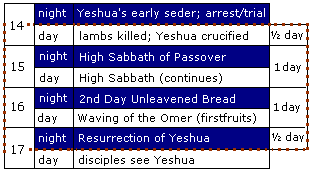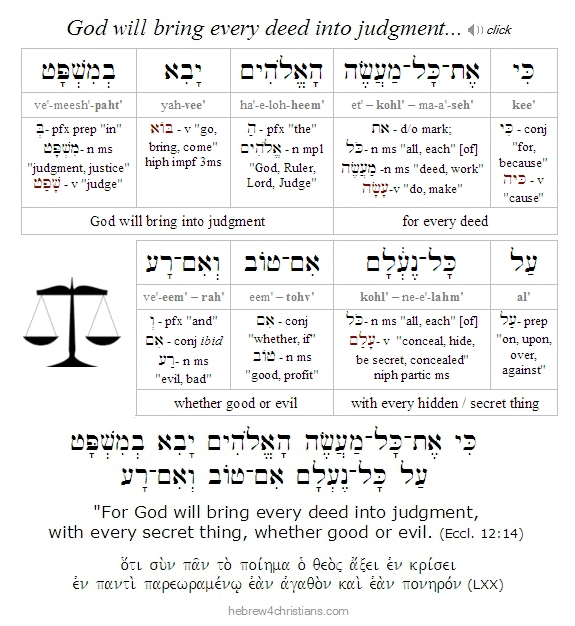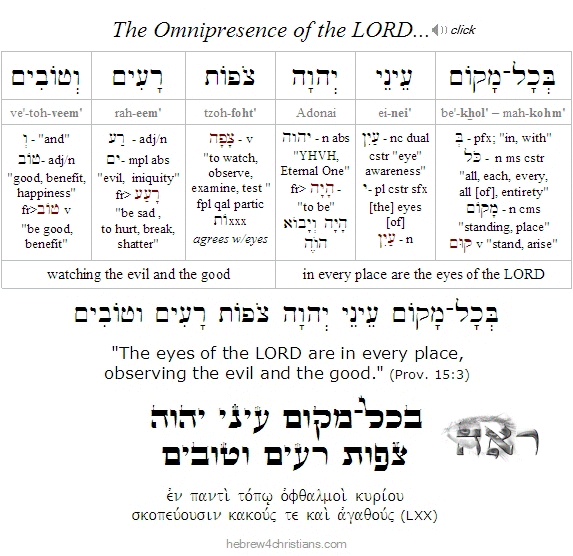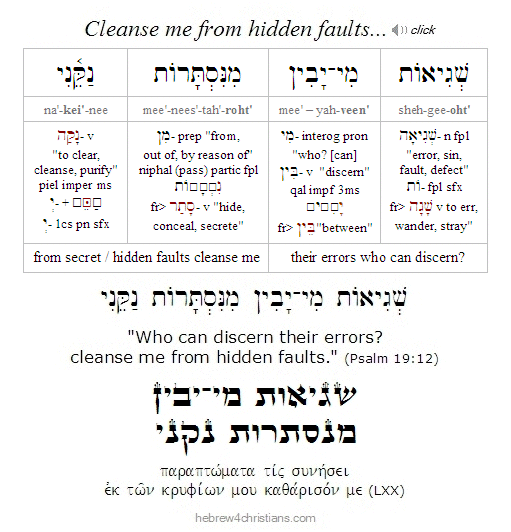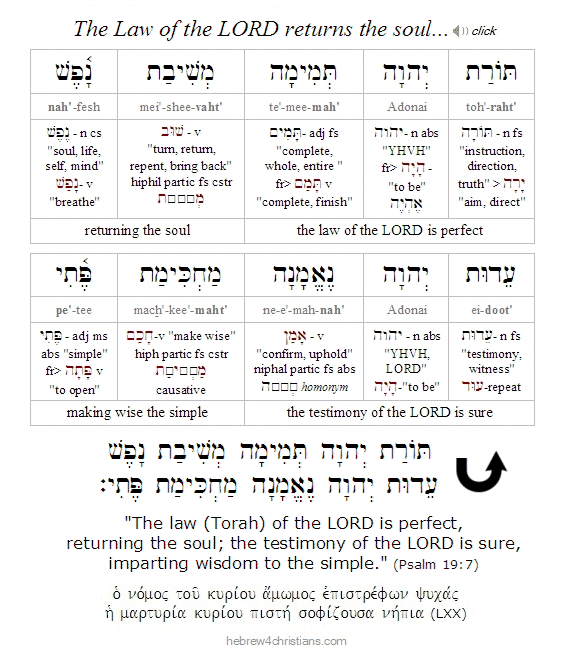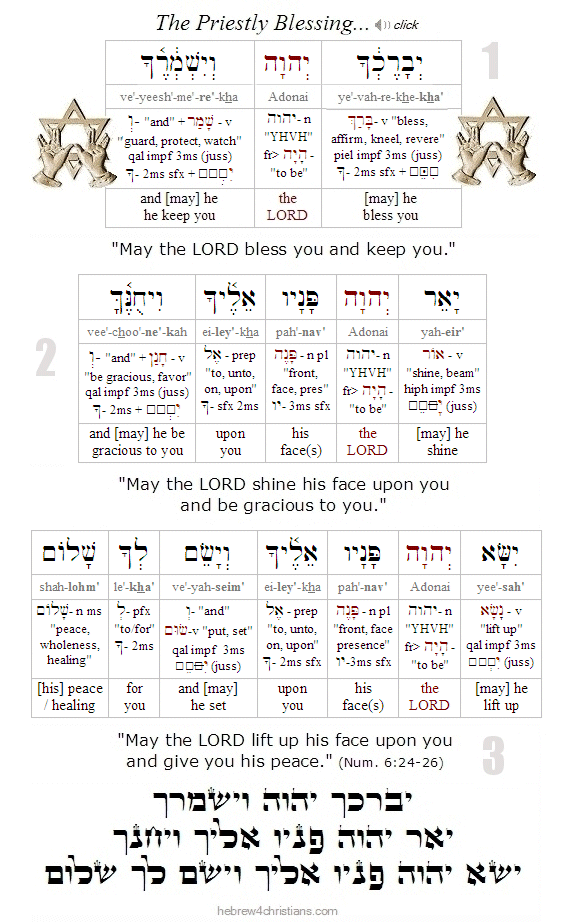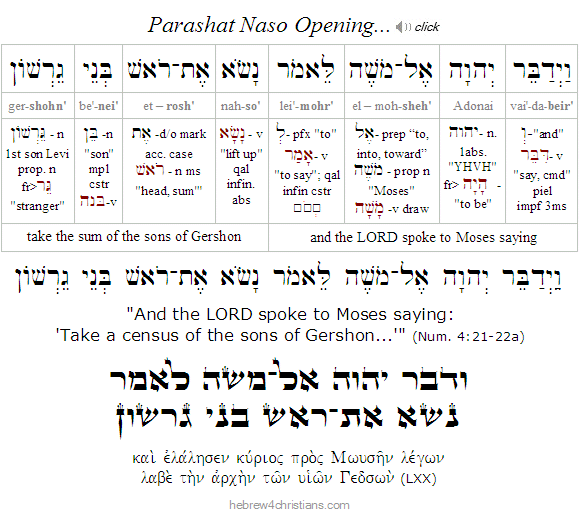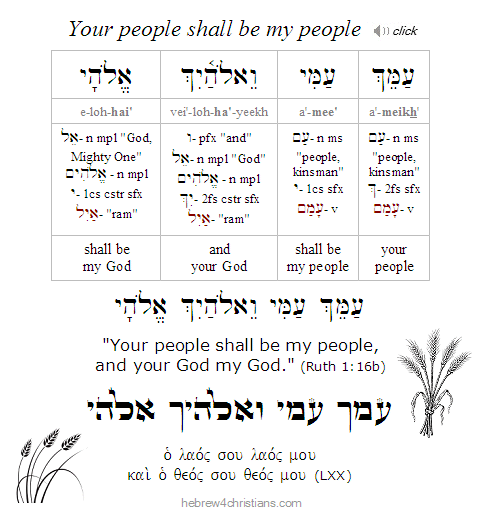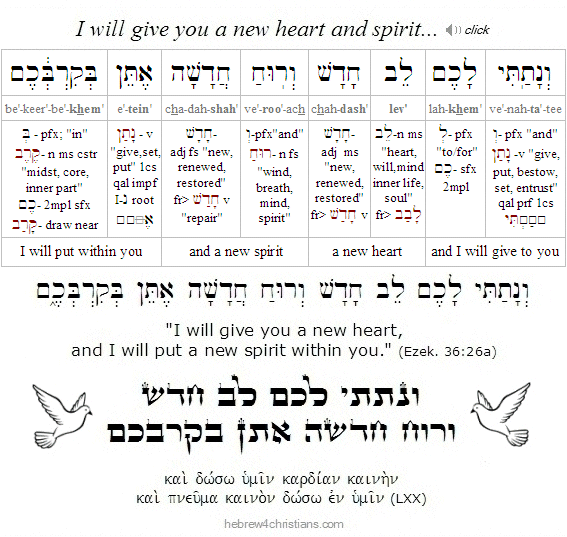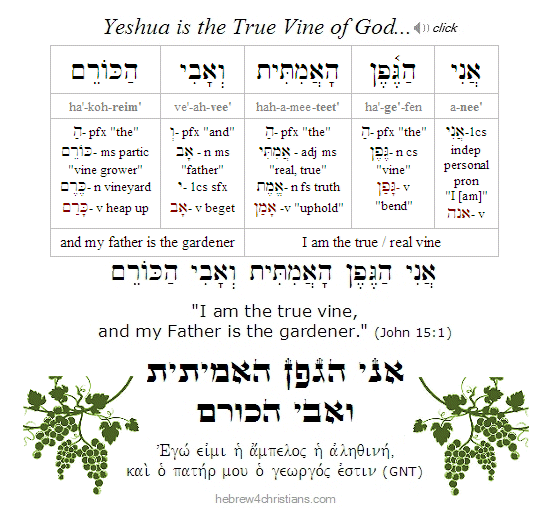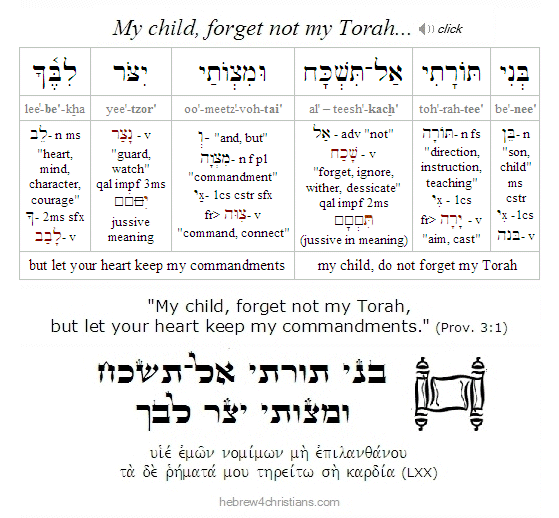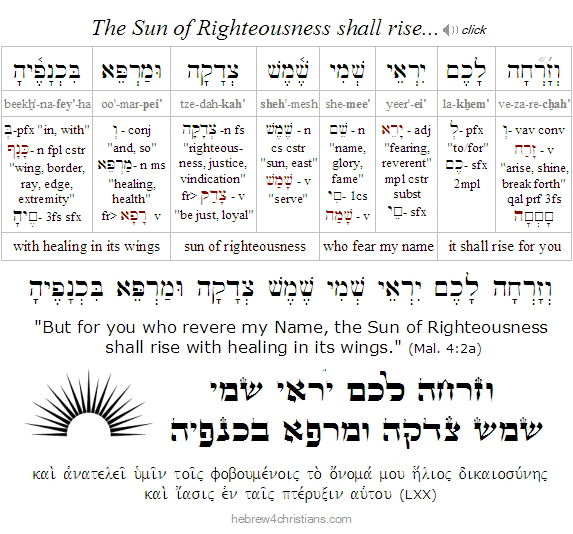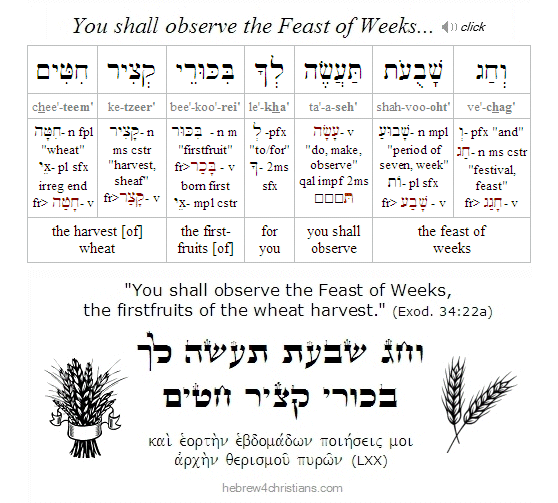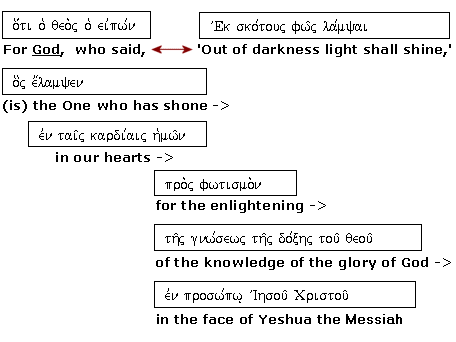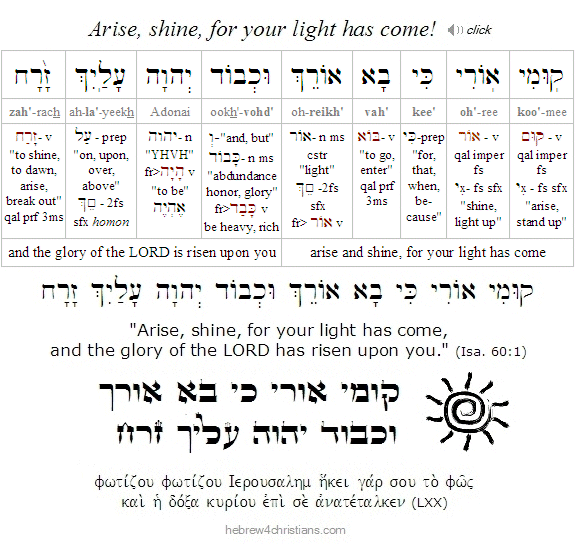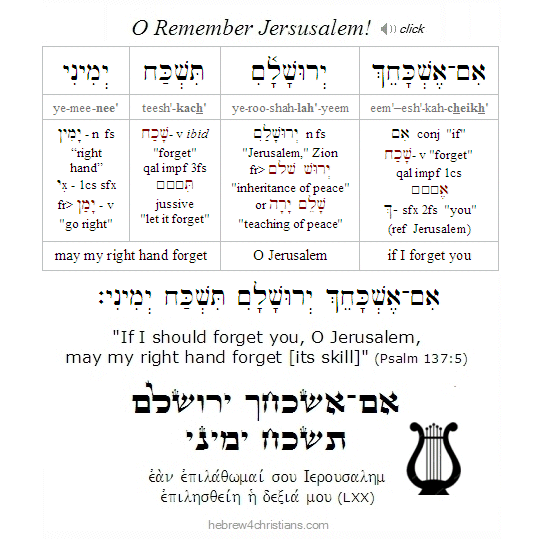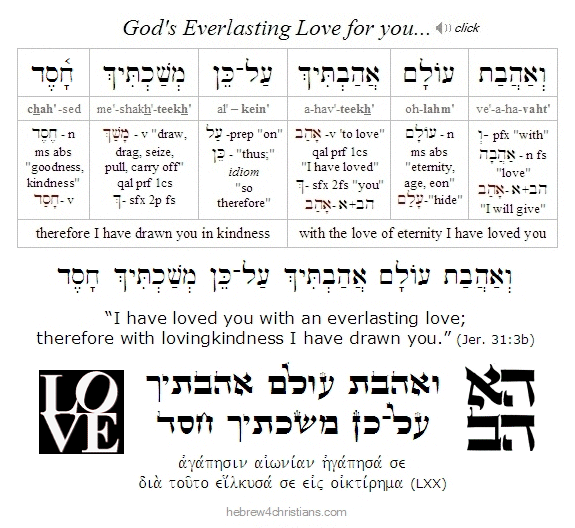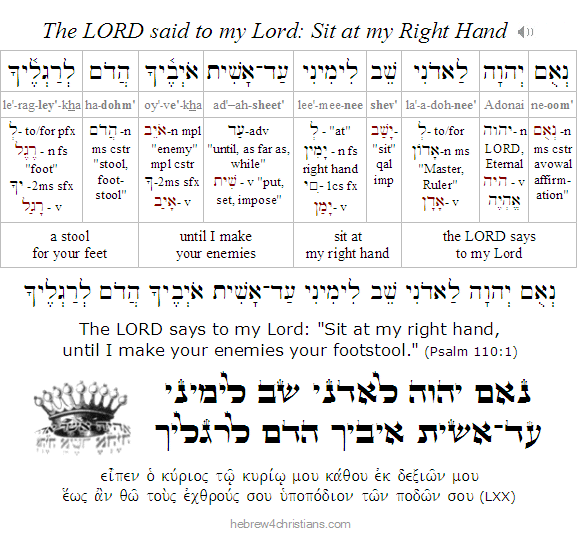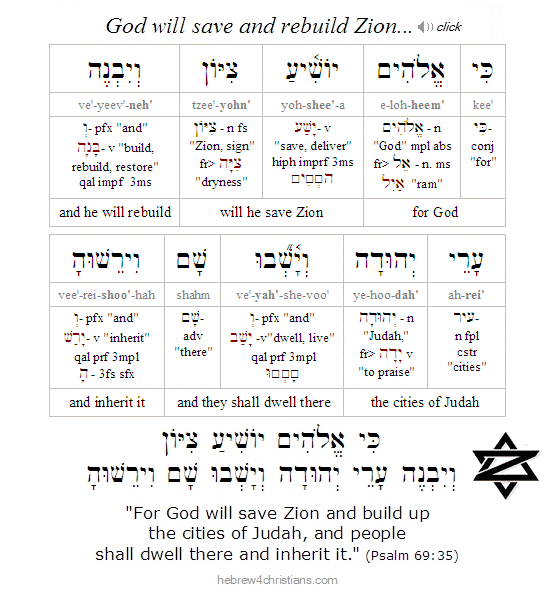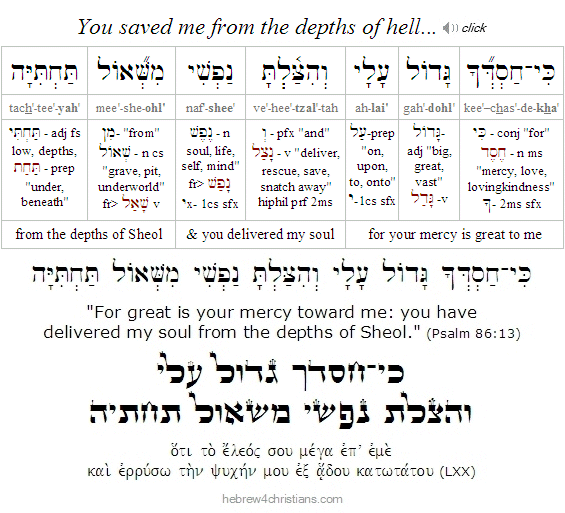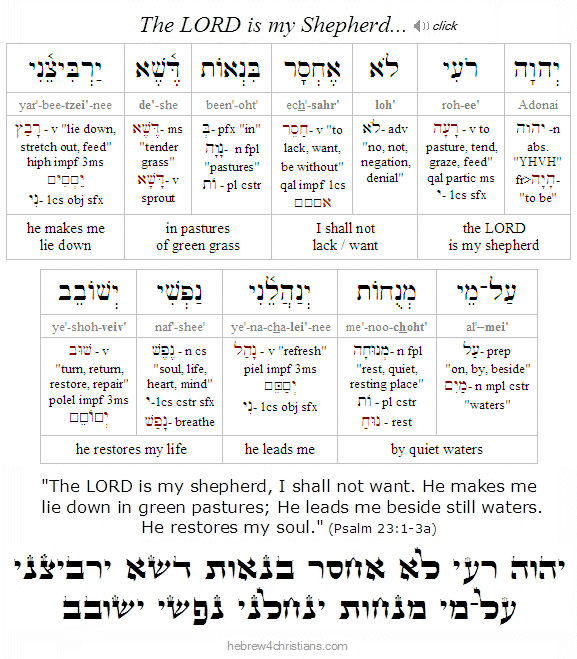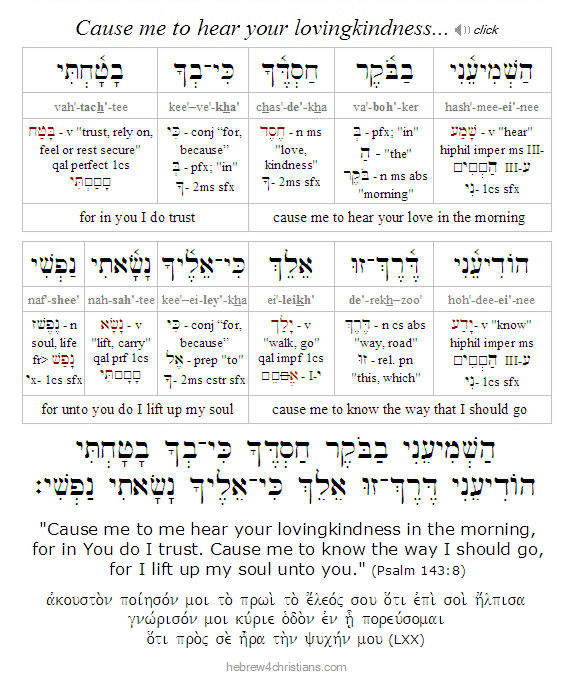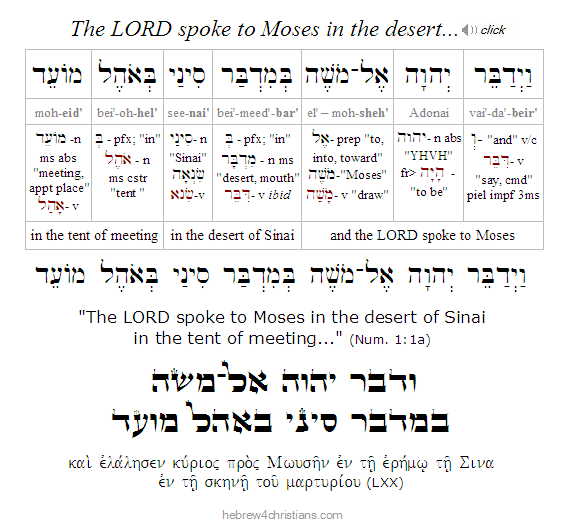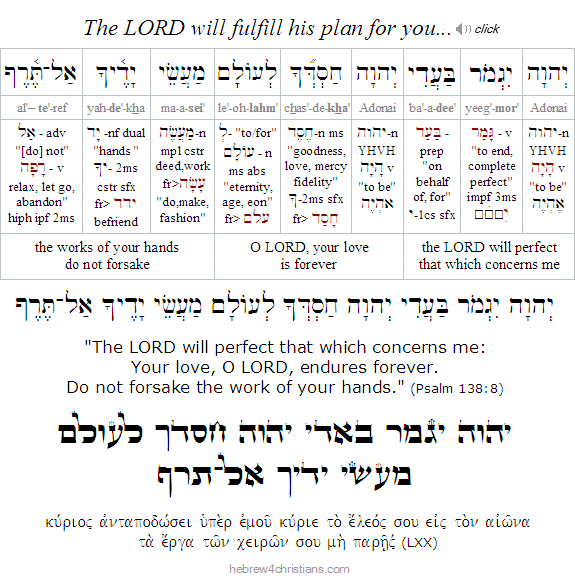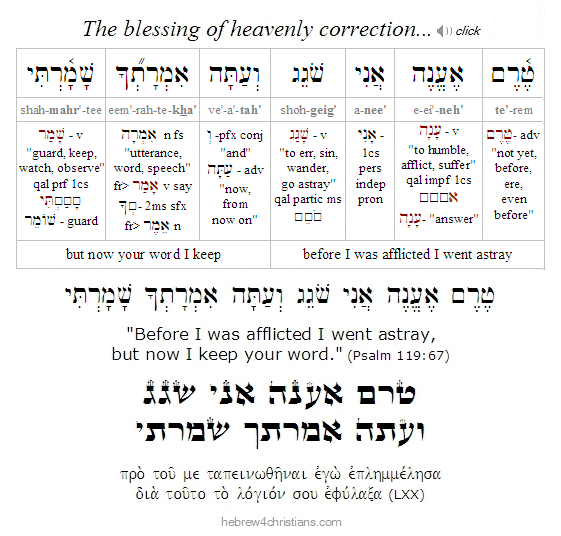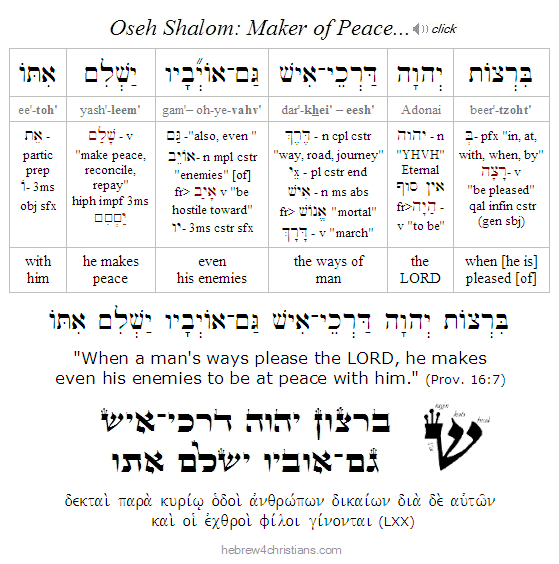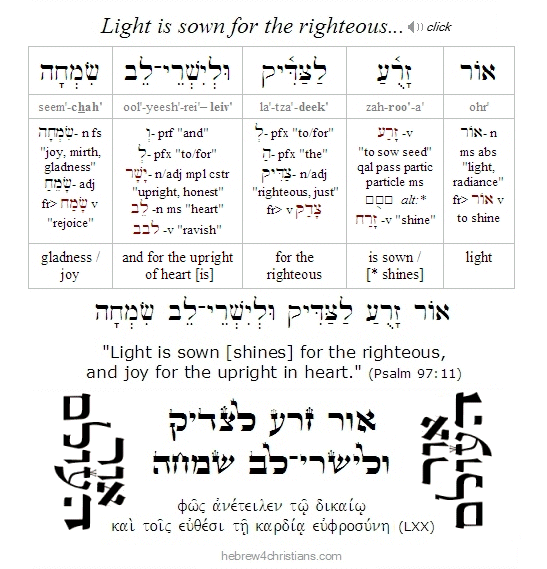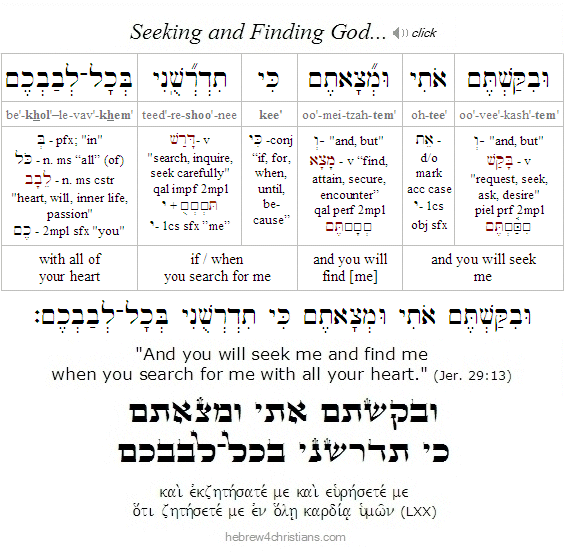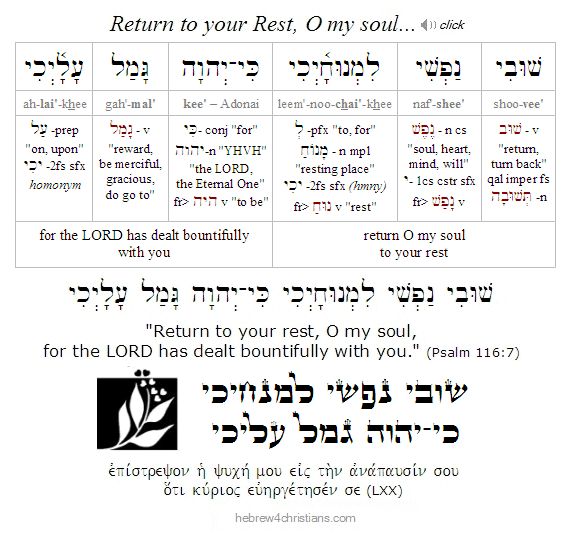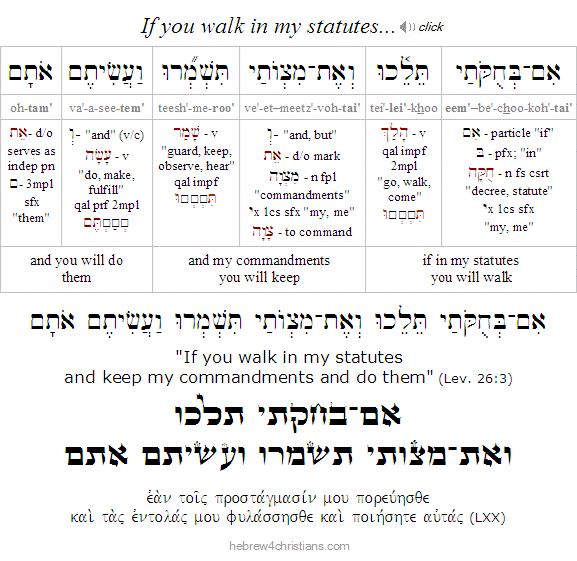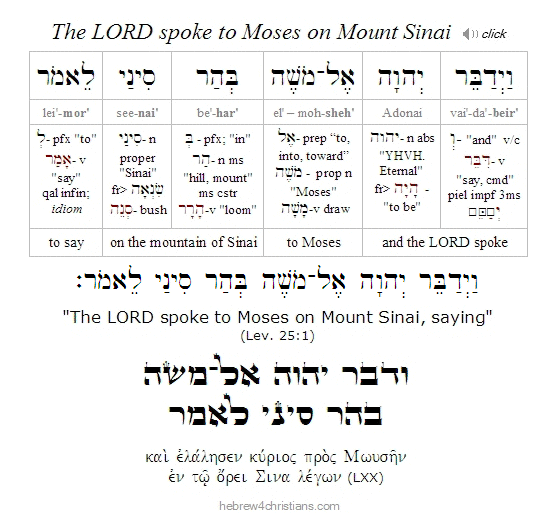|
Jewish Holiday Calendar
For May 2023 site updates, please scroll past this entry....
The Torah divides the calendar into two symmetrical halves: the Spring and the Fall, indicating the two advents of Messiah. The Biblical year officially begins during the month of the Passover from Egypt (called Rosh Chodashim, see Exod. 12:2), and the spring holidays of Passover, Unleavened Bread, and Firstfruits both recall our deliverance from Egypt and also our greater deliverance given by means of the death, burial, and resurrection of the Messiah, the great Passover Lamb of God. The holiday of Shavuot (i.e., "Pentecost") both commemorates the revelation of the Torah at Sinai as well as the revelation of the Ruach HaKodesh (Holy Spirit) at Zion, in fulfillment of the promise given by our Lord....
The intermediate months of summer end with the advent of the sixth month of the calendar, the month of Elul, which recalls the time Moses interceded on behalf of Israel after the sin of the Golden Calf. To commemorate this time of our history, we likewise focus on teshuvah (repentance) in anticipation of Rosh Hashanah and especially in anticipation of Yom Kippur, the great "Day of Atonement." In Jewish tradition the 30 days of Elul are combined with the first ten days of the seventh month (called the "Days of Awe") to set apart "Forty Days of Teshuvah" leading up to the Day of Forgiveness for Israel. Immediately following Yom Kippur, the mood changes as we begin preparing for a joyous week-long celebration called Sukkot (i.e., "Tabernacles") that concludes with the holiday of Simchat Torah.
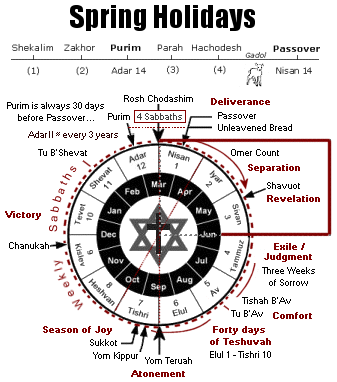 |
The Spring Holidays:
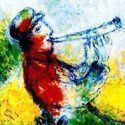
The spring holidays (חגי האביב) provide a portrait of the death, burial, and resurrection of the Messiah: Yeshua was crucified on erev Pesach (during the time of the sacrifice of the Passover lambs), buried during Chag Hamotzi (the festival of Unleavened Bread), and was resurrected from the dead on Yom Habikkurim (the Day of Firstfruits). Fifty days after Passover, on the climactic holiday of Shavuot (i.e., the feast of Pentecost), the Ruach HaKodesh (Holy Spirit) fell on the believers in fulfillment of the promise given by our Lord. Note that the giving of the Holy Spirit occurred precisely according to the calendar countdown given in the Torah (Lev. 23:15-16), and that it occurred after the resurrection of Yeshua -- just as our Messiah foretold (John 16:7; Acts 1:6-8, 2:1-4). This proves that the feasts of the LORD (מוֹעדי יהוה) were not abolished after the crucifixion. The meaning of the gospel is prefigured in the holidays given in Torah. See Luke 24:27, 24:44; John 5:46; Acts 26:22, etc.
![Spring Holiday Timeline (H4C]](../../../../About_HFC/Site_News/Archive-2023/roshchodeshim-line.gif) |
Kindly note that in accordance with both Torah and Jewish tradition, the following holiday dates begin at sundown (ויהי־ערב ויהי־בקר; Gen. 1:5):
- Month of Adar (Mon. Feb. 20th [eve]) - Wed. March 22nd [day])
Dates for Passover Week 2023:
Free Seder Guide
- Month of Nisan (Wed. March 22nd [eve]) - Thurs. April 20th [day])
- Month of Iyyar (Thurs. April 20th [eve] - Sat. May 20th [day])
- Month of Sivan (Sat. May 20th [eve] - Sun. June 18th [day])
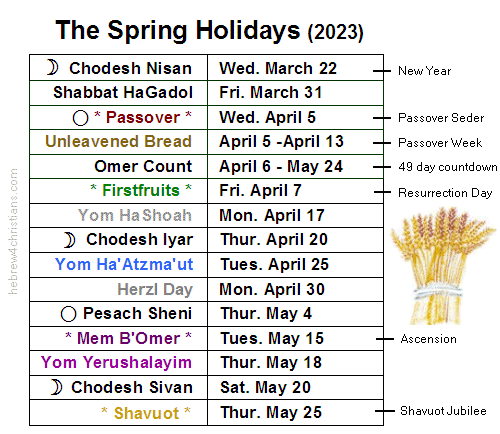 |
Note: For more information, see the Calendar Pages....
May 2023 Updates
Note: Please refresh the page (or press F5) to see the latest updates...
Breath of your Life...
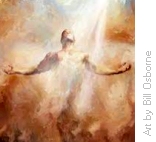
05.31.23 (Sivan 11, 5783) "And the LORD God formed man of the dust of the ground, and he breathed into his nostrils the breath of life (i.e., nishmat chayim: נִשְׁמַת חַיִּים); and man became a living being" (Gen. 2:7). We learn from this verse that man's neshamah (soul) comes from the very breath of God. Just as the body returns to dust, so the neshamah returns to God. The neshamah - not the body - is what is essential to our being, and that is why the sages regard the day of one's death as better than the day of one's birth (Eccl. 7:1). The Apostle Paul also regarded the godly discipline of the soul to be of greater value than discipline of the body: "For bodily exercise profits a little, but godliness (חֲסִידוּת) is profitable for all things, having promise of the life that now is and of that which is to come" (1 Tim. 4:8).
The 613 commandments of the Torah are distilled to the principle: "A righteous person finds life through faith" (Hab. 2:4), which means that education of our soul in matters of faith is the essential task of our life in this world, and indeed, it is education for eternity!
Hebrew Lesson
Proverbs 4:23 Hebrew reading (click):
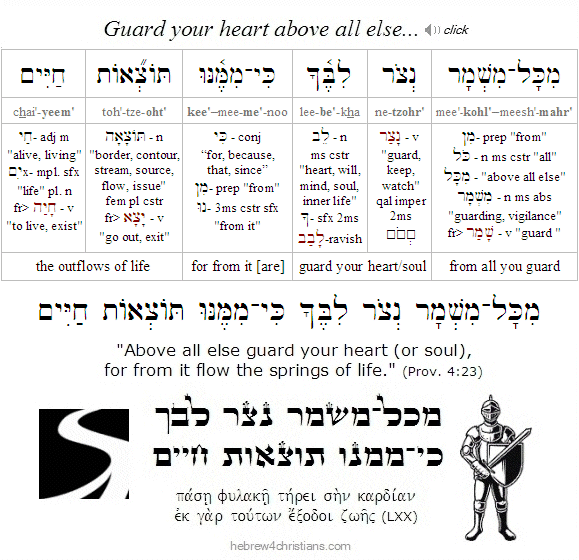 |
Truth of the Inward Being...
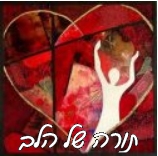
[ "Strive to enter in (᾽αγωνίζεσθε εἰσελθεῖν) at the narrow gate: for many, I say to you, will seek to enter in, and shall not be able." - Yeshua (Luke 13:24) ]
05.31.23 (Sivan 11, 5783) It is written in our Scriptures: "As a man thinks in his heart, so is he." We often see what we want to see more than what is really there. That's called wishful thinking. We overlook much, and we often ignore what might challenge our own preferred interpretations. For example, we may think that we are trusting God for our lives, but we worry, we fret, we attempt to control others, we get angry, and so on. We have a blind spot regarding the question whether we are really trusting God, perhaps because earnestly questioning what we actually believe seems too threatening (John 16:31-32). After all, what if we were to discover that don't really know what it is that we believe? Or what if we struggle to believe beyond our prejudices? What if we are confused? What does that say about who we are? So we ignore the real problem (namely, our lack of truth, our deficient faith in God, the fear of what we really are) and go one thinking we are something we are not. In short, we fool ourselves at the expense of truth.
This is a tragic and common failing of human nature. During the Nazi years, many ordinary Germans flatly refused to believe reports of atrocities at the death camps because it was too costly to discover the truth (the same might be said about any patriotic citizens who rationalize the actions of their government regardless of the moral issues involved). By willfully hiding from the facts, we pretend we are not responsible, and therefore we justify passivity in the face of injustice and evil.
Yeshua warned that the time would come when those who kill others will delude themselves into thinking they are doing God a big favor (John 16:2). Think of how massively self-deceived such a thing is as that -- to murder someone as a so-called service to God! Many of the biggest enemies of the truth are often those who think they are doing God such "favors."
הֵן־אֱמֶת חָפַצְתָּ בַטֻּחוֹת
וּבְסָתֻם חָכְמָה תוֹדִיעֵנִי
hein-e·met · chah·fatz·tah · va·too·choht
oov·sah·toom · chokh·mah · toh·dee·ei·nee

"Behold, you delight in truth in the inward being,
and you will teach me wisdom in the secret heart"
(Psalm 51:6)
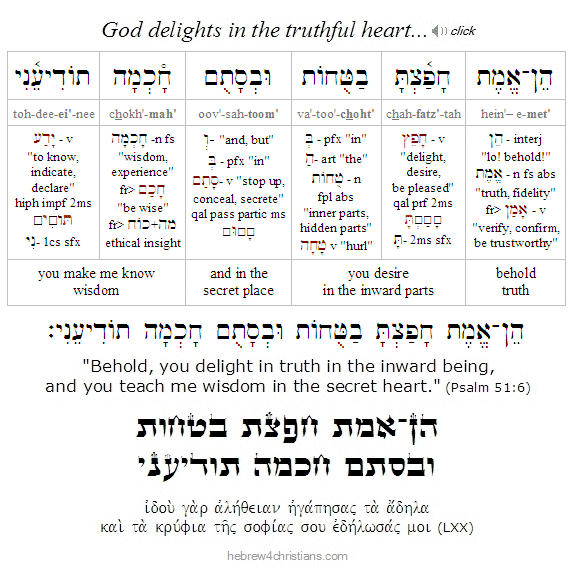
Often, however, the truth "of the inward being" is gained at the expense of heartache, for surely the heart must ache, tremble, and despair before it comes to accept the truth about its condition. This sort of truth is "existential," meaning that it is known only through the process of living life itself. As Kierkegaard said, "There are many people who reach their conclusions about life like schoolboys: they cheat their master by copying the answer out of a book without having worked the sum out for themselves." Yes, and they cheat themselves, too, since they somehow believe that "knowing the answer" given by another is the same thing as "knowing the answer" of their own inward being... Kierkegaard continues this thought: "The truth is lived before it is understood. It must be fought for, tested, and appropriated. Truth is the way... you must be tried, do battle, and suffer if you are to acquire truth for yourself. It is a sheer illusion to think that in relation to truth there is an abridgment, a short cut that dispenses with the necessity of struggling for it."
A man who was afflicted with a terrible disease complained to Rabbi Israel that his suffering interfered with his learning and praying. The rabbi put his hand on his shoulder and said, "How do you know, friend, what is more pleasing to God - your studying or your suffering?" (Buber: Hasidim).
Note that the "inward being" (i.e. tuchot: טֻחוֹת) refers to the "kidneys" which were thought to be "the reins" or the concealed source of the will within the person (i.e., te'ach: טִיחַ). Interestingly, the word te'ach comes from the verb tachah (טָחָה) that means to "shoot with a bow," alluding to the idea of inner Torah as a directive power. God wants purity of the heart – passion, singleheartedness, and earnestness – as we live and practice the truth. God wants "the inner parts," the concealed parts of the soul, to be filled with his Torah, and therefore David asks God to make him to know wisdom there - in the "secret heart" - so that he might apprehend God's truth and do teshuvah that purifies the heart.
Sin and Insanity...
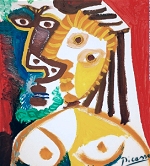
[ "Don't you know that a midnight hour comes when everyone has to take off his mask? Do you think life always lets itself be trifled with? Do you think you can sneak off a little before midnight to escape this?" - Soren Kierkegaard ]
05.31.23 (Sivan 11, 5783) From our Torah reading this week (i.e., parashat Naso) we read, "If any... goes astray and breaks faith..." (Num. 5:12). The sages comment that the Hebrew for "goes astray" (i.e., tisteh: תִשְׂטֶה) is written so it may also be read as "goes insane" (i.e., tishteh: תִשְׁטֶה), and concludes that sin is a form of insanity, that is, a denial of what is real, and therefore a state of delusion.
We are required, as a matter of our faith in the truth of Holy Scripture attested by the Holy Spirit, to believe that God is knowable (Rom. 1:19-20), that we are always in His presence (Prov. 15:3; Psalm 94:9; 139), that He is all-knowing or omniscient (Psalm 147:5), and that nothing can be hidden from Him (Isa. 40:28; Jer. 23:24; Heb. 4:13), but when we sin, we "break from" this reality and deny the divine Presence by a perverse act of self-exaltation.
Whenever we imagine that we are unseen by God or whenever we "forget" that we live, move, and have our being in His presence, we are denying reality. Our sin causes us lose sight of what's real: we forget who God is; we forget who we are; and we exile ourselves from the Source of life... Surely sin is a form of insanity, and therefore we have a moral and spiritual obligation to think clearly and to value truth.
As Rabbi Judah would say, "Contemplate three things, and you will not come to the hands of transgression: Know what is above from you: a seeing eye, a listening ear, and all your deeds being inscribed in a book" (Pirke Avot 2:1). Therefore "fear God and keep his commandments, because this is the whole duty of man. For God will bring every deed into judgment, with every secret thing, whether good or evil" (Eccl. 12:13-14).
Hebrew Lesson:
Ecclesiastes 12:14 reading (click):
The Eyes of the LORD...
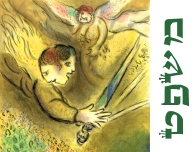
05.31.23 (Sivan 11, 5783) There is a story about how the Baal Shem Tov once hired a wagon driver to take him to a nearby village. On the way, the two men soon passed by a field laden with luscious produce. The driver stopped the wagon, turned to the Baal Shem Tov - whose identity he did not know - and said with a wicked grin, "I'm going to fetch us some good vegetables from that field now. You be on the lookout. Call out if you see anyone!"
Just as the driver bent down to pick some vegetables, the Baal Shem Tov screamed, "We're seen! We're seen!" The frightened man then ran back to the wagon and raced away. After traveling some distance he turned around and realized that no one was following them. "Why did you call out like that?" he chided the rabbi. "There was nobody watching." The Baal Shem Tov then pointed upward and said: "God was watching; God is always watching, as it's written: 'The eyes of the LORD are in every place, observing the evil and the good.'"
Hebrew Lesson:
Proverbs 15:3 reading (click):
The Secret Blessing...
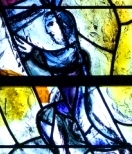
[ "We know that if God should put to the test our faithfulness to him, we know well that at the moment of testing, he himself must hold on to us, that is, we know that at bottom we are unfaithful, and that every instant it is he who at bottom holds us." - Kierkegaard ]
05.30.23 (Sivan 10, 5783) "But you, when you pray, go into your room, and when you have shut your door, pray to your Father who is in the secret place; and your Father who sees in secret will reward you openly" (Matt. 6:6). Yeshua did not want outward shows of spirituality or religion (Matt. 15:8; Luke 18:10-14). The rabbis called for public displays of repetitive prayers, but Yeshua taught that true prayer is a matter of intimate passion within the heart, and that the most powerful intercessions were made with ruach ha'koshesh - "groanings that cannot be uttered"(Rom. 8:26).
Instead of reciting prayers for the sake of ceremony or man's approval, Yeshua instructed us to pray "secretly" to our Father who "sees in secret" (ὁ βλέπων ἐν τῷ κρυπτῷ). Indeed, Yeshua taught that the LORD is "τῷ ἐν τῷ κρυπτῷ," the one who is in the secret place, that is, hidden from outward forms, and that is why he himself came to the world in disguise (Isa. 53:2). Since there is no merit in flattering God for help, the Father rewards those who pray in their brokenness and poverty of heart, and his reward is revealed divine grace expressed openly - "ἐν τῷ φανερῷ" - unhidden to heart of faith (Deut. 29:29; Dan. 2:22). God rewards those who believe and seek Him (Heb. 11:6). "He who dwells in the secret place of the Most High shall abide under the shadow of the Almighty" (Psalm 91:1).
τῷ ἐν τῷ κρυπτῷ - God both is, and sees, "in secret." He is in secret because he dwells in unapproachable light, whom no one has ever seen or can see" (1 Tim. 6:16), and yet he calls us to believe in the light, to walk in the light, and to be children of light (John 12:36; 1 John 1:7). We see the light in the teaching of Yeshua, by means of the Holy Spirit, though we see through a glass darkly, by analogy and riddle (1 Cor. 13:12). Some things are clear to us in this life, but much awaits to be revealed (1 John 3:2). "I have many more things to say to you, but you cannot bear them now" (John 16:12), though the Holy Spirit will give enough illumination for us to know the truth that sets our hearts free (John 16:13). "The secret of the LORD is for those who fear him, and he will show them his covenant" (Psalm 25:14).
But why does God hide this way? And why does he attend to that which is hidden or concealed (Heb. 4:13). The eye of faith sees the "invisible" things, the unseen blessing that lies behind the phenomenal realm of existence (Heb. 11:27). As Blaise Pascal said, "there is enough light for those who want to believe, and enough shadows to blind those who don't." In this present world, God "hides" so that people may seek him, for once he openly reveals his Presence, there is no longer the issue of faith (Rom. 8:24). This is part of the "mysteries of the kingdom" (τὰ μυστήρια τῆς βασιλείας), after all (Matt. 13:10-15) which presents a "two-tiered" reality, the heavenly realm of God's Presence, and the earthly realm of transience. Upon reflection we may sometimes feel lonely and bewildered in this duality, not knowing how to "mediate" or bring together the opposite poles of our experience... On the one hand life in this present world is fading away, and finitude, dissolution, and the "dust of death" seem omnipresent to our physical senses, nevertheless our hearts yearn for eternity, for unending life, and God's presence and the manifestation of everlasting significance. We long for meaning, wonder, greatness, and the peace of unconditional love, yet we find ourselves trapped within a diseased and moribund world that is filled with thwarted dreams, painful losses, harrowing vexations, and death... We hunger and thirst for real life, for salvation from our misery, but the cosmological visions of mechanistic science reveal an immense emptiness that has no goal or end, no explanation for its existence, and therefore no meaning or real hope.
God hides so that we will seek him (Jer. 29:13). This seeking involves all our heart, since we will not seek God until we understand the inner crisis. It is not enough to know right words of theology, since we must learn to think the right way, and this comes at the cost of struggle, wrestling, and testing. We cannot rely on reason alone to guide us, for that relegates beauty, mystery, and hope into oblivion; nor can we dismiss reason, for then faith becomes absurd and ridiculous. We must find a delicate balance: "faith seeking understanding," knowing when it is right to question, to doubt, and to analyze, and when it is right to affirm, to submit, and to surrender. Reason is a servant of something more fundamental, namely the heart or the will; it is activated at the stir of the soul's desire.
Hebrew Lesson
Psalm 19:12 reading (click):
Blessing of Willingness...
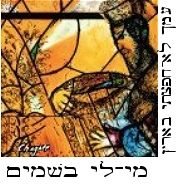
[ "Let me seek you in the darkness of my silence, and find you in the silence of Your light, which is love shining as the sun, flowing like the river, and joying like the heart." - Meister Eckhart ]
05.30.23 (Sivan 10, 5783) When King David repented from his sin and asked God's forgiveness, he appealed to the LORD: "Restore me to the joy of your salvation (יְשׁוּעָה) and sustain me with a willing spirit. Then I will teach transgressors your ways, and sinners will return to you" (Psalm 51:12-13). The sages comment that this is indeed the way of the LORD (דֶּרֶךְ יְהוָה), namely, to confess your sin, and in brokenness and heartfelt contrition, to return to the LORD full of hope in his steadfast love. In this way, sinners will understand the truth of Torah and return to the LORD God as well.... Hashiveinu, Adonai.
In the Torah we read: "if you seek for the LORD your God from there (i.e., in your place of exile), you will find him, if you search for him with all your heart (בְּכָל־לְבָבְךָ) and with all your soul" (Deut. 4:29). From where do we search, from what place, except from a place of hardship, testing, and tribulation? If you seek for the LORD your God from there - in the midst of your exile, in the midst of your heart's cry - you will find him there, in your heart. This message is a prophecy to the heart of faith, so that even after testing befalls you, in the end you will belong to the LORD and will hear his voice.
Hebrew Lesson
Psalm 51:12 reading (click):
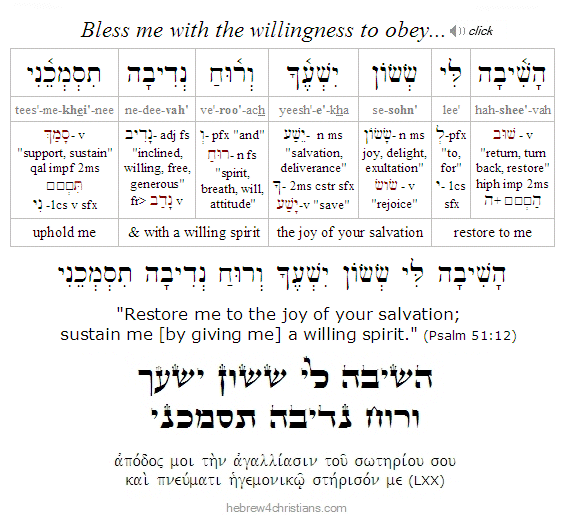 |
What We Really Need...
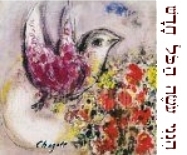
[ "But if God knows all that we need, and better far than we do ourselves, why should it be necessary to ask Him for anything?" I answer, "What if He knows prayer to be the thing we need first and most? What if the main object in God's idea of prayer be the supplying of our great, our endless need - the need of Himself?" - George MacDonald ]
05.30.23 (Sivan 10, 5783) We don't pray to attempt to change God's mind, but rather to change our own: "Your Father knows what you need before you ask him" (Matt. 6:8). Prayer is not a means of getting your Father's attention, but rather of getting your attention fixed on reality. It is a confession of your great need to find out who you really are. And while it is indeed true that "God knows everything," He does not know anything apart from his love. God does not "know" you in some "abstract" sense, like a computer that stores data and information, but rather as a parent who loves and cares for you (Psalm 103:13).
Your heavenly Father knows the number of hairs on your head; he knows the word on your tongue before you utter it, and he perfectly sees your beginning and end. He has intimate understanding of who you are and what you really need... Turn to Him in trust today.
Hebrew Lesson
Psalm 103:13 reading (click):
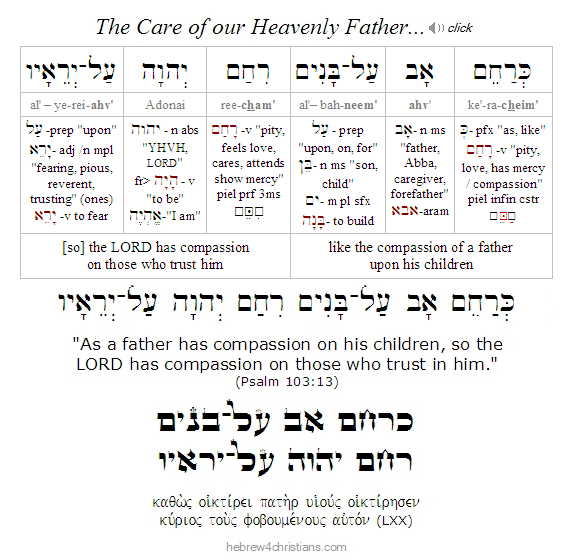 |
Remembering our history...

[ "Blessed is the nation whose God is the LORD" - Psalm 33:12 ]
05.29.23 (Sivan 9, 5783) In the United States, Memorial Day is a national holiday observed on the last Monday of the month of May, that commemorates the sacrifice of those men and women who died in military service for their country. For those who have lost a loved one during their military service, please accept our heartfelt condolences and appreciation for your great sacrifice... And may the LORD God Almighty have mercy upon all the nations of the world by imparting the revelation of His Living Torah, Yeshua, as it says, "Where there is no prophetic vision the people cast off restraint, but blessed is the one who keeps Torah" (Prov. 29:18). If there is no prophetic vision, no apprehension of revelation, there is no direction, and this can lead to moral and spiritual disorder, chaos, and bondage.
בְּאֵין חָזוֹן יִפָּרַע עָם
וְשׁמֵר תּוֹרָה אַשְׁרֵהוּ
be·ein · cha·zohn · yee·pa'·ra · ahm
ve·shoh·meir · toh·rah · ash·rei'·hoo

"Where there is no prophetic vision the people cast off restraint,
but blessed is the one who keeps Torah." (Prov. 29:18)

Download Study Card
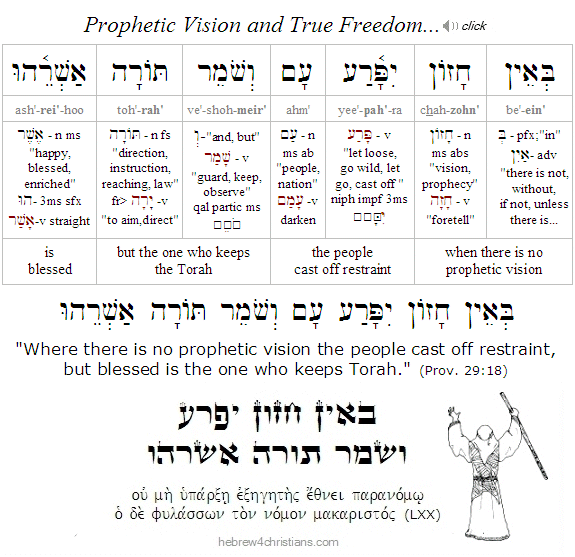
Note: Though our kingdom is not of this world, please pray for the United States of America -- a nation that has come under philosophical and ideological attack from those who seek to undermine America's history in order to forward their godless agenda... Pray for God's mercy and grace for this land, and above all, for the miracle of teshuvah to turn many to Him in these latter days. Thank you.
The Paradox of Moses...
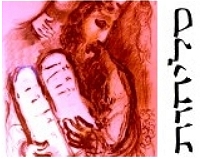
05.29.23 (Sivan 9, 5783) Our Torah portion this week (i.e., parashat Naso) ends with these amazing words: "And when Moses went into the Tent of Meeting (i.e., the Mishkan) to commune with the LORD, he heard the Voice (הַקּוֹל) speaking to him from above the mercy seat (i.e., kapporet: כַּפּרֶת) that was upon the Ark of the Testimony, from between the two cherubim; and there the LORD spoke to him" (Num. 7:89).
Now Moses was truly an extraordinary and wonderful person -- Israel's first great prophet, priest, and king. His life can be divided into three great distinct periods of 40 years each. First, he was raised as an Egyptian and lived as a prince of Egypt (the Egyptian period); second, he fled to the land of Midian where he became a shepherd and encountered God in the desert (the Midianite period); and third, after the great deliverance from Egypt, Moses led the people back to Sinai where he 1) became the mediator (priest) of the covenant between God and Israel, 2) legislated the various laws of the Torah, and 3) received the prophetic vision of the Tabernacle, the future exile, and the ultimate glory of Zion.
Notice, however, that Moses was extraordinary in the sense that he transcended the entire system of religion that was later established as "Judaism." First, as the great legislator, Moses stood outside of the law, serving as its voice of authority. Second, as the high priest of Israel, Moses instituted various sacrificial rites before the laws of sacrifice were enacted. For example, he instituted the Passover sacrifice in Egypt (Exod. 12:1-11), and when the people later reached Sinai, he offered blood sacrifices to ratify the terms of the covenant (Exod. 24:8). Moreover, he ascended the mountain and received the prophetic vision of the Sanctuary before the priesthood had been instituted in Israel (Exod. 25:8-9). And even after the laws of the priests were enacted and the Tabernacle was erected, Moses was allowed to go before the very Holy of Holies to hear the Voice of the LORD, even though technically speaking this was forbidden, since Moses was not a kohen (i.e., descendant of Aaron).
I mention this because some Jewish people stumble over the fact that Yeshua, who was from the tribe of Judah, served as Israel's High Priest of the New Covenant. Of course this issue is addressed in the Book of Hebrews, where the role of the Malki-Tzedek priesthood is ascribed to King Yeshua (Heb. 5:6-11; 7:1-19), but it is important to realize that Moses himself foresaw the coming of the Messiah as Israel's great prophet, priest and King (Deut. 18:15-19; John 5:36). Indeed, just as Moses himself was "outside" the law by serving as Israel's priest but nevertheless was commissioned by God Himself, so also with Yeshua, who instituted the sacrifice of His blood as the Lamb of God and who went directly before God's Throne to intercede on our behalf.
Like the patriarch Joseph before him, Moses was a "picture" of Yeshua in various significant ways. Though he was a Jew from the tribe of Levi, he appeared as a "prince of Egypt" to his own people and was educated in all the wisdom of the Egyptians (Acts 7:22). And though he was God's chosen deliverer, Moses was initially rejected by the Israelites and then turned to the Gentiles, taking a "foreign" bride. After being severely tested in the desert, he was empowered by God's Spirit to become Israel's deliverer for their hour of great tribulation. Indeed, both Moses and Yeshua were "sent from a mountain of God" to free Israel; both revealed the meaning of God's Name; both spoke with God "face to face." Moses was sent from (physical) Mount Sinai in Midian; Yeshua was sent from a spiritual "Mount Zion" in Heaven (Heb. 12:22). The New Testament relates that Moses and Elijah later met with Yeshua to discuss His "departure," literally, "His Exodus" (τὴν ἔξοδον αὐτοῦ) that he would accomplish at Jerusalem to redeem the entire world (Luke 9:30-31).
Hebrew Lesson
Deut. 18:15 reading (click):
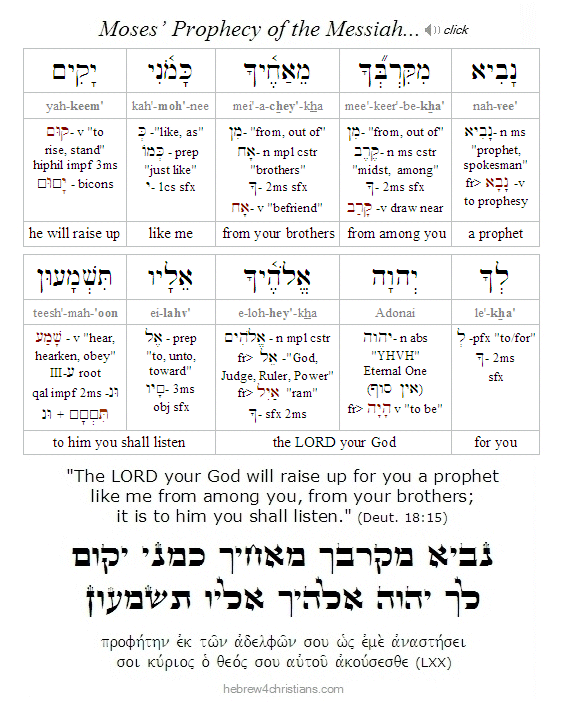 |
Moses foretold of the coming Messiah who would resemble him in many distinctive and remarkable ways. For more on this subject, see:
Changed by His Spirit...
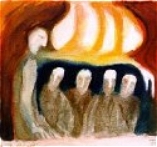
05.29.23 (Sivan 9, 5783) The Apostle Paul (רבי פאולוס השליח) taught that we are not to be "conformed" (συσχηματίζω) to the pattern of this fallen world but rather be "transformed" (μεταμορφόω) by renewing our minds, so that by testing we may discern what is the will of God (Rom. 12:2).
Note that the word translated "conformed" in this verse means to accept the world's scheme (σχῆμα) of understanding things, that is, to passively go along with the world's matrix of lies, wishful thinking, propaganda, etc. The word translated as "transformed," on the other hand, means to be metamorphosed or radically changed into a different kind of nature with a different source of being itself. Such transformation comes from having our minds "renewed" -- the word used in this verse (i.e., ἀνακαινόω) means being "made new on the inside," and therefore renewal is the gift of teshuvah (turning to God).
Understand, then, that the foundation of all transformation of inner character and outward conduct comes from the miracle of having a renewed mind. I use the word "miracle" quite intentionally, since by itself "right thinking" is powerless to help the sinner truly change his ways, and therefore new life and healing power from heaven is essential....
Hebrew Lesson:
Psalm 19:7 reading (click):
The Torah of Shavuot...
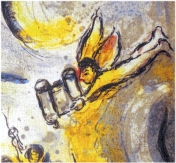
05.29.23 (Sivan 9, 5783) The importance of the Torah, or "law" of God, cannot be overstated, friends, and the holiday of Shavuot recalls and celebrates its importance in our lives. Yeshua plainly said to his followers: "Do not think that I have come to abolish the Law or the Prophets; I have not come to abolish them but to fulfill them. I tell you the truth, until heaven and earth pass away not the smallest letter or even a stroke of a letter (קוצו שׁל יוד) will pass from the law until everything comes to pass. So anyone who breaks one of the least of these commands and teaches others to do so will be called least in the kingdom of heaven, but whoever obeys them and teaches others to do so will be called great in the kingdom of heaven" (Matt. 5:17-19). He further solemnly warned: "Not everyone who says to me, 'Lord, Lord,' will enter into the kingdom of heaven– only the one who does the will of my Father in heaven. On that day, many will say to me, 'Lord, Lord, didn't we prophesy in your name, and in your name cast out demons and do many powerful deeds?' Then I will declare to them, 'I never knew you. Go away from me, you workers of lawlessness' (Matt. 7:21-23).
To the ungodly, "freedom" means being lawless, that is, acting under their own authority apart from the will of God. This of course was the original temptation in Eden, when the nachash (serpent) told Eve that if she acted under her own authority, her eyes would be "opened" and she would be "like God," knowing both good and evil (Gen. 3:5). That is always the creed of the wicked: "Do as thou wilt..." True freedom, however, is not the supposed right to do whatever you want, but instead is the power to do what is right, living in harmony with moral reality, and being liberated from the slavery of impulses to do evil. The law of God, then, is the blessing of having boundaries, order, and moral sanity within our lives, and that is why the Holy Spirit inscribes the law "within" us - to help guide our steps, protect our way, and to empower us to live in obedience to the truth of God (Jer. 31:33). If you are led by the Spirit, you are no longer enslaved to the law of sin and death -- that is, the lower nature and its idolatrous impulses -- but you will bear the fruit of righteousness, goodness and truth (Gal. 5:18; Eph. 5:9). Let no one deceive you with vain words. You cannot serve two masters... If you know that the Messiah is righteous, you know that every one that does righteousness is born of God (1 John 2:29).
God did not send the Savior to suffer and die on the cross so that people would disregard his moral will and go right on sinning. No, by his sacrifice Yeshua delivers us from the power of sin and death and thereby empowers us to do his will: "For we are his workmanship, created in Messiah for good works that God prepared beforehand" (Eph. 2:10). Followers of Messiah are to be "filled with the knowledge of his will in all spiritual wisdom and understanding, to live our lives in a manner worthy of the Lord, fully pleasing to him, bearing fruit in every good work and increasing in the knowledge of God" (1 Cor. 1:9-10). Therefore the message of Shavuot is that we should walk worthy of God, who has called us unto his kingdom and glory (1 Thess. 2:2). Chag Shavuot Sameach.
Hebrew Lesson
Psalm 119:97 reading with commentary (click):
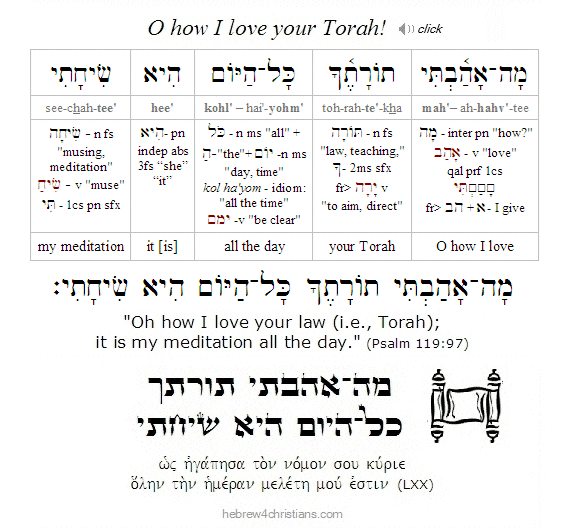 |
This week's Torah:
Parashat Naso (פָּרָשַׁת נָשׂא)
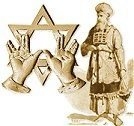
[ Thank you for remembering me in your prayers, friends. I have been going through some tough things lately. God knows. Shalom and love to you all. ]
05.28.23 (Sivan 8, 5783) Chag Shavuot Sameach, friends... Among other things, our Torah portion for this week, parashat Naso ("lift up!"), includes the cornerstone blessing that Aaron and his sons (i.e., the priests) were instructed to declare over the people of Israel: "May the LORD bless you and keep you; may the LORD shine his face upon you and be gracious to you; may the LORD lift up his face upon you and give you his peace" (Num. 6:24-26).
Notice that the Hebrew text of the blessing (see below) begins with three words, is comprised of three parts, invokes the divine Name three times, and is therefore appropriately called "the three-in-one blessing" (שלוש בברכה אחת). Notice also that the words are spoken in the grammatical singular rather than plural because they are meant to have personal application, not to be a general benediction over a crowd of people. The phrase, "May the LORD lift up his face upon you..." (ישא יהוה פניו אליך) pictures the beaming face of a parent lifting up his beloved child in joy...
The repetitive construction of God "lifting up His face" (יהוה פניו אליך) indicates that he gazes upon you in love and in blessing. Undoubtedly Yeshua recited this very blessing over his disciples when he ascended back to heaven on Mem B'Omer, though He would have spoken it in the grammatical first person: "I will bless you and keep you (אני אברך אותך ואשמור לך); I will shine upon you and will be full of grace toward you; I will lift up my face toward you and give you my shalom" (see Luke 24:50-51).
יברכך יהוה וישמרך
יאר יהוה פניו אליך ויחנך
ישא יהוה פניו אליך וישם לך שׁלום
ye·vah·re'·khe·kha' · Adonai · ve·yeesh'·me·re'·kha
yah·eir · Adonai · pah·nav · e·ley'·kha · vee·khoon·ne'·kah
yees·sa · Adonai · pah·nav · e·ley'·kha · ve·yah·seim · le·kha · shah·lohm

"May the LORD bless you and keep you;
May the LORD shine his face upon you and be gracious to you;
May the LORD lift up his face upon you and give you his peace."
(Num. 6:24-26)
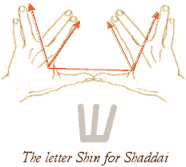
Nesiat Kapayim (Raising of the hands)
Note: The verbs in this blessing are all "jussive," usually expressing wish, desire, or command, though understood in context (i.e., as part of the blessing recited by the kohanim during ceremonial occasions), the verbs should be regarded as declarative or oracular. To learn more about this blessing, click here.
Parashat Naso Links:
Ruth and the Redeemer...

[ "Every teacher of the Torah who becomes a disciple in the Kingdom of Heaven is like a homeowner who brings from his storeroom new gems of truth as well as old." - Yeshua ]
05.28.23 (Sivan 8, 5783) Shalom friends. During the season of Shavuot we read the Book of Ruth (מגילת רות), which tells the story about redeeming love and the advent of King David. Recall that King David was a direct descendant of Ruth, who as a Moabitess was an outsider and "stranger" to the promises of God (Ruth 4:17; Eph. 2:12). Despite being part of an despised and rejected group of people (see Deut. 23:3), Ruth overcame the law's demand by believing in the love and acceptance of a redeemer of Israel (Ruth 3:9). Ruth's great grandson was named David (דָוִד), meaning "beloved," which has the same numerical value as the word "hand" (יָד). It is no wonder that the LORD chose David to represent God's extended hand of love for the stranger, for the convert, for the outsider, the leper, and the lost, since his descendant Yeshua the Messiah came to love and redeem the entire world by means of His outstretched hands.
Now while the narrative of the Book of Ruth is straightforward, to fully understand its spiritual implications we need to be familiar with several laws from the Torah, including the laws of redemption (Lev. 25:32-55), the laws of Shemittah and Jubilee years (Lev. 25:4, 10, 23), the laws of family inheritance (Num. 27:8-11), the laws of yibbum or "levirate marriage" (Deut. 25:5-10), and various farming laws regarding leaving food for the poor and the stranger (Lev. 19:9-10; 23:22; Deut. 24:19). In addition, we need to understand the laws of warfare for taking possession of the land, and God's repeatedly stated commandment that Israel must be holy and not assimilate with surrounding cultures (Exod. 34:12; Deut. 7:1-6; 14:2, etc.). This restriction applied not only to the seven Canaanite nations (Deut. 7:1; 20:17-18), but also to the descendants of Lot (i.e., Amnonites and the Moabites), since they showed enmity to Israel when they first came to the land (Deut. 23:4-6). Indirectly, then, the story of Ruth provides a strong message to Christians: to follow the story of redemption, you must understand the Torah and its commandments! Amen...
Hebrew Lesson
Ruth 1:16a reading (click):
The Sigh of Faith...

05.25.23 (Sivan 5, 5783) "We groan inwardly as we eagerly await our redemption..." (Rom. 8:23). We sigh deeply because we are suspended between two worlds, living in the ambiguity of an already-not-yet expectation, enduring ourselves as imperfect vessels longing for perfection, trapped between what is and what will be, seeing the unseen, yearning for healing, believing that we shall never die, even as we die (John 11:26). We are restless for our eternal home and long for God's presence as we walk through shadowy vales, facing various temptations, whispering our prayers in the dark. And though we must learn endurance and trust in God's sovereign purposes, our faith nevertheless compels us to cry out, "How long, O Lord?" and "Come, Lord Yeshua" (Rev. 22:20).
Our ongoing challenge is to keep a steadfast attitude despite the struggles we face, and therefore we inwardly pray: "Renew within me ruach nachon (רוּחַ נָכוֹן) - "a spirit that says Yes" (Psalm 51:10). Surrender means accepting God's will for our lives -- saying "yes" to the promise of love, even if we presently feel empty inside and wonder how long we can hang in there... Saying "yes" implies saying "no" to other things - no to fear, anger and doubt, for example. Tragically there are people who have given up hope for bitterness and despair. Asking God to give us a spirit of "yes" is really a prayer for focus, direction, and the willingness to keep pressing on to our heavenly destiny.
Though life is a struggle, we do not lose heart or faint, since even if the outer self is wasting away, our inner self is being renewed day by day. "For this light momentary affliction is preparing for us an eternal weight of glory beyond all comparison, as we look not to the things that are seen but to the things that are unseen. For the things that are seen are transient, but the things that are unseen are eternal. For we know that if the tent that is our earthly home is destroyed, we have a building from God, a house not made with hands, eternal in the heavens. For in this tent we groan, longing to put on our heavenly dwelling, that is, substance and reality..." (2 Cor. 4:16-5:3).
Hebrew Lesson:
Psalm 50:10 Hebrew reading (click):
Eschatology and Shavuot...
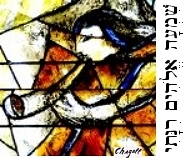
[ The festival of Shavuot (חג השבועות) begins at sundown... Happy Shavuot Holiday, friends! ]
05.25.23 (Sivan 5, 5783) Some people see the ultimate fulfillment of the holiday of Shavuot (i.e., "Weeks" or "Pentecost") to be found in the mysterious catching away (ἁρπάζω, harpazo) of believers before the time of the "Great Tribulation" and the Great Day of the LORD (1 Thess. 4:17; John 14:3; 1 Cor. 15:51-52). They reason that since Shavuot marked the day of dramatic revelation, with signs of fire and the sounds of a heavenly shofar blast, an appointed time that marks the jubilee fulfillment of Passover, it can therefore be seen as the rapturous end of redemption for those who believe, symbolic of a wedding day, when God betrothed Israel as His own people, separate from all others. Both Jew and Gentile will be "waved" before the LORD (as symbolized by shtei ha-lechem, the two loaves), representing the "one new man" of kallat Mashiach, the "bride of Messiah," or the assembly of those called out from every tribe and tongue to be a part of God's heavenly kingdom.
 |
Though no one knows the day or hour of the return of Yeshua our Messiah (see Matt. 24:36; Acts 1:7), there are clues given in Scripture about the conditions of the world before His return, and Yeshua himself gave us parables admonishing us to actively be looking (Matt. 24:2-14; 25:1-13). The Apostle Paul said that followers of the Lord can know the "season" of Messiah's return, and warned that He will come "as a thief in the night" - not in the revelation of great power and glory at the end of the age (1 Thess. 5:2-6). Moreover, Paul forewarned of the rise of worldwide godlessness (2 Tim. 3:1-7) and even of the flagrant apostasy of the "institutionalized" church (1 Tim. 4:1-3), which is of course evident today... Other Scriptures foretell of the coming One World Government, the rise of the Messiah of evil (Antichrist) whose "god" will be the "security state" (Dan. 11:38), the persecution of the national Israel (a nation miraculously restored to the promised land), the rebuilding of the Temple, the coming Great Tribulation, and so on. "When these things begin to take place, straighten up and lift up your heads, because your redemption is drawing near" (Luke 21:28).
Regarding the "world system," however, we have quite a different vision... The LORD God Almighty has vowed to break the pride of the "kings of the earth" with a rod of iron and dash them in pieces like a potter's vessel, and the shattering will be so ruthless that among its fragments not a shard will be found with which to take fire from the hearth, or to dip up water out of the cistern (Psalm 2:9; Isa. 30:14). For from His mouth comes a sharp sword with which to strike down the nations, and He will rule them with a rod of iron. He will tread the winepress of the fury of the wrath of God the Almighty (Rev. 19:15). Nebuchadnezzar's great dream will soon be fulfilled: "As you looked, a Stone was cut out by no human hand, and it struck the image on its feet of iron and clay, breaking them in pieces. Then the iron, the clay, the bronze, the silver, and the gold, all together were broken in pieces, and became like the chaff of the summer threshing floors; and the wind carried them away, so that not a trace of them could be found. But the stone that struck the image became a great mountain and filled the whole earth" (Dan. 2:34-35). "And the God of heaven will set up a kingdom that shall never be destroyed ... and it shall stand forever" (Dan. 2:44). One day the edifice of man's godless pride will come crashing down, and there will be no trace left of its rubble... Amen; even so, come quickly, Lord!
Note: Our tradition does not require us to accept everything at face value, though it does expect us to study, to wrestle, to seek truth. Each of us must "go to Peniel" to wrestle with the Angel; each of us must be renamed from Ya'akov ("a supplanter") to Israel ("a prince with God"). When the Spirit of Truth asks, "What is your name," may the LORD God grant you the courage to refuse to "let go" until you receive the divine blessing of love and acceptance.
Hebrew Lesson
Psalm 47:5 Hebrew reading:
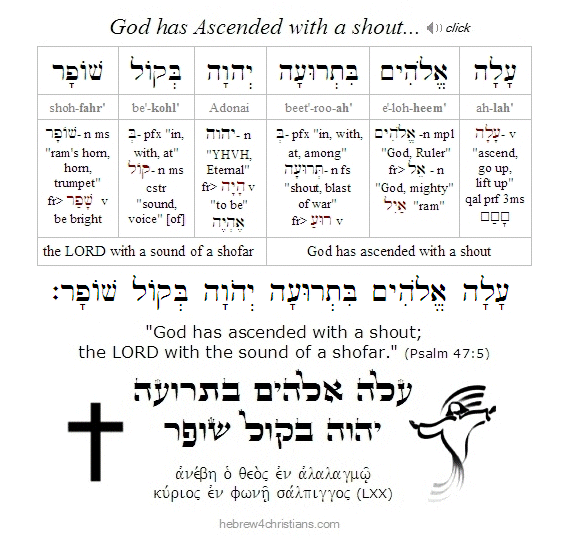 |
The Kingdom Within You...
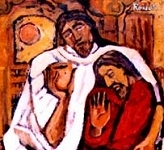
[ "I will not leave you orphans; I will come to you..." - Yeshua ]
05.25.23 (Sivan 5, 5783) "And I will ask the Father, and He will give you another Helper, that He may abide with you forever, namely, the Spirit of truth (רוּחַ הָאֱמֶת), whom the world cannot receive, because it neither sees Him nor knows Him; but you know Him, for He dwells with you and will be in you. I will not leave you orphans; I will come to you..." (John 14:16-18). Note that Yeshua asks the Father for the parakletos (i.e., the one "called alongside"), whom he calls the "Spirit of Truth," to "dwell within" the hearts of his followers so they will be fortified in their mission, and he furthermore identifies himself with the Spirit by saying that he would not leave us as orphans but would come to come to be with us...
I have written before about how Shavuot is called "Atzaret Pesach" (עצרת פסח) or the "culmination of Passover." Just as the Passover reveals "God with us" (עִמָּנוּ אֵל), as the Word made flesh, and "God for us" (אֱלהִים לָנוּ), as the sacrificial Lamb of God, Shavuot adds yet another dimension by revealing "God within us" (אֱלהִים בְּתוֹכֵנוּ), as the indwelling Presence, the "breath of God" that forever abides in our hearts. Yeshua was eager for us to partake of this miracle: "I tell you the truth: it is to your advantage that I go away, for if I do not go away, the Helper (i.e., ὁ παράκλητος, one "called alongside to help) will not come to you. But if I go, I will send him to you" (John 16:7).
As it is written, "By this we know that we live in him and he in us, because he has given us of his Spirit" (1 John 4:13). Or don't you know that your body is a temple of the Holy Spirit within you (רוּחַ הַקּדֶשׁ בְּתוֹכֵנוּ), whom you have from God? "For all who are led by the Spirit of God are the children of God" (Rom. 8:14). Thank God for the help we attain through the Spirit's heartfelt ministrations: "For the Spirit also helps in our weaknesses. For we do not know what we should pray for as we ought, but the Spirit Himself makes intercession for us with groanings which cannot be uttered" (Rom. 8:26).
Amen, thank you Lord Yeshua for the gift of the Holy Spirit within our hearts...
Hebrew Lesson:
Ezekiel 36:26a reading (click):
Yeshua the True Vine...

[ The holiday of Shavuot ("Pentecost") begins this evening at sundown... ]
05.25.23 (Sivan 5, 5783) "I am the true vine, and my Father is the Gardener. Every branch in me that does not bear fruit he takes away, and every branch that does bear fruit He purges (καθαιρει), that it may bear more fruit" (John 15:1-2). In other words if you bear fruit you will experience the "purging process," and that means suffering affliction... This might seem to you backward: Why does the fruitful branch need to be cut back? Indeed, the promise of suffering is not meant for an evil person, but for the righteous soul who trusts in God. Purging is painful but it is also purifying, yielding new growth within our hearts. Yeshua taught, "Blessed are the pure in heart, for they shall see God" (Matt. 5:8). The Greek word translated "pure" is katharos (καθαρoς), sometimes used describe the cleansing of a wound (catharsis), or to describe the unalloyed quality of a substance revealed through refining fire. We "rejoice" in testing because that is the way of real growth, sustained hope, and the revelation of God's deep love (Rom. 5:3-4). In our afflictions we are given heavenly consolation that helps us to persevere (2 Cor. 1:3-5). Remember that we are being weaned from this present age to be made ready for heavenly glory, for things unimaginably wonderful, soon to be revealed to you. Stay tuned, friends: the best is yet to come!
Yeshua warned us, however, that "if anyone does not live in Me, he is cast off as a branch, and withers..." (John 15:6). We find life only as we remain connected to the Source and Conduit of life, who is the Messiah, the Savior and LORD. True life grows out a heart connection with Yeshua, and without that connection our lives become vain and yield no eternal significance (John 15:5). Be forewarned: it is the Torah of Messiah that if you do not live in the Vine you will be destroyed, since life is found in no other Source (John 14:6; Luke 3:9). But be encouraged, trusting friend: we cannot create new life by our own efforts or effect regeneration by means of our own "good works." No, the work of salvation is God's alone, and we partake of that work as we abandon our self-efforts and religious conceits (see Isa. 32:17; Mark 4:26-29). There remains, therefore, a Sabbath for the people of God, "for whoever has entered God's rest has also rested from his works as God did from his" (Heb. 4:9-10). This "deep Sabbath" is a matter of trusting that the work of salvation has been accomplished on your behalf. Therefore "strive to enter into that rest," for the LORD always effects what is best for you. The path of peace is to surrender to God's care for your life and let the evils and drama of the world flow past you. This is "the work of faith." Look to heavenly reality and not to the vanity and deceits of this world (Col. 3:1-4); live in Yeshua's Presence, drawing strength and vitality from your relationship with Him. The fruit of the Spirit is produced as we yield ourselves to the love and presence of God.
Hebrew Lesson
John 15:1 reading (click):
Heeding the Father's Voice...
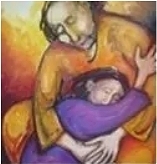
[ The giving of the Torah is connected with the holiday of Shavuot ("Pentecost"). This is derived from the chronology of the Exodus itself: the Passover (on Nisan 15) to the arrival at Mount Sinai (on Sivan 1) took 45 days (Exod. 19:1). Four days later God spoke "I AM" to Israel (Exod. 20:2). ]
05.24.23 (Sivan 4, 5783) Recall that God promised his people that they would experience heart change by the power of His Spirit: "Behold, the days come, says the LORD, that I will make a new covenant (ברית חדשׁה) with the house of Israel, and with the house of Judah, not according to the covenant that I made with their fathers in the day that I took them by the hand to lead them out of the land of Egypt, My covenant which they broke, though I was a husband to them, says the LORD. But this is the covenant that I will make with the house of Israel after those days, says the LORD: I will put My law (i.e., Torah) in their minds, and write it on their hearts; and I will be their God, and they shall be My people" (Jer. 31:31-33). Recall also that it was on the appointed time of Shavuot (i.e., "Pentecost"), 50 days after the resurrection of our Lord, when the disciples of Yeshua received the promise of the Holy Spirit and the Torah of God was written upon their hearts (see Acts 1:7-8; 2:1-4).
Just as the advent of Messiah signified the time of God's redemption of his people, so the advent of the Holy Spirit (רוּחַ הַקּדֶש) signified the time of their regeneration as God's children. Among other things, the role of the Spirit is to convict people of sin, to reveal the truth of salvation in Yeshua, and to empower believers of Yeshua to bear fruit that glorifies God.
Surely our great need is to have heart, to find strength, resolution, and steadfast determination to walk boldly during these heartless and depraved days (2 Tim. 3:1-5). We are not without God's help, of course. Yeshua told us that the Ruach HaKodesh (רוּחַ הַקּדֶשׁ) would be "called alongside" (παράκλητος) to comfort us on the journey. The English verb "comfort" literally means "to give strength" (from com- ["with"] and fortis ["strong"]), an idea similarly expressed by the verb "encourage," that is, to "put heart [i.e., 'core'] within the soul." In Hebrew, the word courage is expressed by the phrase ometz lev (אמֶץ לֵב), meaning "strong of heart," denoting an inner quality of the will rather than of the intellect. Ometz lev means having an inner resolve, a passion, and a direction. The sages say "the mind is the eye, whereas the heart is the feet." May God be our Light and Salvation as we walk through the surrounding darkness... Amen.
"Dear child of mine, do not forget my Torah (תורתי), but let your heart keep my commandments (מצותי). Doing so will add to you length of days (ארך ימים), long life, and peace (שׁלום). Do not abandon the heart of Your Father by losing sight of mercy and truth (חסד ואמת); No! Tie them around your neck; inscribe them upon the table of your heart (לוח לבך), that is, make them part of your inner being and will. Doing so will reveal my grace (חן) and good understanding (שכל־טוב) before the eyes of God and others. Trust in your heavenly Father with all your heart (בטח אל־יהוה בכל־לבך) and don't seek to be in control, trying to figure everything out on your own (ואל־בינתך אל־תשען). Listen for your Father's voice in everything you do; in all your ways know His heart (בכל־דרכיך דעהו), and then your ways will be directed in the truth. Don't assume that you know it all; abandon your self-conceit: Revere your heavenly Father (ירא את־יהוה) and flee from what you know is self-destructive and evil! Doing so will impart healing (רפאות) to you: your body will glow with health, your very bones will vibrate with life! Honor your Heavenly Father with everything you own; give him your first and the best of what you have (מראשׁית כל־תבואתך); then your barns will burst with plenty, and your wine vats will be overflowing" (Prov. 3:1-10).
Hebrew Lesson:
Proverbs 3:1 reading (click):
Bounds of Faith...
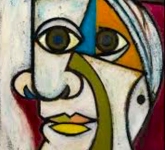
[ Reb Lev said, 'A tzaddik is one who lives Torah, not one who preaches it. Your actions, not your words! You have to be Torah: your habits, your motions, even your silences - are what count." ]
05.24.23 (Sivan 4, 5783) The purpose of our lives is to embody the heart of our Lord, to partake of the divine nature (John 15:1-12; 2 Pet. 1:4; 1 Cor. 3:16; Col. 1:27). We are to know the "mind of Christ" (רוּחַ הַמָּשִׁיחַ) and to share his redemptive vision for the healing of the nations. Anything that leads us away from walking in his light - any thought, word, emotion - any deed or creed that is inconsistent with the character of his grace and compassion is therefore a type of temptation for us. We are to take "every thought captive" to the truth of Messiah (2 Cor. 10:5). As it is written, "the one who say he lives in him ought himself to walk just as he walked" (1 John 2:6).
There is the dreadful possibility that we can "know" something to be true or right but to somehow justify disregarding it in our lives... But what is spiritual truth if it is not made alive by the practice of faith? And if we somehow excuse ourselves from living out the high calling of Yeshua, have we not abandoned the truth? Are we not deceiving ourselves by saying we know something when it makes no practical difference in our lives? Being faithful means holding to your convictions and refraining from the natural impulse to talk yourself out of them once they become inconvenient. Indeed, living out of harmony with your basic convictions is a symptom of a divided mind, a two-souled state of inner contradiction and confusion.
There is the terribly ironic danger of minimizing faith by hyper-focusing on the "objective" aspects of religion, that is, things like theological ideas, speculations, proofs for God's existence, and so on. As Kierkegaard once said: "All Christian knowing, however rigorous its form, ought to be concerned with upbuilding, but this concern is precisely the upbuilding." Objective knowledge is always "to a certain degree" and is therefore uncertain, but the life of faith calls for all your heart, soul, and strength, and it is for this reason that "theology" as something inside your head can serve as an evasion of the call to follow Yeshua and to live the truth he came to give us. The philosopher may understand that "all men are mortal" while ignoring that he himself will die, and that is the difference between an objective idea of mortality and the awareness of the fragility and sacred concern of life.
How is self-deception possible? How can we lie to ourselves? Doesn't this seem paradoxical and even bizarre? How can we know and yet not know at the same time? But it is common that we deny things that "deep down" we know are true; we minimize (or rationalize) our evil desires or concerns, we pretend that things are not as they really are; we choose to be unaware of something we do, we are "out of touch" with our feelings or we blame others for our troubles. We may unconsciously adopt a "normalcy bias" that pretends that we are not as bad as "other" people, or we invoke an optimism that suppresses threatening ideas. Self-deception represents a break from reality, lying to ourselves about our abilities, our virtues, our faith, and so on. In a way, self-deception is like propaganda that convinces us to believe a lie and then to (unconsciously) accept it as our reality. Interestingly enough, the philosopher Jean Paul Sartre thought that self-deception was incoherent and therefore not possible -- thereby deceiving himself into thinking that he couldn't deceive himself!
The Scriptures acknowledge the reality of self-deception and defines it as "reasoning around" the truth, i.e., παραλογίζομαι (from παρά, "around, beside" and λογίζομαι, "to reason"). In other words, it is a specious form of reasoning that aims to evade the truth by making excuses, quibbling, or making rationalizations. As Yeshua said, "wisdom is justified by her children," which I take to mean that people can find all sorts of reasons to justify whatever they want to believe.
The Apostle Paul warned us to both "test ourselves" with regard to the intellectual content of our faith and also to "prove ourselves" with regard to the veracity of our spiritual life: "Put yourselves to the test (ἑαυτοὺς πειράζετε) to see if you are in the faith; prove yourselves (ἑαυτοὺς δοκιμάζετε) to see whether Yeshua the Messiah lives within you - lest you fail the test and be disapproved (ἀδόκιμος)" (1 Cor. 13:5). Notice that the verb "to prove" (i.e., dokimadzo: δοκιμάζω) means to test something by fire (like a precious metal) to discover its quality and purity. The analogy here is straightforward. The quality of our faith will be revealed during times of testing and hard circumstance. Do we walk in love, joy, and peace - despite the testing of this life? If our faith regularly fails in the crucible of testing, we may need to reexamine its authenticity (Prov. 24:10; Matt. 7:21-23).
The Jewish view of truth is inherently existential - how you live reveals what you believe, and vice-versa. The truth must be lived in order to be real. We are to be "doers" of the Word, and not hearers only, since faith without works is dead and leads to self-deception "reasoning around" the truth. Only those who follow through and live out their faith will be blessed in their actions (James 1:22, 25). This mirrors Yeshua's statement, "If you know these things, blessed are you if you do them" (John 13:17).
May God have mercy and help us all turn away from inner darkness to the light of the Divine Presence. Teshuvah is a miracle that transforms the person so that the inner life is restructured and made into a new creation by means of God's grace (2 Cor. 5:17). Spiritual rebirth implies a new heart with a new set of affections: "I am crucified with Messiah; it is no longer I who live, but Messiah who lives in me. And the life I now live in the flesh I live by faith in the Son of God, who loved me and gave himself for me" (Gal. 2:20). Amen.
Hebrew Lesson
Psalm 139:23-24 reading (click for audio):
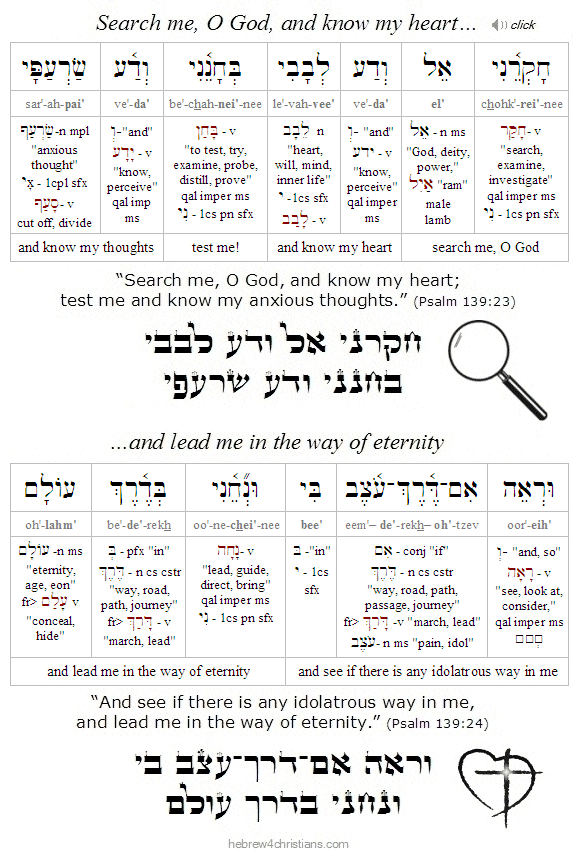 |
The Armor of His Light...
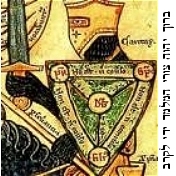
05.24.23 (Sivan 4, 5783) The goal of the devil, the "prince of the power of the air," has always been to enslave people in dark places of fear, anger, bitterness, and pain. His primary weapon is deception, that is, various lies by which he captivates people and makes them tools for his evil purposes. We are able to resist the power of the lie by submitting to the truth about Reality (James 4:7). God's Name YHVH (יהוה) means "Presence" and "Love," and there is no power in heaven or earth that can overrule His hand. Therefore even if the prophesied "End of Days" were to begin this very hour, our responsibility is to focus on the Divine Presence and to walk in His truth and love. As King David said, "I have set the LORD always before me; because He is at my right hand, I shall not be shaken" (Psalm 16:8).
שׁויתי יהוה לנגדי תמיד
כי מימיני בל־אמוט
shee·vee'·tee · Adonai · le·neg·dee · tah·meed
kee · mee·mee·nee · bahl - e·mot

"I have set the LORD always before me;
because he is at my right hand, I shall not be shaken"
(Psalm 16:8)

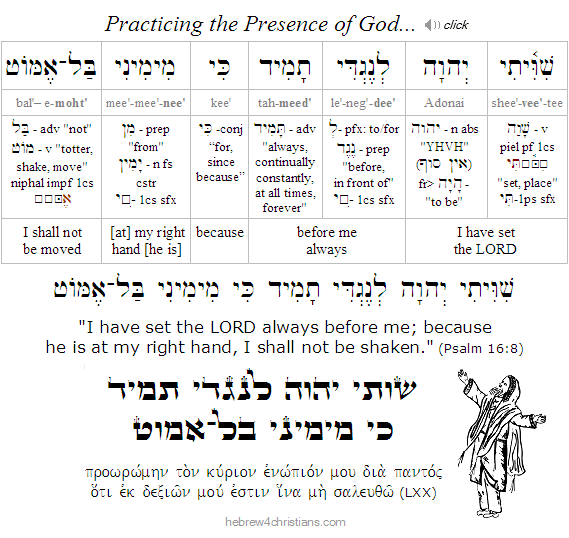 |
Encourage yourself by remembering that there is a future of healing and deliverance coming to us, though we must abide in the shadow of its substance for a bit longer: "For behold, the Day is coming (הַיּוֹם בָּא), burning like an oven, when all the arrogant and all evildoers will be stubble. The Day that is coming shall set them ablaze, says the LORD of hosts, so that it will leave them neither root nor branch. But for you who fear my Name, the Sun of Righteousness (שֶׁמֶשׁ צְדָקָה) shall rise with healing in its wings. You shall go out skipping like calves released from the stall. And you shall tread down the wicked, for they will be ashes under the soles of your feet, on the day when I act, says the LORD of hosts" (Mal. 4:1-3).
This awesome passage from the Book of Malachi primarily applies to the Second Coming of Yeshua and the great "Day of the LORD" (יוֹם יהוה). The "Sun of Righteousness," shemesh tzaddik (שֶׁמֶשׁ צְדָקָה), refers to Messiah son of David, the risen life-giving Healer of God. Of Him it is said, "The LORD God is a sun and a shield" (Psalm 84:11) and "the LORD shall be to thee an everlasting Light (אוֹר עוֹלָם), and thy God thy glory; thy sun shall no more go down, for the Lord shall be thine everlasting light" (Isa. 60:19-20). The Divine Light will shine on those who receive God's righteousness, that is, on those who put their trust in the One who said, 'I am the Light of the world' (John 8:12). Amen, the righteous will forever testify: "For with you is the fountain of life; in your light do we see light" (Psalm 36:9).
Hebrew Lesson
Malachi 4:2a reading (click for audio):
This is the promise of his grace: 'I will restore to you the years that the swarming locust has eaten.' God can give back all those years of sorrow, and you will be the better for them. God will grind sunlight out of your black nights. In the oven of affliction, grace will prepare the bread of delight. Someday you will thank God for all your sadness." - Charles Spurgeon
Despite the present hour, it is not all darkness... seek the Light and you will find it (Isa. 50:10).
Why Shavuot Matters...
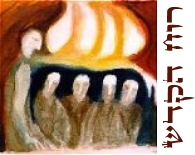
[ The holiday of Shavuot ("Pentecost") begins Thursday, May 25th, at sundown... ]
05.23.23 (Sivan 3, 5783) The holiday of Shavuot (חג השבועות) is called "Pentecost" in Christian tradition. The Greek word Pentecost (πεντηκοστή) means "the holiday of fifty days" referring to the 50th day after the crucifixion of Yeshua when the Holy Spirit descended upon the disciples and when Peter first proclaimed the truth of salvation in Jerusalem (Acts 2:1-43). The Torah teaches that Shavuot is a major biblical holiday (it is one of the three "required festivals" of the LORD, see Exod. 23:14-17; Deut. 16:16) and therefore it behooves us to understand its significance as the climax of Passover itself -- 'the endpoint' of the redemptive experience. Indeed, just as the blood of the lambs smeared on the door posts led directly to Sinai 50 days later, so the crucifixion of Yeshua led directly to the descent of the Holy Spirit to empower His followers to serve God under the new covenant of Zion.
 |
There are two essential priestly rituals commanded for the holiday of Shavuot: 1) the waving (i.e., tenufah: תנופה) of the two loaves of (new) wheat bread (called shtei ha'lechem: שתי הלחם), and 2) the offering of peace sacrifices (i.e., korban shelamim: קורבן שלמים). Both of these aspects of the priestly service (avodah) were fulfilled in the greater sacrifice of Yeshua made on our behalf. Moreover, just as worshipers at the Temple would present bikkurim (בכורים) - their choicest first fruits - and attest to God's faithfulness before the altar (Deut. 26:3), so we are called to walk in the fruit of the Spirit (פרי רוח הקודש) and to proclaim the message of God's faithful love for us.

Though it is not explicitly mentioned in the five books of the Torah, the early sages have long connected the revelation of the Torah at Sinai (מתן תורה) with the holiday of Shavuot. This comes from a careful study of the chronology of the exodus itself, calculating the time of the Passover from Egypt (i.e., Nisan 15) to the arrival of the Israelites at Sinai exactly 45 days later, on Sivan 1 (see Exod 19:1). The earliest extrabiblical source that explicitly links Shavuot with the revelation of the Torah at Sinai is the apocyphal Book of Jubilees (i.e., Sefer ha'Yovelim: ספר היובלים), dating from the 2nd century BC. Extant manuscripts of this book were found among the Dead Sea Scrolls (מגילות ים המלח), indicating that the Shavuot-Sinai connection was made before the advent of Yeshua. The Book of Jubilees provides a parallel account of Genesis and certain parts of Exodus, and mentions the observance of Shavuot by Noah before the time of the Flood. In the book Noah is told to observe the Festival of Weeks (shavuot) and to offer Firstfruits (bikkurim) every year as a commemoration of God's covenant to renew the earth (Jubilees 6:15;22). Likewise Abraham and the original patriarchs were said to observe it, though it was forgotten by the Jews in Egypt until Moses was said to have reinstated it at Sinai. Shavuot is also mentioned in the apocryphal Book of Tobit (טוביה) and the Book of Maccabees, c. 2nd century BC.
 |
The Talmud (i.e., traditional oral teaching of the Torah ) also connects Shavuot with the giving of the Torah at Sinai. The earliest Talmudic statement on the date of the revelation at Sinai is found in Tractate Shabbat 86b. According to these sages, the Israelites left Egypt on Friday, Nisan 15, and the Torah was given exactly 50 days later on Saturday, Sivan 6th. This corresponds exactly with God's instructions to count 50 days from the day after Passover (Lev. 23:15-16). This date later became fixed in the Jewish calendar, and was further supported by reference to Exodus 19:1: "On the third new moon after the people of Israel had gone out of the land of Egypt, on that day they came into the wilderness of Sinai." (For details about the exact timing for this event, see the main Shavuot article here.) The Midrash Rabbah also explicitly makes the Shavuot-Sinai connection as well. The later rabbis refer to Shavuot as "Atzeret" (עצרת), a word that means "withdrawal" (i.e., to the desert to receive the law) and "conclusion" (or the goal of the Passover redemption). Today Jewish tradition regards Shavuot as Zman Mattan Torateinu (זמן מתן תורתנו) - "the anniversary of the giving of the Torah." Shavuot is also called Yom Ha'Kahal (יום הקהל) - the "Day of Assembly," based on the assembly of all the people of Israel to hear the Voice of God at Sinai (Deut. 18:16).
Jewish custom affirms that in every generation each person should consider himself as having personally received the Torah at Sinai. The climax of the Shavuot morning service is the recitation of the famous Akdamut poem followed by the reading of the Ten Commandments, when all the congregation stands to "relive" the experience at Sinai. A second Torah scroll is then taken out of the ark and the portion is read (Num. 28:26-31) that describes the sacrificial offerings made at the Temple during Shavuot, and the Haftarah (Ezek. 1:1-28; 3:12) concerns the stunning revelation of God in the form of the Throne/Chariot.
The Scroll of Ruth (מגילת רות) - a beautiful story about God's redemptive love - is read on the second day of Shavuot. As the "kinsman redeemer" (i.e., go'el karov: גואל קרוב), Boaz was a wealthy man of the tribe of Judah (Bethlehem) who married a Gentile bride. Boaz's name (בועז) means "in Him [בו] is strength [עז]," a picture of Yeshua the Messiah, his greater Descendant, who also redeemed for himself a bride from among the nations. Among traditional Jews, the Book of Ruth is is read since the events recounted took place during the time of the spring harvest (linking it to the agricultural aspect of Shavuot), and Ruth is a picture of willing acceptance of a Jewish lifestyle (linking it to the events of Sinai).
Paradoxically, the conversion of Ruth was actually against the law given in the Torah itself! According to the Torah (Deut. 23:3), an Ammonite (or Moabite) was forbidden to enter into the family of Israel, and therefore the question arose regarding how Ruth was accepted. Indeed, not only was Ruth accepted, she became the great grandmother of King David through whom the Messiah Yeshua would come (Ruth 4:17). There is a wonderful message hidden here!
Shavuot is often portrayed metaphorically as a marriage ceremony (קִדוּשִׁין) between God and the children of Israel. The LORD is the Heavenly chatan (groom) who said, "Accept Me"; the Jewish people represent the beloved kallah (bride); and the Torah represents the ketubah (marriage contract). In some Sephardic traditions, a ketubah is literally read under the traditional chuppah (חוּפָּה) or wedding canopy, that is set up in the synagogue. Some of the sages note that the idea of marriage comes from the resemblance of the word Shavuot with shevuot (שבועות), the word for "oaths." On Shavuot two oaths were taken. One was from God who pledged that He would not exchange the children of Israel for another people, and the other was from the Jews who pledged they would not exchange God for another deity...
This is analogous to the wedding cup that Yeshua offered us in the upper room, before His crucifixion. The Holy Spirit was given to escort us into the heavenly bridal chamber... Collectively, the followers of the Messiah are called Kallat Mashiach (כלת המשיח) - the Bride of Messiah (Rev 21:2,9), and we eagerly await the marriage supper to come (Rev 19:9).
Shavuot marks the time when God entered into covenant with the Jewish nation. During the first Shavuot at Sinai, God instituted the Mosaic covenant and gave the Torah in written form, but during the Shavuot at Zion, after the resurrection of Yeshua, God established the New Covenant (הברית החדשה) when He wrote the Torah on the hearts of Yeshua's followers.
- Shavuot at Mount Sinai is sometimes considered the day on which Judaism was born. Shavuot in Jerusalem (Mount Zion) is the day on which the church was born when the Holy Spirit was poured out upon the followers of the Messiah Yeshua.
- Just as the resurrection of Yeshua represents the Firstfruits of those who have died (1 Cor. 15:20) and fulfills the prophetic ritual of the waving of the omer on the festival of First Fruits, so the giving of the Holy Spirit to the followers of Yeshua fulfills the wave offering of the leavened wheat loaves on the day of Shavuot.
- At Mount Sinai the Ten Commandments were written on tablets of stone by the "finger of God" (Exod. 31:18), but at Mount Zion, the Torah is written on tables of the heart by the Spirit of God (2 Cor. 3:3; Heb. 8:10).
- Just as the Israelites were affirmed as God's chosen people on Shavuot with the giving of the Torah, so the followers of the Messiah are affirmed as God's chosen people at Shavuot after Yeshua's ascension into heaven as the Mediator of a Better Covenant (Hebrews 8:6). The 3,000 that were added to the church that day were firstfruits of the redeemed people of God.
Again, the holiday of Shavuot is one of the shelosh regalim (three pilgrimage festivals) given in the Torah (Exod. 23:14-17; Deut. 16:16) and therefore reveals profound spiritual truth for followers of Yeshua (Luke 24:44; 2 Tim. 3:16). God did not want us to miss the significance of this holiday, since it expresses the freedom and truth of the New Covenant of Zion. Friend, may this be a time of renewal and great joy in your life....
Hebrew Lesson
Exod. 34:22a reading (click):
The Ultimate Reality...
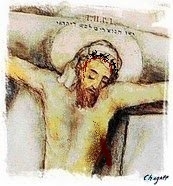
[ "Sin is in itself separation from the good, but despair over sin is separation a second time" - Soren Kierkegaard ]
05.22.23 (Sivan 2, 5783) The revelation of God in Yeshua means that Ultimate Reality -- that is, the transcendental source of all that exists -- is intensely personal, intimately knowable, and full of love. "Metaphysics" (i.e., that which is "really real") is therefore not about an impersonal force known in objective relationship (i.e., a "what") but a personal agency and creative mind known in subjective relationship (i.e., a "who"). The Scriptures teach that what is ultimately real (אהיה אשׁר אהיה) is the Ultimate Person of the LORD (אני יהוה). In Him we "live and move and have our being" (Acts 17:28).
The LORD who is the Most High, the possessor of heaven and earth, is not just the Creator and Sustainer of all possible worlds, but the Lover and Redeemer of our very souls -- the One who empties himself to become "with us" and who overcomes the sickness of death for us... The climactic expression of the character of Ultimate Reality is revealed at Golgotha, the "place of the skull," where God's sacrificial life in Yeshua destroyed death by the greater power of divine love (Psalm 85:10). The heart of our Lord as he suffered and died for our sins reveals the great compassion of God; it is "ha'makom" (הַמָּקוֹם) the place of his atonement for us; his hidden dark cloud, and his resurrection glory reveals our deliverance for death. God loves us despite knowing all of our sins and yet redeems us from its curse...
We "connect" with the truth of who God is by the instrumentality of faith, and the essential question is whether we are in a "trusting relationship" with God or not, for if we do not truly know God as our loving Savior, we remain lost, in darkness, and alienated from the life of God. Faith is self-authenticating as we experience grace in the exercise of our trust in God.
Practically speaking, our relationship with God "shows up" in our lives by means of the various choices we make, though particularly in our moral choices. That's because righteousness is "ontological," or grounded in what is real. Since God is righteous, doing acts of righteousness enables us to partake in God's life and passion (1 John 2:29). On the other hand the practice of sin deadens us and turns us away from God's Presence...
Love is essentially relational, and therefore the Scriptures reveal God as being in relationship both with others within creation, but also within himself - the One God is unity in plurality of relationship: Father, Son, and Holy Spirit (John 17:24). The "I AM" of God (Being) is also known in the "Thou Art" of God (Doing). God is not only the Eternal Lover but also the Eternal Beloved, and the bond of that love is the Spirit of God "hovering above the depths." "Draw near to me, hear this: from the beginning I have not spoken in secret, from the time anything came to be there I AM, and now the Lord GOD has sent me, and his Spirit" (Isa. 48:16). Note in this verse the transpersonal unity of the Godhead....
Now while the Torah certainly affirms that "God is one" (יהוה אחד), note that the word "one" (i.e., echad: אֶחָד) means something more than merely numerical identity (i.e., yechidut: יְחִידוּת) but instead unity in plurality, a "transcendental oneness" that points to the unfathomable mystery of the Name YHVH (יהוה) and the ineffable Godhead (אֵין סוֹף). Moreover, echad primarily means "first" in order or preeminence, for example when the Torah describes the "first day" of creation not as "yom ha'rishon" (יום ראשון), but as "yom echad" (יוֹם אחד; Gen. 1:5). That is why the Shema is not an affirmation of the "mystical pantheistic unity of all things" but rather that the LORD our God is preeminent and alone worthy of our worship and trust. "Hear, O Israel, the LORD our God is one LORD (i.e., unity of the godhead) the LORD alone (i.e., God is first, primary, central, and our greatest good). "God is love" means that he is the Lover, the Beloved, and the Communion of true love
The doctrine of the tripartite-yet-one divine nature (השילוש הקדוש) is not known apart from the revelation of Yeshua, and it is an essential part of His message of redemption to us (see John 17:3). In other words, if you believe that Yeshua embodies and reveals the "Who" of Ultimate Reality, then you will accept his teaching that God is expressed in relationship - the Son in relation to the Father and to the Holy Spirit, and that these three are "echad," or one... "The Father has borne witness of me; whoever has seen me has seen the Father" (John 5:37; 14:9); "I and the Father are one"; "before Abraham was, I am..." "who is the liar but he who denies that Yeshua is the Messiah? This is the antichrist, he who denies the Father and the Son" (1 John 2:22). Believers in the Lord are commissioned to go and make students or learners (תלמידים) of all the nations, baptizing them (i.e., identifying them) in the name of the Father, and the Son and the Holy Spirit" (Matt. 28:19).
Hebrew Lesson:
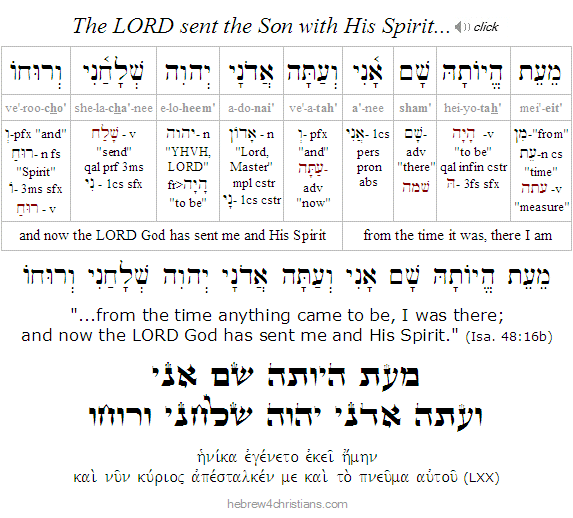 |
God's Face In Yeshua...
There are various clues given throughout Scripture about God's divine nature (Rom. 1:20). The Torah itself begins with intimations of the "One-in-the-Many" character of God. When we read, "In the beginning, God (אֱלהִים) created the heavens and the earth," we must ask who exactly is speaking? In other words, who is the divine narrator of the Torah? The next verse states that the Spirit of God (רוח אלהים) was hovering over the face of the waters, followed by the first "direct quote" of God Himself: i.e., יְהִי אוֹר: "Let there be light" (Gen. 1:2-3). The creative activity of Elohim (God) and the presence of Ruach Elohim (the Spirit of God) are therefore narrated by an omniscient Voice or Davar Elohim (the Word of God). Obviously the Spirit of God is God Himself, just as the Word of God is likewise God Himself, and consequently the very first verses of the Torah reveal the nature of the Godhead: God is One in the sense of echdut, "unity," "oneness," and so on, though not "one" in the monistic sense of a solipsistic mind (νοῦς). Indeed, a monistic idea of God (i.e., God as "absolute" oneness) is inherently self-absorbed and unable to accommodate being outside of itself. Such a god may serve as an "unmoved mover" or "first cause" of a cosmic machine, but it is not relational within itself. Indeed, there can be no sense of "person" apart from relationship, and therefore God's Personhood is as eternal as his Being.
Yeshua is the Source of all life in the universe: כָּל־הַמַּעֲשִׂים נִהְיוּ עַל־יָדוֹ / "All things were made by Him (John 1:3). The "Word made flesh" is the "image of the invisible God" and the "radiance of the glory of God and the exact imprint (χαρακτήρ, 'character') of his nature" (Col. 1:15). All of creation is being constantly upheld by the word of His power (Heb. 1:3): "All things were created by Him (i.e., Yeshua), and for Him" and in Him all things consist (συνεστηκεν, lit. "stick together") (Col. 1:16-17). As our Creator and Master of the Universe, Yeshua is both our King and our Judge, and therefore our lives center upon him... Ultimate Reality is found in the presence of Yeshua our LORD, and eternal life is found in Him alone: "For God, who said, "Let light shine out of darkness," has shone in our hearts to give the light of the knowledge of the glory of God in the face of Yeshua the Messiah" (2 Cor. 4:6). "And we all, with unveiled face, beholding the glory of the Lord, are being transformed into the same image from one degree of glory to another. For this comes from the Lord who is the Spirit" (2 Cor. 3:18).
"The grace of the Lord Yeshua the Messiah (האדון ישׁוע), and the love of God (אהבת האלהים), and the communion of the Holy Spirit (רוח הקדשׁ), be with you all" (2 Cor. 13:14).
Hebrew Lesson:
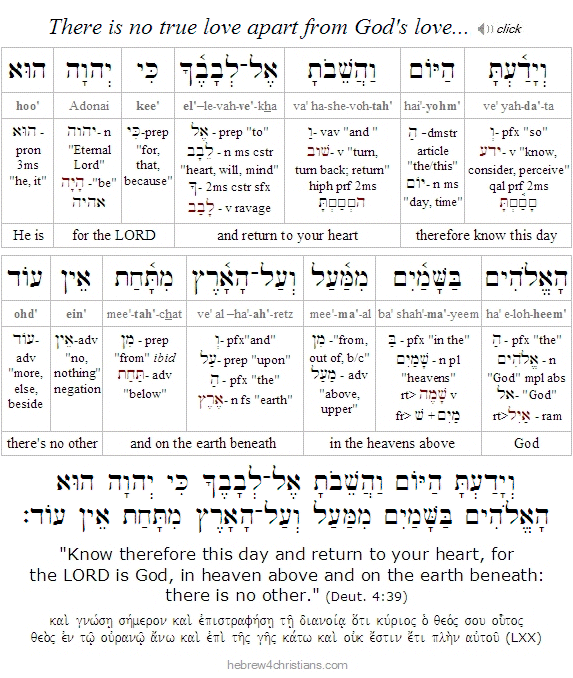 |
Finding Purity of Heart...
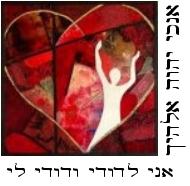
[ "Seek first God's Kingdom, that is, become like the lilies and the birds, become perfectly silent — then shall the rest be added unto you." - Kierkegaard ]
05.22.23 (Sivan 2, 5783) Some people think of "purity of heart" in moral terms, such as not looking with lust on others, not coveting, etc., though these are really symptoms of disordered love... Genuine purity is a matter of focus, making a decision to believe the miracle in order to find the "good portion" and the "one thing necessary" (Luke 10:42). We "believe to see" (Psalm 27:13). Purity of heart therefore realizes that all that you've ever longed for is found in God alone. "There is but one good; that is God. Everything else is good when it looks to Him and bad when it turns from Him" (C.S. Lewis). It is a great, great gift from heaven to know God as your heart's true desire - to fully understand that your relationship with Him is the ultimate concern and very treasure of your existence.
It is the Spirit that gives life (John 6:63). The Holy Spirit imparts the "pulse" of the Divine Life, and we gain newness of life when we trust God for purification from our sins through Yeshua our LORD. As King David further attested: Lev tahor bara li Elohim – "Create in me a clean heart, O God" and renew a spirit of 'yes' within me (Psalm 51:10). Only the new heart (lev chadash) created by the agency of God's Spirit can possibly yield the life of the Spirit within us. The miracle of a new heart transforms your whole inner nature - with the impartation of new appetites, new passions, new desires, and the rebirth of your will.
If you struggle with being inwardly divided, conflicted, or lacking in courage, ask the LORD to give you true purity of heart, a heart that wholeheartedly wills the highest... As Yeshua attested: "Blessed are the pure in heart, for they shall see God" (Matt. 5:8).
Hebrew Lesson:
Matthew 5:8 reading (click):
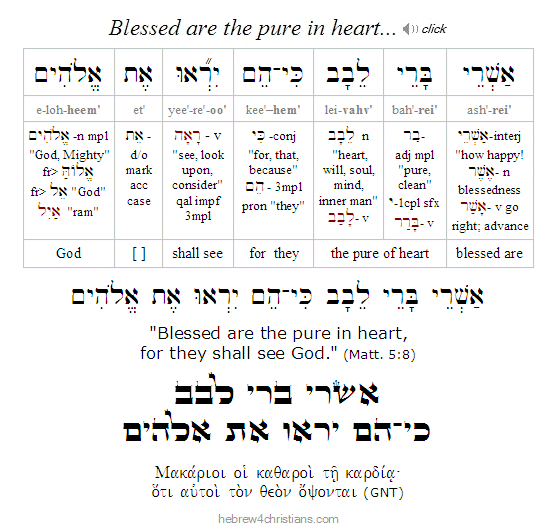 |
The Jubilee of Shavuot...

[ The Torah reading is suspended this week in honor of the holiday of Shavuot. Please see the Parashat HaShavuah for Shavuot readings... ]
05.21.23 (Sivan 1, 5783) Shalom v'chodesh tov, chaverim! Thursday, May 25th (at sundown) signals the end of the 49 days of counting the omer, and therefore the following day is the "Jubilee" of Shavuot (i.e., "Weeks" or "Pentecost"). Recall that the Torah instructed (Lev. 23:15-16) that we count from the day following Passover (i.e., Nisan 16) for exactly seven weeks, until Sivan 5 (i.e., from April 9th until May 28h this year). On the 50th day (i.e., Sivan 6), a special celebration was to be observed. This annual "countdown period" recalls both the time from the Passover until the revelation at Sinai, and the advent of the Holy Spirit (רוח הקודש) among Yeshua's disciples in Jerusalem (Acts 2:1-4).
According to the sages, the festival of Shavuot marks the culmination of the experience of redemption, sometimes called Atzeret Pesach (עצרת פסח), or the "conclusion" of Passover. Since the Exodus from Egypt was intended to lead to the revelation given at Sinai, the goal of Passover was the giving of the Torah to the Jewish people.
In other words, the LORD took the Jewish people out of Egypt so that they would be His own treasured people, holy and separated from the pagan cultures around them, living in the light of great revelation. Indeed, all of the holidays of the biblical calendar are connected with this event, including the fall festivals of Rosh Hashanah, Yom Kippur and Sukkot.
During the holiday of Shavuot, it is customary for young adults to recommit themselves to Talmud Torah (the study of Torah) and to renew their decision to live as faithful Jews. In addition to formal "confirmation ceremonies" often scheduled at synagogues, some other Shavuot customs include decorating the home and synagogue with greenery, eating dairy foods and sweets (as samples of the "milk and honey" of the promised land), and staying up the entire night of Shavuot to read selections from the Torah and from the Talmud (this custom is called tikkun leil ha'shavuot: תיקון ליל השבועות, "Rectification for Shavuot Night"). For the Messianic Jew, Shavuot is the time of celebrating the birth of kallat ha'Mashiach (כלת המשיח) - the Bride of the Messiah (or the new covenant assembly), since the fire of the Ruach HaKodesh (Holy Spirit) was poured out to the believers in Yeshua during this time.
 |
At the synagogue, it is customary to start the Shavuot evening service later than usual, to ensure that the 50th day has arrived (see "counting the omer"). As mentioned above, many people stay at the synagogue throughout the entire night listening to poems and favorite portions of Scripture, or reading from a special book (sefer tikkun leil ha'Shavuot) that includes key verses of each Torah portion and passages of each tractate of the Mishnah. This custom is observed to "repair" the night of Shavuot from the error of sleeping so soundly before the Torah was revealed at Sinai that God had to awaken the Jews with piercing shofar blasts, thunder, and lightning the following morning (Exod. 19:16).
Jewish tradition teaches be'chol dor vador (בכל דור ודור) - that in every generation each person should consider him or herself as having personally been delivered from Egypt to receive the Torah at Sinai. The climax of the Shavuot morning service is the recitation of the famous Akdamut poem followed by the reading of the Ten Commandments, when all the congregation stands to "relive" the experience at Sinai. A second Torah scroll is then taken out of the ark and the portion is read (Num. 28:26-31) that describes the sacrificial offerings made at the Temple during Shavuot, and the Haftarah (Ezek. 1:1-28; 3:12) concerns the amazing revelation of God in the form of the Throne/Chariot.
The Scroll of Ruth (מגילת רות) - a beautiful story about God's redemptive love - is traditionally read on the second day of Shavuot. As the Goel (kinsman-redeemer), Boaz was a wealthy man of the tribe of Judah (Bethlehem) who married a Gentile bride. Boaz's name means "in Him is strength," a picture of the Yeshua the Messiah, his greater Descendant, who also redeemed for himself a bride from among the nations. Among traditional Jews, the Book of Ruth is is read since the events recounted took place during the time of the spring harvest (linking it to the agricultural aspect of Shavuot), and Ruth is a picture of willing acceptance of a Jewish lifestyle (linking it to the events of Sinai).
The holiday of Shavuot is one of the shelosh regalim (שלוש רגלים) or three major "pilgrimage festivals" commanded in the Torah (see Exod. 23:14-17; Deut. 16:16) and therefore it reveals profound spiritual truth for followers of Yeshua (Luke 24:44; 2 Tim. 3:16). God did not want us to miss the significance of this holiday, since it expresses the blessed truth of the New Covenant of Zion. From my family to you: Chag Shavuot Sameach (חג שבועות שמח) - "Happy Shavuot!" May this be a time of renewal and great joy in your lives...
 |
Being Filled with His Light...
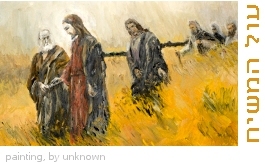
05.19.23 (Iyyar 28, 5783) Because Ultimate Reality is the Presence of the LORD, the meaning of life is found in a personal relationship with Him, that is, being in agreement with the Truth of Who God is. Sanctification, or growing in holiness, is the process of drawing near to the LORD and learning his character and will. As we are encounter the light of his truth, we will see more, and this enables us to follow him (i.e., share his heart and vision) more clearly.
May we always focus on Yeshua, the Light of Torah and the true Wisdom of God: "Whoever has My commandments (מִצְוֹתַי) and keeps them, that is the one who loves me. And the one who loves me will be loved by my Father, and I will love him and will manifest (lit., "shine within" from ἐν, "in" + φαίνω, "shine") myself to him" (John 14:21). There it is - the Source of the Light that overcomes all darkness; the Power that is behind the armor of God... Yeshua is the Beginning, the Center, and the End of all true meaning from God.
"Where your treasure is, there will be your heart also" (Matt. 6:21). Your heart, your soul, your inmost being: What you value most defines and "locates" you. We cannot not "treasure;" we cannot desire not to desire; we are inherently valuing beings. It's not a question of whether you will worship, but what you indeed are worshiping. Where is your heart? What are you seeking? Our heart, our core, our meaning is revealed by what we value most... And May God give you the grace to find true treasure!
Shabbat shalom dear friends...
The Fruit of Spirit - פרי הרוח

[ The holiday of Shavuot ("Pentecost") begins Thursday, May 25th, at sundown... ]
05.19.23 (Iyyar 28, 5783) Traditional Jewish chinuch (education) identifies various middot ha-lev (qualities of heart) that attend to a genuinely Jewish life. These include Talmud Torah (studying Scripture), ahavat Adonai (loving God), gemilut chasidim (doing works of compassion), bikkur cholim (visiting the sick), and so on. The follower of Yeshua likewise is intended to evidence middot hav-lev, though the Source for such comes directly from the power of the Ruach Ha-Kodesh (Holy Spirit) working within the heart of faith. The peirot (fruits) listed in Galatians 5:22-23 represent nine visible attributes of a true follower of Yeshua, namely: love (אהבה), joy (שׂמחה), peace (שׁלום), patience (סבלנות), generosity (נדיבות לב), kindness (חסד), loyalty (נֶאֱמָנוּת), humility (ענוה), and self-control (שְׁלִיטָה עַצְמִית).
Note that these fruits are decidedly not realized through self-effort or attempts at human "reformation," but rather are a supernatural outgrowth of the grace of God in the life of one who puts their trust in Yeshua as Savior. They are fruits "of the Spirit" (פּרי הרוח), not the result of human effort (see John 15:1-8, Mark 4:26-29). Our lives are sanctified in the manner in which they were initially justified: entirely by faith in the love and grace and power of God.
The question we must searchingly ask ourselves is whether our lives give evidence to the power and agency of the Holy Spirit within us. Strictly speaking, these nine attributes are qualities that only the LORD God Himself possesses, since He alone is perfectly loving, perfectly joyful, and so on. But since we are created be'tzelem Elohim (in the image of God) and were given the Holy Spirit to help us walk as did our Teacher (Luke 6:40), spiritual fruit should be evident in our own lives (John 14:12; 15:1-8; 26-7). But again, obtaining such fruit is invariably a matter of faith – trusting that God will help us live our lives in truthful union with Him. This is the "work of God" (John 6:28-29).
Let's remember to pray for one another and ask the LORD to make each of us fruitful le'shem shamayim - for the sake of the Name of our beloved One Yeshua.... Amen.
Hebrew Lesson
Proverbs 8:19 reading (click):
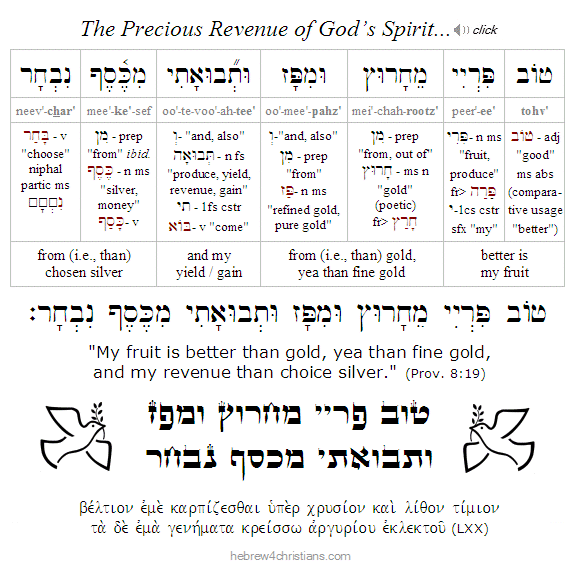 |
Giving of the Torah (מתן תורה)
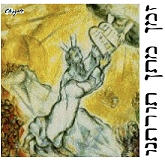
[ The holiday of Shavuot ("Pentecost") begins Thursday, May 25th, at sundown... ]
05.19.23 (Iyyar 28, 5783) During the holiday of Shavuot (i.e., "Weeks," "Pentecost") we remember how the LORD graciously condescended to meet with the Jewish people at Sinai, and how all the people heard the Voice of God (קול האלוהים) speaking from the midst of the fire (Deut. 4:33). This awesome event foreshadowed the great advent of the King and Lawgiver Himself, when the Eternal Word (דבר יהוה) became flesh to dwell with us (Phil. 2:6-7; John 1:1,14), and it further foreshadowed the advent of the Spirit of Truth given to the disciples of Messiah (Acts 2:1-4).
Any theology that regards God as entirely transcendent will have a problem with divine immanence, since the highness, holiness, and perfection of God will make him seem distant, outside of us, far away, and even unknown... Incarnational theology, on the other hand, manifests the nearness of God to disclose the divine empathy. Indeed, the LORD became Immanuel (עמנו אל), "one with us," to share our mortal condition, to know our pain, and to experience what it means to be wounded by sin, to be abandoned, alienated, forsaken.
The "Eternal made flesh" bridges the gap between the realm of Ein Sof (אין סוף), the Infinitely transcendent One, and the finite world of people lost within their sinful frailty. Of course we believe Adonai Echad (יהוה אחד) - that the "LORD is One" - both in the sense of being exalted over all things but also in the sense of being compassionately involved in all things (Rom. 11:36). During Shavuot we celebrate the giving of the Torah both at Sinai, and at Bethlehem (בית לחם), and within our hearts. We celebrate that God is indeed the King and Ruler over all, but we further affirm that God's authority and rule extends to all possible worlds - including the realm of finitude and even death itself. Amen.
כי יהוה שפטנו יהוה מחקקנו
יהוה מלכנו הוא יושיענו
kee · Adonai · shoh·fe·tei'·noo; Adonai · me·chok·kei'·noo
Adonai · mal·kei'·noo; hoo · yoh·shee·ei'·noo

"For the LORD is our Judge; the LORD is our Lawgiver;
the LORD is our King; He will save us."
(Isa. 33:22)

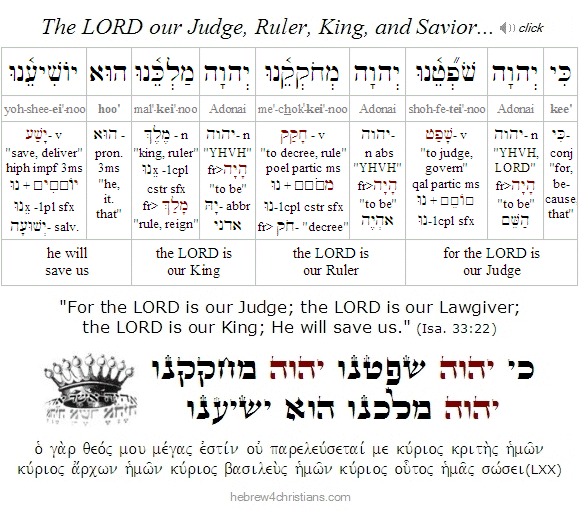
City of the Great King...
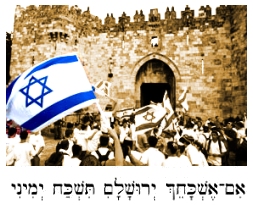
[ "Jerusalem is a port city on the shore of eternity." -Yehuda Amichai (1924-200), Israeli poet ]
05.19.23 (Iyyar 28, 5783) Dear followers of Yeshua the King, how can we forget Zion, "the city of the living God, the heavenly Jerusalem" (Heb. 12:22)? Is she not called "our mother" (Gal. 4:26)? Are we not her citizens, indeed, her exiles in this age? Indeed, Yeshua himself referred to Jerusalem the "City of the great King" (Psalm 48:2; Matt 5:35); for it is the place (המקום) where He was crucified, buried, resurrected, and ascended to heaven; and is it moreover the place where He will return to earth (Zech. 14:1-9; Acts 1:9-12).
"If I forget you, O Jerusalem, let my right hand forget its skill! Let my tongue stick to the roof of my mouth, if I do not remember you, if I do not set Jerusalem above my highest joy!" (Psalm 137:5-6). We are instructed to "pray for the peace of Jerusalem" (Psalm 126:6), but we are further told to "badger" the LORD until he makes Zion "the praise of the earth" (Isa. 62:7). יום ירושלים שמח חברים - Happy Jerusalem day, friends!
Hebrew Lesson:
Psalm 137:5 Hebrew reading:
Note: Click here to learn 25 reasons why Jerusalem matters...
Peace for Jerusalem...
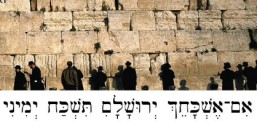
[ "If you want one simple word to symbolize all of Jewish history, that word would be 'Jerusalem.'" - Teddy Kollek (the mayor of Jerusalem from 1965 to 1993) ]
05.19.23 (Iyyar 28, 5783) Shalom chaverim! Today marks "Jerusalem Unification Day" (i.e., Yom Yerushalayim: יום ירושלים), a modern holiday that commemorates the re-unification of old city of Jerusalem on June 7th, 1967 (Iyar 28, 5727), after the stunning victory of Israel during the infamous "Six Day War" (מִלְחֶמֶת שֵׁשֶׁת הַיָּמִים). In 1968 the Chief Rabbinate of Israel declared Iyyar 28 to be a minor holiday to thank God for answering the 2,000-year-old prayer of "Next Year in Jerusalem" (בשנה הבאה בירושלים). Later, on March 23, 1998, the Israeli Knesset passed the Jerusalem Day Law, making it an annual national holiday.
Jerusalem is central to the Jewish heart. As I mentioned earlier this week, the Hebrew word "Zion" (ציון) is mentioned over 160 times in the Scriptures. That's more than the words faith, hope, love, and countless other key words... And since Zion is a poetic form of the word Jerusalem (ירושלים), the number of occurrences swells to nearly 1,000! Since it's the most frequently occurring place name in all the Scriptures, it's no overstatement to say that God Himself is a Zionist.... "Out of Zion, the perfection of beauty, God shines forth" (Psalm 50:2). "The LORD loves the gates of Zion more than all the dwellings of Jacob. Glorious things are said of you, O City of God" (Psalm 87:2-3). Indeed, Yeshua our Savior called Jerusalem the "City of the great King" (Psalm 48:2; Matt 5:35): It is the place (המקום) where He was crucified, buried, resurrected, and ascended to heaven; and is it furthermore the place where He will return to earth (Zech. 14:1-9).
In Psalm 122:6 it is written, "Pray for the peace of Jerusalem," a phrase that reveals prophetic truth about our Savior and Messiah. The word sha'alu (שאלו) means "you ask" (as in ask a sheilah, a question), shalom (שׁלוֹם) is the name of Yeshua, the Prince of Peace (i.e., Sar Shalom: שר־שלום), and Jerusalem means "the teaching of peace" (Jeru- comes from the same root as the word Torah [ירה], which means "teaching"). The phrase sha'alu shelom Yerushalayim can therefore be construed, "ask about the Prince of Peace and His Teaching." Amen. Yeshua the Messiah is indeed the rightful King of Jerusalem (Matt. 5:35) who is coming soon to establish Zion and to reign over all the earth.
שַׁאֲלוּ שְׁלוֹם יְרוּשָׁלָםִ
יִשְׁלָיוּ אהֲבָיִךְ
sha·a·loo · she·lohm · ye·roo·shah·lah'·yeem
yeesh·lah'·yoo · oh·ha·vah'·yeekh

"Pray for the peace of Jerusalem;
May those who love her be at peace" (Psalm 122:6).
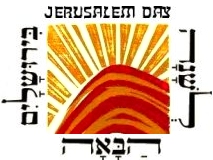
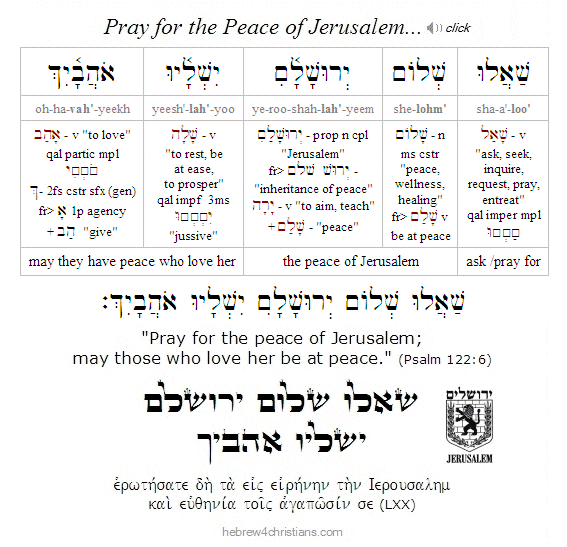
Assured by Love's Promise...
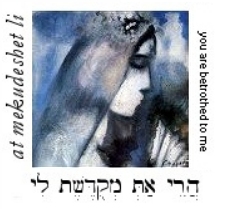
[ "Grace is not looking for good men whom it may approve, for it is not grace but mere justice to approve goodness. [Rather] it is looking for condemned, guilty, speechless and helpless men whom it may save, sanctify and glorify." - C. I. Scofield ]
05.19.23 (Iyyar 28, 5783) Right now, as you are seeing this, take a moment to reaffirm that the Lord Yeshua is your deliverer and that you trust in Him for eternal life. He promises the trusting heart: "I tell you the solemn truth, the one who hears my message and believes in the One who sent me has (i.e., present active indicative) eternal life and will not be condemned, but has passed over (literally, "crossed over") from death to life" (John 5:24). Note that the verb translated "has passed over" is "perfect active" that expresses completed action: "this one has already crossed over from death to life." In other words, the gift of eternal life is an accomplished reality (though it is only experienced as we truly surrender to the love and grace of God from a heart of faith). The "basis" of life is now radically new and of a different order. As the apostle Paul later summarized: "For it is by grace you have been saved (i.e., a perfect passive participle that denotes completed action done on your behalf with effects that continue to the present) through faith, and this is not from yourselves, it is the gift of God, not a result of works, so that no one may boast" (Eph. 2:9-10). I'm so glad it's not the strength of my grip that keeps me holding on to God, but the strength of His...
So "be strong and of good courage" – chazak ve'ematz! The Lord our God promises "never to leave you nor forsake you" and to be with you wherever you go (see Josh. 1:5,9; Heb. 13:5, Psalm 139; Matt. 28:20). In the Greek New Testament, the wording of Hebrews 13:5 is highly emphatic: Οὐ μή σε ἀνῶ, οὐδ᾽ οὐ μή σε ἐγκαταλείπω: "Not ever will I give up on you; no, not ever will I leave you behind." Alevai! May you hear the voice of the Good Shepherd calling you, and may He forever keep you under His watchful care. Amen.
Hebrew Lesson
Jer. 31:3b Hebrew reading (click):
Accounted by God...
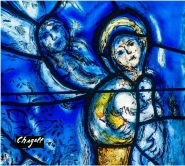
05.18.23 (Iyyar 27, 5783) Our Torah reading this week, parashat Bamidbar (פרשת במדבר), is always read just before the holiday of Shavuot (i.e., "Pentecost"), which is the time we celebrate "mattan Torah" (מתן תורה) -- the giving of the Torah of the LORD (first at Mount Sinai, and then later at Mount Zion). The reading begins: "The LORD spoke to Moses in the desert of Sinai... saying 'Lift up the head' (i.e., count) of the children of Israel (Num. 1:1-2).
Central to Sefer Bamidbar, or the Book of Numbers, is the counting of the person, identifying his "place" within the chosen vessel of Israel (Num. 1:52), and therefore the traditional sages link the idea of being counted by God with the giving of the revelation itself. In other words, as we come to know who we are as God's redeemed people, as we learn to reckon ourselves as his beloved, so we will receive Torah and be accounted among his people. Our heads will then be "lifted up," and we will receive the very first blessing of the Torah, namely: אנכי יהוה אלהיך - "I AM the LORD your (singular) God" (Exod. 20:2).
"The LORD spoke to Moses in the desert of Sinai... saying 'Lift up the head' (i.e., count) of the children of Israel (Num. 1:1-2). The Torah commentator Rashi insightfully noted that as we are counted, so we are lifted up and beheld by God. In other words your life matters to heaven, and you are counted worthy because of God's great redeeming love. The sages say that each of us is as a letter of Torah; each of us counts in God's book. Indeed our beloved Savior Yeshua said, "Even the hairs on your head are numbered" (Matt. 10:30).
May you lift up your head and be counted as one of God's own, friend....
Hebrew Lesson
Exodus 20:2 Hebrew reading:
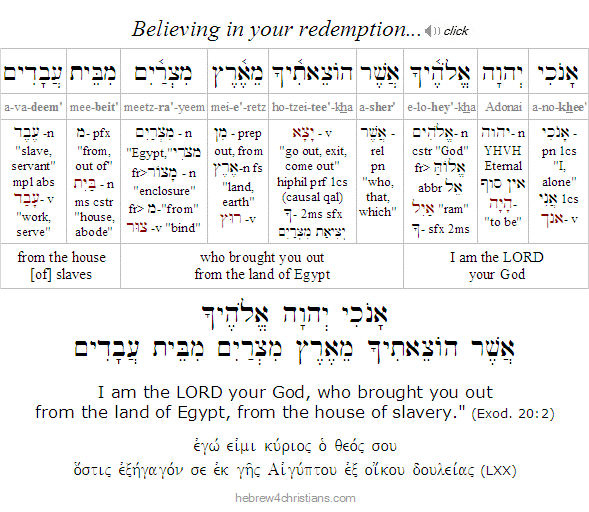 |
Your Ultimate Concern...
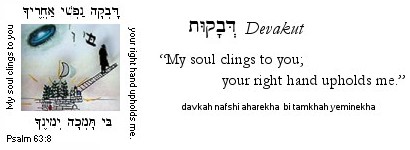
[ "The sin underneath all our sins is to believe the lie that we cannot trust the love and grace of Christ and must take matters into our own hands..." - Martin Luther ]
05.18.23 (Iyyar 27, 5783) Is the Lord the "ultimate concern" of your life? Do you esteem Him as your greatest good? "And now brothers, I will ask you a terrible question, and God knows I ask it also of myself. Is the truth beyond all truths, beyond the stars, just this: that to live without him is the real death, that to die with him the only life?" (Buechner).
Look, there is "theology" and then there is the passion of living out your faith. Theology offers up the "right answers" while living by faith raises unanswered questions. Theology is cognitive; trust is a matter of the will and of the heart. People who live up in their heads often forget their hearts. From a "legalistic" point of view Job was wrong to have argued with God; Moses was wrong to have despaired over his mission; Jeremiah was wrong to have cursed the day of his birth; David was wrong to have cried out for justice over his enemies, and John the Baptist was wrong to have doubted the identity of Messiah, to mention just a few instances where we see that passion, hunger and thirst, overruled the doctrines taught in our theology books.
Despite all this, however, faith refuses to let go of the hope that God is source, sustenance, and end of all that matters for your life... "Whom have I in heaven but you? and there is nothing on earth I desire beside you. My flesh and my heart fail, but God is the strength of my heart and my portion forever." Note the paradox implied in this utterance of faith: Even though my flesh and my heart fail, God is the strength of my heart and my portion forever. Even though everything dissipates around me, yea, my very heart and flesh, yet I find strength in God and trust that he will fulfill my heart's deepest desire (Job 14:14).
Hebrew Lesson
Psalm 73:25-26 Hebrew reading (click for audio):
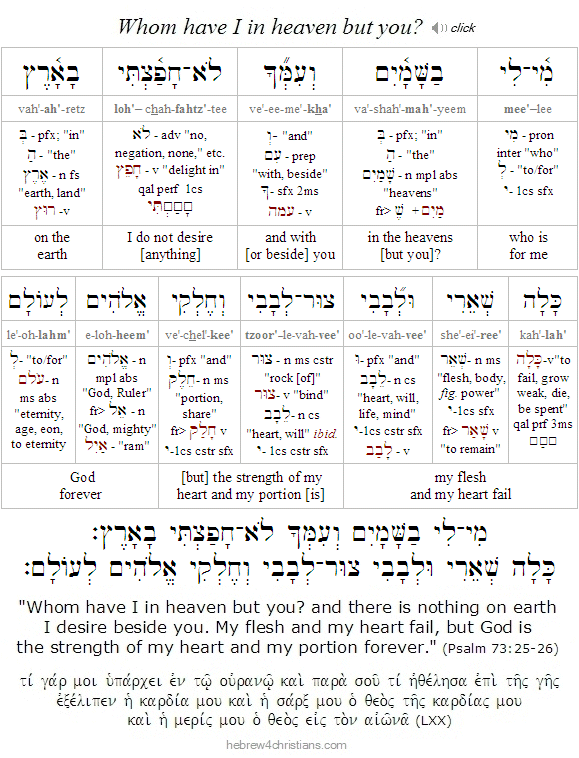 |
Mem B'Omer:
The Ascension of Yeshua...
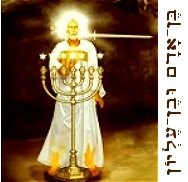
05.17.23 (Iyyar 26, 5783) We are in the midst of the 49 day "countdown" that runs from the day following the Passover until the day before the holiday of Shavuot ("Weeks" or "Pentecost"). This seven week period is called "Counting the Omer" (ספירת העומר) in the Torah (Lev. 23:15-16). During the Temple period, on each of these days an appointed priest would wave a sheaf (omer) of barley before the LORD as a symbolic gesture of dedicating the coming harvest to Him. This ceremony was called tenufat ha-omer ("waving of the sheaf"). On the 50th day, however, a sample of the first crop of the wheat harvest was baked into two loaves of leavened bread (called "Shtei Ha-Lechem," שׁתי הלחם) and waved before the altar as the climactic rite of the season (Lev. 23:15-20). Notice that this was the only time that otherwise forbidden leaven was used by the priests for the avodah (see Lev. 2:11).
 |
The 49 days between Passover and Shavuot forms a "chain" that links the two festivals together, and indeed Shavuot is regarded as the culmination of the experience of redemption, sometimes called Atzaret Pesach (עצרת פסח), or the "Conclusion of Passover." Just as the redemption by the blood of the lamb led to Israel's deliverance and the giving of the Torah at Sinai, so the redemption by the blood of Yeshua led to the world's deliverance and the giving of the Holy Spirit at Zion... And just as the covenant at Sinai created the nation of Israel, so the covenant at Zion created the worldwide people of God, redeemed from "every tribe and tongue" (Rev. 5:9). The waving of the "two loaves" of leavened bread therefore prophesied the creation of the "one new man," both Jew and Gentile, that would "firstfruits" of the Kingdom of God. In the Sovereign plan of God Almighty, ultimately there would be one flock, and one Shepherd for all God's children (John 10:16).
Since the resurrection of Yeshua occurred during the first day of the omer (i.e., on Yom HaBikkurm), and the Holy Spirit was given to the disciples 50 days later on Shavuot (Pentecost), all of Yeshua's post-resurrection appearances occurred during the days of the Omer count. Some of these appearances were as follows: On the first day of the Omer, Yeshua appeared to Mary Magdalene (Mark 16:9; John 20:16-18), some other women (Matt. 28:5-10), and then to Simon Peter (Luke 24:34; 1 Cor. 15:5). On the second day, He appeared to the two on the Road to Emmaus (Luke 24:13-32) and later that evening to the twelve disciples (Mark 16:14; Luke 24:33-39; John 20:19). A week later, He appeared to the Twelve again (John 20:26) and eight days later appeared to Thomas (John 20:24-29). Some time later, He appeared the third time to the disciples as they went back to their fishing jobs (John 21:1-14). Sometime later Yeshua appeared to 500 (1 Cor. 15:6) and then to James, the half-brother of our Lord Yeshua (1 Cor. 15:7). On Iyyar 25, or the 40th day of the Omer (called Mem B'Omer: מ"ם בעומר), Yeshua ascended into heaven from Bethany and commanded His followers not to leave Jerusalem until the promise of the Father was fulfilled during Shavuot (Luke 24:44-53; Acts 1:9-11; Eph. 4:8).
The ascension of Yeshua (עליית ישוע) was foreshadowed by Moses and the receiving of the Torah at Sinai: Just as Moses had waited 40 days before the Torah was given to Israel, so the disciples waited 40 days before the promise of the Holy Spirit was given (Exod. 24:18; John 16:7, Acts 2:1-4). In both cases, at the appointed time revelation was given -- first in the form of "the Voice of the Living God speaking from the midst of the fire" at Sinai (Deut. 5:26), and later in the form of "tongues of fire" given in glory and power. Yeshua's Voice is now heard from the midst of the fire given at Zion...
Hebrew Lesson
Psalm 47:5 reading (click):
Why the Ascension Matters...
- The ascension of Yeshua (i.e., aliyat Yeshua: עליית ישוע) demonstrates that he is now seated at the right hand of God (יושב לימינו של אלוהים), ever making intercession for his people based on his resurrection victory over the power of sin and death (Mark 16:19; Eph. 1:20; Rom. 8:34; Heb. 1:1-3; Heb. 7:25; Heb. 9:24; Col. 3:1). Yeshua is the Ascended LORD (אֵל עֶלְיוֹן) and the great High Priest (הכהן הגדול הגדול) of the New Covenant. His ascension to heaven indicates his role as the Mediator between mankind and God (מֵתוֹוֵךְ בֵּין אלהים אֱנוֹשׁוּת). Some people ask where Yeshua is today. The ascension answers that question: He is presently in heaven making intercession for those who are trusting in Him, and he is also giving humanity further time to turn to him for life before he returns to earth to judge the world in fulfillment of his promise.
- The ascension moreover reveals the success of Yeshua's earthly ministry as the Redeemer of humanity. Everything that Yeshua had come to do he had accomplished, and the ascension signifies the perfection of his victorious redemption. He finished the work that the Father send him to do. Upon His ascension, Yeshua sent the Holy Spirit (רוּחַ הַקּדֶשׁ), the "Comforter" or "Advocate" (παράκλητος), who would give them counsel and guidance until He returns for his people (John 16:7).
- The ascension of Yeshua establishes his everlasting enthronement as the one and only King of Glory (מֶלֶךְ הַכָּבוֹד). His dominion is forever established as "an everlasting dominion, which shall not pass away, and his kingdom one that shall not be destroyed" (Dan. 7:13-14; Rev. 5:6-13). God's moral authority is eternally sure.
- The ascension of our Lord Yeshua foreshadows the final event in salvation history: Yeshua's personal, physical, glorious return (Acts 1:11). This is what we ask for when we pray, "Thy kingdom come, Thy will be done, on earth as it is in heaven" (Matt. 6:10). El Elyon (אֵל עֶלְיוֹן), the Ascended God, will return as the true Judge and King over all the earth. He will establish universal justice, end suffering, and destroy the power of death as he sets up the promised Kingdom of Zion (מַמְלֶכֶת צִיּוֹן) in fulfillment of the words of the Hebrew prophets. Yeshua is coming to vindicate Israel and to heal the nations by establishing truth, righteousness and love in the world. Amen.
- The resurrection and ascension make us "alive together" with the Messiah. Because of Yeshua, we are able to live on a different level of reality, free from the "law of sin and death" (Rom. 7:4, 8:2). We now have a new and living relationship with God - based on the freedom and intimate revelation given by the Holy Spirit - all because of our ascended Lord Yeshua, blessed be He.
- Yeshua told His followers that it was good that he would leave them, so that the Holy Spirit (רוּחַ הַקּדֶשׁ), the "Comforter" or "Advocate" (παράκλητος), would be given to them. "But I tell you the truth, it is for your advantage that I am going away. For if I do not go away, the Advocate (ὁ παράκλητος) will not come to you, but if I go, I will send him to you" (John 16:7). Notice that the word translated as "advantage" here is the Greek word συμφέρω (from σύν, "with" and φέρω, "to carry"), which suggests that we would be given power that "carries us" with the Lord during the trials of this life... Bo, Ruach Elohim: "Come, Holy Spirit...
Hebrew Lesson:
Psalm 110:1 reading (click):
God will Save Zion....

[ Yom Yerushalayim, or "Jerusalem Day," begins Thursday May 18th at sundown this year... ]
05.17.23 (Iyyar 26, 5783) THE WORD "ZION" (צִיּוֹן) is mentioned over 160 times in the Scriptures. That's more than the words faith, hope, love, and countless others... And since Zion is a poetic form of the word Jerusalem, the number of occurrences swells to nearly 1,000! Since it's the most frequently occurring place name in all the Scriptures, it's no overstatement to say that God Himself is a Zionist.... "Out of Zion, the perfection of beauty, God shines forth" (Psalm 50:2). "The LORD loves the gates of Zion more than all the dwellings of Jacob. Glorious things are said of you, O City of God" (Psalm 87:2-3).
Tragically, many of today's church leaders regard the ideal of Zion and its great hope as something "quaint," perhaps even a little bit naive. Many of today's Evangelical teachers, for example, seem to regard the reestablishment of the modern State of Israel as an historical accident, without any theological significance. They do not regard the Jewish people's regathering to their ancient homeland as a miracle, nor do they regard it as a sign that we are beginning to see the prophesied period known as acharit hayamim – "the End of Days" (Deut. 28:64; 30:3-5).
Ultimately how you undestand the meaning of "Israel" and "Zion"
will affect ALL other areas of your theology...
Zion represents the rule and reign of God in the earth and is therefore synonymous with the Kingdom of God. The entire redemptive plan of God – including the coming of the Messiah Himself and our very salvation – is wrapped up in it (1 Pet. 2:6). It is the "historiography" of God – His philosophy of history, if you will. And this perhaps explains why the world system (and its agency, the devil) routinely mischaracterizes and condemns "Zionism" as a form of racism or injustice.
Friends, how can we forget Zion, "the city of the living God, the heavenly Jerusalem" (Heb. 12:22)? Is she not "our mother" (Gal. 4:26)? Are we not her citizens, indeed, her exiles in this age? As the psalmist said, "If I forget you, O Jerusalem, let my right hand forget its skill! Let my tongue stick to the roof of my mouth, if I do not remember you, if I do not set Jerusalem above my highest joy!" (Psalm 137:5-6). Of course we are instructed to "pray for the peace of Jerusalem" (Psalm 122:6), but we are further told to "badger" the LORD until he makes Zion "the praise of the earth" (Isa. 62:7).
God loves Zion since it symbolizes His redemptive program in human history. In a sense, Zion is the heart of the Gospel message and the focal point of God's salvation in this world. "For Zion's sake I will not keep silent, for Jerusalem's sake I will not remain quiet, till her righteousness shines out like the dawn, her salvation like a blazing torch" (Isa. 62:1). Zion represents our eschatological future – our home in olam haba (the world to come). Even the new heavens and earth will be called Jerusalem – Zion in her perfection (Rev. 21).
Yeshua called Jerusalem the "City of the great King" (Psalm 48:2; Matt 5:35). It is the place where He was crucified, buried, resurrected, and from whence He ascended to heaven. It is also the birthplace of kehilat Mashiach (i.e., the "church") and the aim of human history. One day (soon) Yeshua will physically return to Zion as Mashiach ben David to restore the throne in the City of David. At that time, all the New Covenant promises given to ethnic Israel will be literally fulfilled as the Kingdom of God is manifest upon the earth (Luke 1:32-33; Zech. 8:3, 12:10-14; Micah 4:2-4; Rev. 20:2-6). May His kingdom come speedily, and in our day. Amen.
Hebrew Lesson
Psalm 69:35 reading (click for audio):
Inner Transformation...

05.16.23 (Iyyar 25, 5783) The fact that God knows the number of hairs on your head is just to say that he knows you better than you know yourself... Your heavenly Father "sees in secret," and that also means that he can and will save you from whatever is hidden within you that still resists his love and touch... We have to trust in God's power to heal us, even when it seems that healing is not forthcoming, even when we still find ourselves divided, troubled, and anxious. We have to believe that God's help is always present. "Be strong, and let your heart take courage, all you who hope for the LORD."
God sees what He does within us, His "it-is-finished" work, the effect of His great salvation within our hearts, even if at this present hour this may be hidden from our eyes... There is appearance, and there is reality; and only God sees what is ultimately real. We have to trust in His promise to be transformed into the divine nature, even if today we find ourselves sinful, needy, and in disrepair... By God's grace we are what we are. So don't give up. We are saved by hope (ἐλπίδι ἐσώθημεν, Rom. 8:24), a hope for you today.
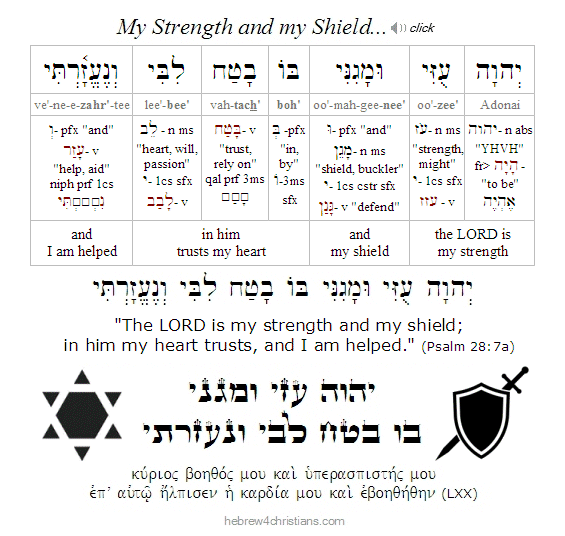 |
Narrow Gate of Despair...

05.16.23 (Iyyar 25, 5783) There is a great danger today of fearing the wrong things, and despairing over that which trivial in light of eternity. However honest despair is a gift from God, if it is received as a message to take heed of what is most important. "And this is the simple truth - that to live is to feel oneself lost. He who accepts it has already begun to find himself, to be on firm ground. Instinctively, as do the shipwrecked, he will look around for something to which to cling, and that tragic, ruthless glance, absolutely sincere, because it is a question of his salvation, will cause him to bring order into the chaos of his life. These are the only genuine ideas; the ideas of the shipwrecked. All the rest is rhetoric, posturing, farce" (Kierkegaard). Like Jonah we first must be "swallowed up" in consciousness of our own hopelessness before we realize that we are without remedy apart from God's intervention and deliverance. We start there - in the "belly of the fish" - and later are brought forth by God's mercy and grace. This is the place of the cross, the "narrow gate" that leads to life. As we look to Yeshua, as we lean on him, he reveals more of himself to us.
Hebrew Lesson:
Psalm 86:13 Hebrew Reading (click):
Hillel the Elder had said, "If I am not for myself then who will be for me? (אם אין אני לי מי לי); But if I am only for myself, what am I? And if not now, when?" (Avot 1:14). Hillel points out here that the language of "I am" (אָנִי) and "for me" (לִי) reveals that we have a relationship with ourselves that must be sanctified and ordered before God. As Soren Kierkegaard once wrote: "The self is a relation which relates itself to its own self," that is, the self is always in a state of dialog. A healed self relates itself to God as the Ground of existence, since otherwise irremediable despair will result, eternal lostness within, an everlasting sickness of soul...
The remedy for being a lost self, relating only to itself without any center or ground, is to turn to God and to find your place in God's love and blessing. As we come to believe that we are accepted and loved despite our many imperfections, inadequacies, and character defects, we find courage to accept ourselves, to "let go" in trust. As Yeshua said, "whoever does not receive the kingdom of God like a child shall not enter it" (Luke 18:17).
What We Value Most...
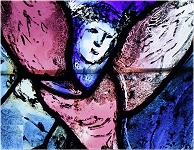
05.16.23 (Iyyar 25, 5783) What we fear says a lot about us, since fear is closely linked to what we value and ultimately worship... The Spirit attests that all the world is lit up with the radiance of God our Savior: קָדוֹשׁ קָדוֹשׁ קָדוֹשׁ יְהוָה צְבָא֑וֹת מְלא כָל־הָאָרֶץ כְּבוֹדוֹ - "Holy, holy, holy, is the LORD of hosts: the whole earth is full of his glory" (Isa. 6:3). Fearing lesser things blinds us to the truth of Reality and glorifies the realm of darkness. The world system is based on slavery to such lesser gods and fears, but we are to walk in the awe of the LORD God Almighty alone, and the light of his reverence overcomes the fear of this world. As the Gerer Rebbe said: "If a man has fear of anything except the Creator, he is in some degree an idolater. For to fear is to offer worship to the thing feared, and this form of worship may be offered only to the LORD." As it is written: "It is the LORD your God whom you shall fear.
Him you shall serve and by his name you shall swear. You shall not go after other gods, the gods of the peoples who are around you for the LORD your God in your midst is a jealous God" (Deut. 6:13-15).
The fear of the Lord, yirat HaShem, is reverent awe and wonder that resembles the great trembling of love: "With this ring I do worship thee..." The Scriptures repeatedly state that this fear is reishit chockmah (רֵאשִׁית חָכְמָה) – the "beginning of wisdom" and the foundation of all true godliness and obedience.... Sin always entices us to fear the "lesser gods"; it seduces us to live in arrogance, pride, anger, envy, lust, despair, and so on. Sin expresses the opposite of godly reverence and seeks to justify cowardly indolence so that people learn to actually "love" and defend what enslaves them...
Fearing lesser gods is an affront to the glory and majesty of our Savior. We are commanded to be full of courage given by God's own spirit: It is the Lord who goes before you. He will be with you; he will not leave you or forsake you. Do not fear or be dismayed" (Deut. 31:8). "Have I not commanded you? Be strong and courageous. Do not be frightened, and do not be dismayed, for the Lord your God is with you wherever you go" (Josh. 1:9).
The fear of the LORD expresses the power of faith to repel the schemes and designs of the devil. Then Jesus said to him, "Be gone, Satan! For it is written, 'You shall worship the Lord your God and him only shall you serve'" (Matt. 4:10). "Submit yourselves therefore to God. Resist the devil, and he will flee from you" (James 4:7). Ultimately, the fear of the LORD is a great gift, the underlying motive of all true teshuvah (repentance).
When the people heard the Voice of the LORD thunder at Sinai, they drew back in fear and appealed to Moses to be their mediator: "You speak with us and we will listen, but let not God speak with us, for we might die" (Exod. 20:19). Moses replied, "Do not be afraid, for God came in this way to test you and in order that His fear should remain before you, so that you do not sin" (Exod. 20:20). The point of fearing God, then, is to keep us from what separates us from the love of God. The Kotzker Rebbe commented: "When Moses exhorted the people not to be afraid, he meant that the fear "for we might die" was not what God wants from us. Rather, God desires that the fear of Him should remain before you so that you do not sin. That is the only true fear of heaven." The "fear of the LORD" is that we might lose sight of what we really need for life...
Hebrew Lesson
Proverbs 1:7 Hebrew reading:
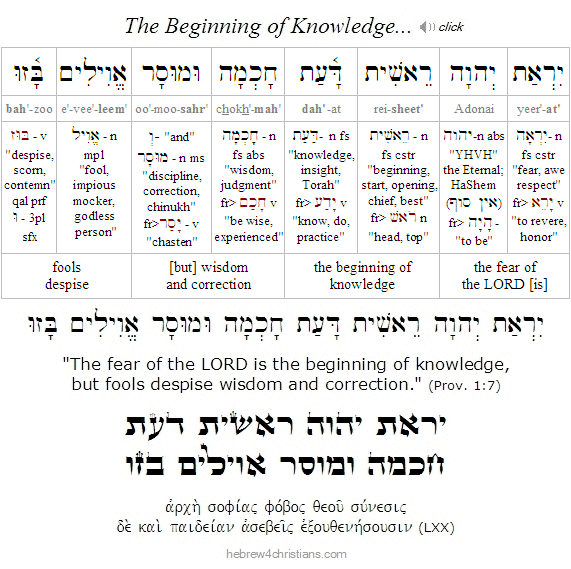 |
The Great War for your Soul...
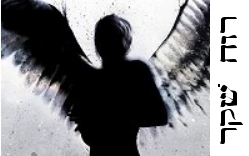
[ "For our struggle is against spiritual forces of evil..." Eph. 6:12 ]
05.15.23 (Iyyar 24, 5783) Ultimately we are living in the midst of a great spiritual war -- the war for truth. This has been the battle from the beginning. The very first recorded words of Satan (הַנָּחָשׁ) questioned God's truth: "Did God really say...?" (Gen. 3:1). In the end there will be found two types of people: those who love the truth and those who love the lie. These are the children of light (בְּנֵי הָאוֹר) and the children of darkness (בְּנֵי הַחשֶׁךְ), respectively. Followers of Yeshua the Messiah are told to "walk as children of light" / ὡς τέκνα φωτὸς περιπατεῖτε (Eph. 5:8). The children of light are called to be am kadosh - a holy people - separate from the evil engendered by the fallen world and its forces, just as the very first creative expression of God was the separation of light from darkness (Gen. 1:3-4). The children of light "hate evil and love the good," and conversely, the children of darkness "hate the good and love evil" (Psalm 34:21, Prov. 8:13, Amos 5:15, John 3:20-21). Regarding the heavenly Zion to come, it is written: "nothing unclean will ever enter into it, nor anyone who does what is detestable or practices falsehood (lit. "makes a lie"), but only those whose names are written in the Lamb's book of life" (Rev. 21:27).
We must stand for the truth, because the truth is what sets us free (John 8:32). As Yeshua said, "For this purpose I was born and for this purpose I have come into the world -- to testify to the truth. Everyone who is of the truth listens to my voice" (John 18:37). We must turn away from the lie to embrace the truth. One day all that is hidden will become manifest. "As I looked, thrones were placed, and the Ancient of Days took his seat; his clothing was white as snow, and the hair of his head like pure wool; His throne was ablaze with fire and its wheels were all aflame. A river of fire was streaming forth and proceeding from his presence; a thousand thousands served him, and ten thousand times ten thousand stood before him; court sat in judgment, the books were opened" (Dan. 7:9-10).
If the devil can't kill you, he will try to make you insane... He will lie to you about who you really are; he will attempt harass you and vex your soul. He will whisper fearful things in your ear... He will make what is small seem big and what is big seem small. He will raise dark suspicion within your soul, causing you to walk in mistrust. He will remind you of your sins to make you feel ashamed and dirty. He will hiss that you are unlovable and unworthy. He will argue on behalf of your flesh that you deserve better than this... He will tempt you to seek relief in cisterns of emptiness and futility. Most of all, he will try to cast a spell to make you forget that you are truly a prince or princess of God Almighty... The devil seeks to drive you into the exile of loneliness and despair. Resist him in the Name of the LORD!
Fret not, therefore, because of evil doers, for they shall soon wither away (Psalm 37). The Great Accounting is coming: "For there is nothing created that is hidden - אין יצור נסתר - but all things are naked and open to the eyes of the One to whom we must render an account" (Heb. 4:13). Every thoughtless word shall be accounted for in the Day of Judgment to come (see Matt. 12:35-37). Recompense is indeed coming, though it is reserved for the LORD God alone, who is ha'shofet ha'tzaddik (השופט הצדיק) - the Righteous Judge (Psalm 7:11). "According to their deeds, accordingly He will repay, fury to His adversaries, recompense to His enemies; to the coastlands He will repay recompense" (Isa. 59:18).
Hebrew Lesson
Proverbs 28:1 reading (click):
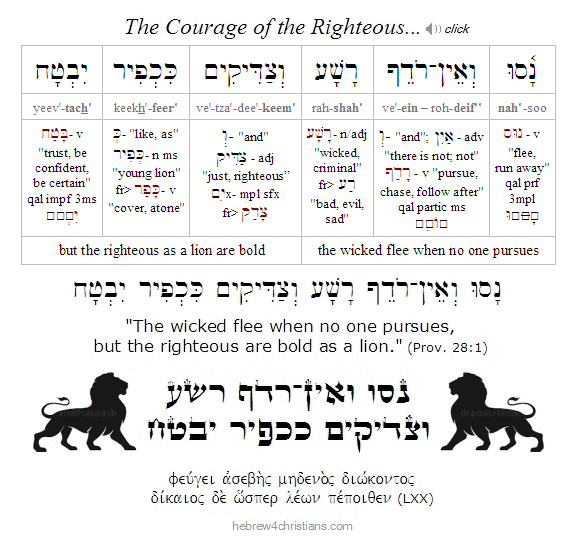 |
Prelude to the Desert...
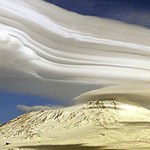
[ The following provides a brief overview or survey of the Torah as a sort of "prelude" to our study of the Book of Numbers... I hope you will find it helpful, chaverim. ]
05.15.23 (Iyyar 24, 5783) The Book of Genesis (i.e., Sefer Bereshit [סֵפֶר בְּרֵאשִׁית]) describes the creation of the world, the transgression of Adam and Eve, the promise of the coming Savior, and the subsequent lapse of the human race into godlessness and depravity. The wicked generations of Cain caused the world to be entirely steeped in anarchy and bloodlust, so that "every intention of the thoughts of man's heart was only evil continually." After ten generations, the LORD "had enough" and destroyed the human race by means of the great flood. Only Noah and his immediate family were spared. Noah had three sons, of whom God chose Shem to be the high priest of the remnant of the human race. From Shem's line would ultimately come Abraham, the father of the Jewish people. Of course Abraham had a son named Isaac, and Isaac later had a son named Jacob. From Jacob (who was renamed "Israel") were born twelve sons, each of whom became patriarchs of the twelve tribes of Israel. Jacob's treasured son Joseph, however, was sold into slavery by his envious brothers, but later God promoted him to great power in the land of Egypt. The Book of Genesis ends with Joseph's dramatic reconciliation with his family, who then emigrated to Egypt to escape a devastating famine in the land of Canaan. Before his death, Jacob blessed his sons and confirmed the coming of the Savior through the tribe of Judah.
The Book of Exodus (i.e., Sefer Shemot [סֵפֶר שְׁמוֹת]) describes how the family of Jacob (i.e., the twelve tribes of Israel) multiplied into a great nation while dwelling in the land Egypt. Eventually, however, the Egyptians came to regard these "outsiders" as a political threat and convinced the Pharaoh to enslave and to grievously oppress them. The book describes how God intervened on behalf of Israel and chose Moses (and Aaron) to confront the Pharaoh and to demand that the Israelites be set free. Pharaoh refused Moses' repeated appeals, however, despite plagues of warning visited upon the Egyptians. As a final act of judgment, God instituted the Passover and killed all the firstborn sons of the land of Egypt. Moses and the Israelites then fled from Egypt, crossing the Red Sea into the Midian desert as directed by the Pillar of Cloud and Fire. When the people finally convened at Mount Sinai 49 days later, they received the Ten Commandments, and Moses was called up the mountain to receive the vision of the Tabernacle. While Moses was on the mountain, however, the Israelites forged a Golden Calf and worshipped it, and God threatened to destroy the people. Moses successfully interceded on their behalf, however, and after a period of national teshuvah (repentance), the covenant was renewed. The remainder of the book describes the architectural details and the construction of the Tabernacle, which was finally assembled and consecrated a year after the Exodus from Egypt (i.e., on Nisan 1). The Book of Exodus ends with the Shekhinah Glory of the LORD filling the newly built sanctuary: "For the cloud of the LORD was on the Tabernacle by day, and fire was in it by night, in the sight of all the house of Israel throughout all their journeys."
Moses' brother Aaron had been selected to be the first High Priest of the Jewish people, and Aaron's sons were designated as Israel's priests. Since the Tabernacle was intended to symbolize God's Presence among the people, Moses undoubtedly instructed Aaron and his sons (along with the other Levites) about their forthcoming responsibilities. The Book of Leviticus (i.e., Sefer Vayikra [סֵפֶר וַיִּקְרָא]) is therefore called Torat Kohanim - the Law of the Priests - since it deals largely with the service of the priests in the Tabernacle (the book was probably originally written during the six months when the Tabernacle and its furnishings were being made). The laws of sacrificial offerings are therefore detailed, as well dietary laws, laws regarding purity and impurity, and specific rituals for purifying the sanctuary. Throughout the book the holiness of God is stressed, with the corresponding duty for the priests and the people to be holy themselves. Apart from the narrative concerning the days of the Tabernacle's consecration (i.e., the death of Aaron's sons), the book itself is somewhat "timeless," with an emphasis on the need for blood atonement and sacrificial rituals to draw near to God. The Book ends with a list of blessings for obedience and curses for disobedience to God's law.
Although it appears after the Book of Leviticus in the Torah scroll, the Book of Numbers (i.e., Sefer Bemidbar [סֵפֶר בְּמִדְבַּר]) picks up precisely where the Book of Exodus left off, with the Glory of the LORD hovering over Tabernacle as the Israelites camped at Sinai. The book opens: "The LORD spoke to Moses in the desert of Sinai, in the tent of meeting, on the first day of the second month, in the second year after they had come out of the land of Egypt, saying, take a census of all the congregation of the people of Israel, by clans, by fathers' houses, according to the number of names, every male, head by head" (Num. 1:1-2). After the adult men were counted (the result of 603,550 is identical to earlier number in the Book of Exodus (cp. Num. 1:45-46; Exod. 38:26-27)) - the tribes were meticulously arranged into military camp formation around the Tabernacle. It should be noted, however, that the narrative in the book is not presented in entirely chronological order, since later it is stated that Israel celebrated the Passover before this census was taken (cp. Num. 1:1-2; 9:1-5), and the commencement of the journey to the promised land began when the Divine cloud lifted from the Tabernacle and began moving towards the wilderness of Paran (Num. 10:11-12). Besides, very little is told us about the 38 years of wandering in the desert, though certain spiritually significant episodes are described in the text... At any rate, the purpose of the census appears to be military, and only true Israelites were allowed to fight in God's battles (i.e., none of the "mixed multitude" were eligible). However, despite being personally led by the Shekhinah cloud by day and the pillar of fire by night - with the Divine Presence encamping in their midst and protecting them on all sides - the Israelites repeatedly rebelled against the LORD. When the camp of Israel finally drew near to the promised land, the people lapsed in their faith and succumbed to the fears expressed by the faithless spies. This sin led to God's judgment that Israel's entry into the land would be delayed for an additional 38 years, during which time every person 20 years of age and older was fated to die in the wilderness - except for Joshua the son of Nun and Caleb the son of Jephunneh, the two spies who trusted in God. Truly it has been said that it was easy for the LORD to take the people out of Egypt, but it was hard for Him to take Egypt out of the people....
Following this tragic judgment, God turned the people back to the desert and restated various laws regarding the Tabernacle. Moses' cousin Korach - joined by other prominent leaders of Israel - then rebelled by challenging God's designated leadership and calling for the people to return to Egypt. After God destroyed the rebels and vindicated the priesthood of Aaron and his sons, the people wandered in the desert for several more years. After further tests and failures of the people - including Moses' own lapse at Kadesh Barnea which led to his banishment from the promised land - the 38 year period of exile finally drew to a close. Another census was taken, and Joshua was commissioned to lead the people into the land. The Book of Numbers ends with the next generation of Israel beginning to conquer the region of Canaan east of the Promised Land.
The Book of Numbers marks the end of the historical narrative of the Torah, since it briefly describes the Israelites arrival at the end of their journey, the impending death of Moses, and the appointment of Joshua as the new leader of the people (the Book of Deuteronomy presents Moses' final sermon before he died). In Jewish tradition, the book is generally not regarded as a book of law, though the sages discover various forms of "case law" in its pages (e.g., the case of the inheritance of the daughters of Zelophehad). Instead, the book functions as a warning of the need to adhere to God's Torah and to exercise faith in His provision for the people. It ends with a note of hope, as the surviving generation begins to take hold of God's promise and enter into the land...
On a "macro level," the Torah tells the story of our pilgrimage to Zion, the mountain of the LORD that will one day fill the whole earth.... Genesis describes our creation and fall; Exodus describes our bondage and deliverance; Leviticus describes the walk of holiness; and Numbers describes the test and refinement of our faith (Deuteronomy is "mishneh Torah," the retelling and review of the inner meaning of the first four books).
It has been rightly said that the Book of Numbers displays both the "goodness and the severity of God" (Rom. 11:22). The New Testament cites various acts of rebellion mentioned in the book as "parables" or examples that were recorded so that we might be warned to keep our faith resolute (1 Cor. 10:1-12; Rom. 15:4). The Apostle Paul wrote, "Now these things took place as examples (i.e., τύποι, "types") for us, that we might not desire evil as they did... they were written down for our warning (νουθεσία) on whom the end of the ages has come" (1 Cor. 10:6, 11). Part of the wonder of the Exodus generation is that "the deeds of the fathers are signs for the children" (מַעֲשֵׂה אֲבוֹת סִימָן לַבָּנִים), which means that the stories recorded in the Torah are "immortal" patterns intended to teach us spiritual truth. The faithlessness of the Exodus generation is therefore an eternal warning of failing to genuinely possess the promises of God... As Paul further states in this connection, "Therefore let anyone who thinks that he stands take heed lest he fall" (1 Cor. 10:12). We stand by trusting in the goodness of God and therefore we are warned about the severe consequences of unbelief.
Likewise, the Book of Hebrews warns that "older Exodus generation" was forbidden to enter into God's rest because of their unbelief. "Take care, brothers, lest there be in any of you an evil, unbelieving heart, leading you to fall away from the living God. But exhort one another every day, as long as it is called 'today,' that none of you may be hardened by the deceitfulness of sin. For we have come to share in Messiah, if indeed we hold our original confidence firm to the end. As it is written, 'Today, if you hear his voice, do not harden your hearts as in the rebellion" (Heb. 3:12-15). And again, "Therefore, while the promise of entering his rest still stands, let us fear lest any of you should seem to have failed to reach it. For good news came to us just as to them, but the message they heard did not benefit them, because they were not united by faith with those who listened" (Heb. 4:1-2).
May the Living God (אֵל חַי) give you the grace to truly trust in Him... May He forever keep you; may He guard you from the seduction of unbelief.... May you forever resist the temptation to lose your heart. Walk strong in the LORD and the power of His might!
Hebrew Lesson
Psalm 51:10 Hebrew reading:
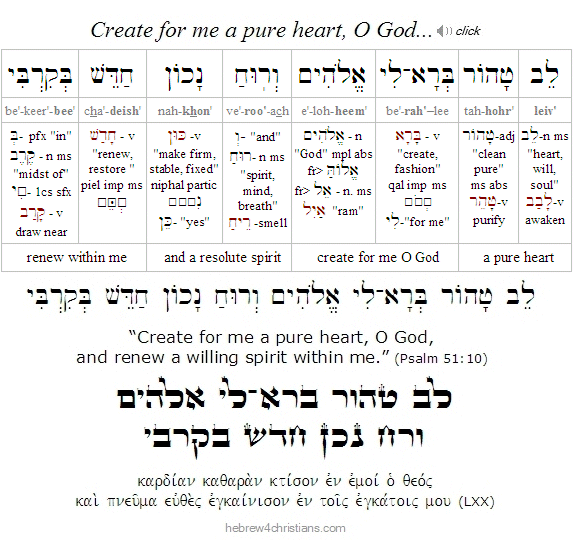 |
The Shepherd's Word...
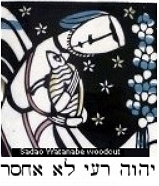
05.15.23 (Iyyar 24, 5783) The sages named the fourth book of the Torah "Bamidbar," meaning "in the desert," because the word occurs in its opening verse, and also because it aptly describes the Israelites' forty years of wanderings in the desert of Sinai after the great Exodus. Because God commanded a census of people to be taken several times in the book, however, the midrash calls it "Sefer Ha'pikudim" (ספר הפקדים), or the "Book of Countings," from which the English translation "the Book of Numbers" is derived. Interestingly, the Hebrew word for desert (i.e., midbar: מִדְבַּר), originally meant "from where the cattle are driven," that is, an area of pasturage that was uninhabited and fit for animal grazing. The Hebrew root "davar" (דבר) means "word" but also means "shepherd," evoking the call and direction of one who would guide his flock.
The book begins: "The Lord spoke (דבר) to Moses in the desert of Sinai, in the Tent of Meeting" (Num. 1:1). Now recall that during their wandering in the desert God's presence was symbolized by the Mishkan, or "Tabernacle," a central tent-like structure that had a secret inner chamber called the Holy of Holies, and within that hidden chamber was a sacred chest called the Ark of the Covenant (ארון הברית) that held the tablets of the Ten Commandments (עשרת הדברים). Upon the cover of the Ark, called the kapporet, were two cherubim (angelic figures), and it was there that God's audible word was spoken (see Exod. 25:22).
In light of this, among other things we can understand the book of Bamidbar to recount God's shepherding words given to the people as they wandered through desert places in search of the fulfillment of God's promise for their lives. The excursion into the desert is part of the journey of faith. God leads us by way of the desert - through struggle and waste places - to discipline our hearts to look for the greater hope of Zion.
Hebrew Lesson
Psalm 23:1-3a reading (click):
The Whispering Word...

[ The following is related to our Torah reading for this week, parashat Bamidbar... ]
05.15.23 (Iyyar 24, 5783) The Hebrew word midbar (מדבר), "desert," shares the same root as davar (דּבר) which means "word." We often need to be alone to hear God speaking kol demamah dakkah (קול דממה דקה) - "the sound of a low whisper" (1 Kings. 19:12), and the journey into the desert was God's way of separating His people to speak with them "privately," so to speak (Jer. 2:2). But to hear the word we must humble ourselves, and the desert (i.e., "word") of Sinai is therefore first of all the word of humility (ענוה). When God spoke Torah to Israel, it was from a nondescript mountain - a place of emptiness, brokenness and need. Indeed, another word for Sinai is "chorev" (חרֵב), a word that means dryness and desolation. That is the starting point -- not the lush places of a future paradise. We receive Torah "bamidbar" because we can only hear God's davar in a place of lowliness and inner quiet. God brings us to an arid place -- inhospitable, and dangerous -- to reveal our need for Him, to show Himself as our Sustainer. The way to Sinai is a necessary excursion to prepare us to look for the greater hope of Zion. May God help us heed the whisper of His Spirit...
Hebrew Lesson:
Psalm 143:8 Hebrew reading:
Getting Ready for Shavuot...

05.14.23 (Iyyar 23, 5783) We have a busy couple of weeks ahead of us. First, we will start reading the fourth book of the Torah, namely Sefer Bamidbar (ספר במדבר), or the "Book of Numbers." Second, Mem B'Omer, or the 40th day of the countdown to Shavuot (Pentecost), marks the date of the ascension of Yeshua (May 15th this year), and third, we honor Yom Yerushalayim ("Jerusalem Day)" that celebrates the reunification of Jerusalem and the establishment of Israeli control over the Old City in June 1967 (May 18th this year).
In addition, the month of Sivan begins Saturday, May 20th at sundown, which heralds the conclusion of the 49 day countdown from the day following Passover (see Lev. 23:15-16). The first five days of the month of Sivan anticipate the day the Torah was given to Israel at Sinai, namely, the sixth of Sivan, which marks exactly seven weeks after the Exodus from Egypt. So I hope to share some things related to both the Torah portion for this week, the significance of Jerusalem to us as followers of Yeshua, as well as the holiday of Shavuot (i.e., "Pentecost"), which begins in one week (i.e., Thursday, May 25th after sundown). May the LORD show us grace as we study his Torah and to review the significance of the Torah written upon our hearts in the Messiah (Jer. 31:31, Heb. 10:16, Jer. 32:40). Amen.
Upcoming Dates:
- Mem B'Omer - Mon. May 15th at sundown (and the following day)
- Yom Yerushalayim - Thurs. May 18th at sundown (and the following day)
- Shabbat Bamidbar - Fri. May 19th at sundown (and the following day)
- Chodesh Sivan - Sat. May 20th at sundown (and the following day)
- Shavuot ("Weeks," or "Pentecost") - Thurs. May 25th at sundown - Sat. May 27th
Hebrew Lesson
Exod. 34:22a reading (click):
Parashat Bamidbar...

05.14.23 (Iyyar 23, 5783) Our Torah portion for this week, parashat Bamidbar, is the first reading from the Book of Numbers, and is always read before the great holiday of Shavuot (i.e., "Pentecost"). The portion begins exactly where the Book of Exodus left off, that is, with the glory of the LORD (כְּבוֹד יְהוָה) hovering over the Mishkan (Tabernacle) as the Israelites were camped before Mount Sinai (see Exod. 40:38, Num. 1:1). On the first day of the thirteenth month following the great Exodus from Egypt – exactly thirty days after the Mishkan (Tabernacle) was first consecrated – God commanded Moses to take a census of all Israelite males over 20 years of age who would bear arms. Moses and the heads of each tribe recorded the results, with 603,550 men in all. This number did not include the Levites, however, since they were designated to take care of the Tabernacle during the journeys.
The LORD then gave instructions about how the Israelite camp was to be arranged. The Tabernacle would occupy the central location, with three clans of the Levites surrounding it on the north, south, and west (Moses and Aaron's tents were placed before the entrance on the east). The twelve other tribes were divided into four groups of three. All of the tents of the Israelites were to face the Tabernacle on every side. This camp formation was to be strictly maintained while traveling throughout the desert.
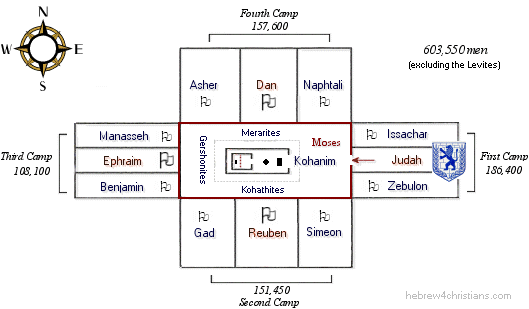 |
Each tribe had its own prince (i.e., nassi: נשׂיא), its own flag (i.e., degel: דגל) whose color corresponded with the color of its respective stone in Aaron's breastplate (Exod. 28:15-21). For example, Judah's stone was a sky-blue carbuncle and therefore the color of his flag was like the color of the sky with a "fiery lion" embroidered upon it (see Gen. 49:9).
The portion ends with a census of the three sons of Levi (בני לוי), namely Gershon (גרשׁון), Kohath (קהת), and Merari (מררי). The sons of Gershon (i.e., the Gershonites) were to maintain the inner tent of the Mishkan and were to be located on the west side of the courtyard; the sons of Kohath (i.e., the Kohathites) were to maintain the furnishings of the Mishkan such (as the Ark of the Covenant, the Menorah, etc.) and were to be located on the south side of the courtyard; and the sons of Merari (i.e., the Merarites) maintained the frames and pillars of the Mishkan and were located to the north of the courtyard. Finally, though the sons of Aaron were technically descendants of Kohath, they were set apart to serve as priests (i.e., kohanim: כהנים) and were located before gate into the Mishkan to the east.
Faith and Testing...

[ The way up is down and then up again. We ascend by descending and ascending again... ]
05.12.23 (Iyyar 21, 5783) When we go through a crisis or a difficult trial, we often discover what kind of person we are and what we really believe. This can be either unsettling or comforting, depending on how we understand God and whether we believe in his love for us.
God has not promised us an easy life, but rather a meaningful life full of troubles, sorrows, with abiding joy. The life of faith is no picnic in the park but rather an ongoing battle to hold fast to our confession despite various trials and temptations that come our way. Indeed the Scriptures clearly foretell that each of us will experience manifold trials in this life for the purpose of developing a patient and persevering character (James 1:3-4; Rom. 5:3; Heb. 10:36; Luke 21:19). These trials are given to us by divine design and under the direct supervision of the Lord, and therefore accepting them as part of God's plan for our lives encourages us to be faithful when we experience hardship (Job 1:21).
From a theological (or spiritual) perspective, a trial should not be regarded as a tragedy, though it is indeed tragic when a person who professes faith in God falls to pieces when they encounter troubles in their life. When this happens, it reveals their faith was meaningless in times of testing and unable to give the soul comfort.
It is easy to regard yourself as a "person of faith" when things are going well for you - when your prayers appear to be answered, when your health is good, when you are enjoying relative prosperity, and so on - in other words, when your faith doesn't challenge you to believe in God when you are in darkness, but simply appends to your life a sense of well-being and satisfaction. But it is when things suddenly go wrong, or when calamity occurs, that you feel dread in your "kishkas" and your hope is shaken... You may rashly conclude that God is not really with you, and that you were deceived in your religious views. If the suffering is intense or ongoing, you may be tempted to think God has abandoned you.
The way of a strong and mature faith, however, looks beyond the vicissitudes of temporal circumstances to apprehend the LORD who ordains all things for the blessing of our salvation. It relies on godly reasoning to discern that, whatever else may be going on, God is upon the throne and can be trusted to keep his promises to us.
"Faith is the substance (ὑπόστασις) of things hoped for, the conviction (ἔλεγχος) of that which is unseen" (Heb. 11:6). In other words, faith is the essence of hope in the unseen reality and goodness of God for our lives. As such, faith necessarily looks beyond the ephemeral and fleeting to reaffirm God's eternal counsel and good will. It reasons that God is not capricious or irrational; it confesses his moral perfections and holiness, and it avows that what God is true to his promises: what he has ordained is absolutely reliable and certain to pass (Mal. 3:6; Num. 23:19; 1 Sam. 15:29; Psalm 33:4; Psalm 119:160; James 1:17; etc.). And since God has secured for us eternal life and blessing in the sacrifice of his beloved Son, we can rest assured that he will not change his beneficent purposes for the good of our salvation and the glory of his name. Whatever our present circumstances be, God's concern for us remains faithfully constant, and therefore we can trust in his love for us.
That is what "at-one-ment" means, after all (John 17:22-23). Because God loves and accepts us, we trust Him to be present for us, even in the darkest of hours, on the other side of the veil, where he there "prepares a place for us" (John 14:2). As Yeshua said, "I tell you the solemn truth, the one who hears my message and believes the One who sent me has eternal life (חיי עולם) and will not be condemned, but has passed (i.e., μετά + βαίνω, lit., "crossed over" [עָבַר]) from death to life" (John 5:24). God's love "crosses over" from death to life and now forever sustains me.
Our great Savior calls out to all who are willing to hear, "Come to me, all who labor and are heavy laden, and I will give you rest. Take my yoke upon you, and learn from me, for I am gentle and lowly in heart, and you will find rest for your souls. For my yoke is easy, and my burden is light" (Matt. 10:28-30). Hallelujah! God loves you with an everlasting love; he has promised that all who come to Him will never be rejected or cast out (John 6:37).
Yeshua died so you could live (2 Cor. 5:21); you are made safe because of God's love for you (John 5:24; 10:28-30; Rom. 15:7). The Lord is always with you; he will never leave nor forsake you; indeed, nothing can separate you from God's unfailing and invincible love (Rom. 8:35-39). You are forgiven and declared righteous; you will not come to shame; you were chosen by God to know him forever. Your life and end are with God: you are a beloved child, welcome at God's table, given place in God's home...
"God is not a man, that he should lie, nor a son of man, that he should repent. Has he said, and will he not do? Or has he spoken, and will he not make it good?" (Num. 23:19). God does not say one thing and mean another; he does not play "head games" with us nor confound our hope in Him. No, "He is the Rock, his work is perfect; for all his ways are justice; he is a God of truth and without injustice: righteous and upright is he" (Deut. 32:4). By his very nature and being as YHVH (יהוה) God is faithfulness, truth, and love. He is to be trusted before all things. "Forever, O LORD, Your word is settled in heaven" (Psalm 119:89).
If you are ever tempted to think that God has been unjust or unfair, back up and investigate your theological assumptions. Understand that it is impossible for God to do evil or to act unjustly toward you. It is unthinkable that the LORD our Redeemer, the Savior who died on the cross bearing your sins would ever seek anything less than what is best for your life. So despite circumstances that may appear distressing, affirm that in no case has the LORD your Good Shepherd abandoned you or brought you to shame.
We rightly affirm that God is "omnipotent" (כֹּל יָכוֹל), that is, he is all-powerful and that nothing can ever thwart his will (Dan. 4:35; Isa. 14:27; Isa. 43:13), but does that imply that can God do absolutely anything without qualification? Can he, for instance, create a rock so heavy that he cannot lift it? Can he make 2+2 = 5? Of course not, and there are many things God cannot do because they are inconsistent with his nature and essence. God cannot lie; he cannot do evil; he cannot commit suicide; and so on. None of these things implies any limitation of God's glory and power, of course, since God is "that which no greater can be conceived," and therefore he cannot be other than the maximal source of positive perfections... Therefore God, who has given us tokens of his presence and goodness by virtue of creation, by conscience, and by direct revelation, will not suddenly undermine his will by failing to bring us into the fullness of his promises. Surely the Lord of Glory, who gave up his only begotten Son for our salvation, who underwent the extreme passion of the sacrifice of his most beloved for our ransom, surely he will give us the blessing to persevere under trial; surely he will never forsake you.
As the Apostle Paul affirmed: "He who has begun a good work in you will perfect it (ἐπιτελέσει) unto the day of Yeshua the Messiah" (Phil. 1:6). God will confirm you to the end that you may be blameless in that day (1 Cor. 1:8; Psalm 138:8). The Lord is "able to keep you from stumbling, and to present you faultless before the presence of His glory with exceeding joy" (Jude 1:24).
God who is all-powerful, all-loving, and all-good has promised you blessedness and eternal life. Since he is all-powerful, nothing can overrule his will; since he is all-loving, he intends what is for your best; and since he is all-good, he cannot lie and therefore his promises for your blessedness and eternal life are forever secure. Your present suffering, therefore, serves the purpose of refining your faith, developing godly character, and revealing the depths of God's passionate intercession for all people. Your patience in life, your endurance, is the means by which you "sow" your faith; your reward for faith will bring glory and praise to the LORD for his mercies and wonders. "Behold, I have refined you, but not as silver; I have tried you in the furnace of affliction. For My own sake, for My own sake, I do it, for how should My name be profaned? My glory I will not give to another" (Isa. 48:10-11).
When your life seems to come undone, when your world is falling apart, when you are riddled with besetting pain and vexing sorrows, remember who God is and put your trust in his promises. Hold fast to God's eternal purpose for you to know and love him forever: "This is eternal life, that they may know You, the only true God, and Yeshua the Messiah whom You have sent" (John 17:3). Affirm God's faithful presence. Come boldly to him for mercy and grace to help in your daily struggle to believe. The LORD is always with you and he has promised to make all things new. In his time and according to his will, "all shall be well, all shall be well, and all manner of thing shall be well." Amen.
Hebrew Lesson
Psalm 138:8 reading (click for audio):
Troubles of Love...
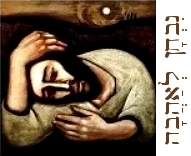
05.12.23 (Iyyar 21, 5783) Parashat Bechukotai is the concluding portion of the Book of Leviticus (וַיִּקְרָא), which is the central book of the Torah. In light of all that God had done for the Jewish people - from their great deliverance in Egypt to the ordination of the priesthood in the Tabernacle - God expected them to live up to their high calling as His chosen people: "You shall be holy, for I the LORD your God am holy" (Lev. 19:2). Therefore, some of the sages say that the central point of this concluding portion is tochachah (i.e., the warning of punishment) rather than nechamah (i.e., comfort). The focus is not, "If you walk in my laws" (Lev. 26:3), but rather, "if you do not listen (shema) to me" (Lev. 26:14)....
It has been said that the opposite of love is not hate, but rather indifference, and that explains why the punishments would come if the people "left their first love." Indeed, the "rebuke" portion of the tochachah begins with v'im lo tishme'u li (וְאִם־לא תִשְׁמְעוּ לִי), "if you do not listen to me" (Lev. 26:14), which recalls the Shema and the duty to love the Lord bekhol levavkha, "with all your heart." If the people walk carelessly (i.e., keri: קְרִי) with God, then God will afflict them with "the troubles of love" (i.e., yissurei ahavah: יִסּוּרֵי אַהֲבָה). A student once asked his rebbe: "Do we get punished for our sins in this world?" His succinct response was, "Only if we are made fortunate..." The worst possible fate is for God to be indifferent to someone! Can anything be more tragic than to be forgotten or to go unnoticed by God? It is far better that He afflict you with yissurei ahavah - the "troubles of love!"
The idea of tochachah (rebuke, correction) is not simply something for ethnic Israel, of course, since the New Testament likewise warns us that God will punish those who likewise walk carelessly (i.e., keri: קְרִי) with Him. Have you forgotten the exhortation that addresses you as God's children? "My son, do not regard lightly (ὀλιγώρει) the discipline of the Lord, nor be weary by his reproof (תּוֹכֵחָה). For the Lord disciplines the one he loves, and reproves (יוֹכִיחַ) every child whom he receives" (Heb. 12:5-6; Prov. 3:11-12). The Lord charged the assembly at Ephesus that they had let go of their first love. Yeshua therefore urged them: "Remember from what high state you have fallen and repent! Do the deeds (ἔργα) you did at the first; if not, I will come to you and remove your menorah from its place – unless you repent" (Rev. 2:4-5). Because God is never indifferent toward those who are trusting in His salvation, he will discipline and correct us to keep close to Him. He will afflict us with the "troubles of love." As it is written, "It is a fearful thing to fall into the hands of the Living God" (Heb. 10:30).
Regarding the litancy of woes, troubles, and curses listed in parashat Bechukotai, I'd like to relate a beautiful story I once read long ago.... The son of a Torah sage was away from home during the Shabbat of Bechukotai, so he went to a different synagogue to heard it read. As he listened to the cantor (reader), he became progressively alarmed at the severity of the curses, until he fainted in the middle of the reading. After he was revived he was asked if this happened to him every year, to which he replied, "No, when my father reads the Torah, the curses sound like blessings." Amen. Rightly heard. the warning of punishment for our sin should awaken us to hear the heart of our heavenly Father, who loves us and profoundly cares how we live our lives...
Hebrew Lesson
Psalm 119:67 reading (click):
For more on this topic see: "The Troubles of Love: Further Thoughts on Bechukotai."
If you walk in truth...
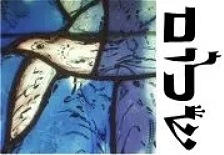
05.12.23 (Iyyar 21, 5783) In our Torah this week (i.e., Bechukotai) we read: "If you walk in my decrees (אִם־בְּחֻקּתַי תֵּלֵכוּ) and guard my commandments (ואֶת־מִצְוֹתַי תִּשְׁמְרוּ) and do them (וַעֲשִׂיתֶם אתָם), then I will give you your rains in their season, and the land shall yield its increase, and the trees of the field shall yield their fruit" (Lev. 26:4). Note the order in this verse: first we learn to walk in God's "decrees" and then we do his "commandments," which teaches us that the fear of God, the respect for His authority, must come first (כבוד לפני התורה). Note also the connection between our reverence before the Divine Presence and its effect on our physical environment. When we walk in the will of God, yielding our hears to his direction (Torah), we become vessels of his presence in the world and conduits of blessing to our surroundings. Indeed, as we yield to God's truth, even the sword of our enemies will be unable to be used against us and we walk in peace (Lev. 26:6; Prov. 16:7).
The Torah commentator Rashi says that the phrase, "if you walk in my decrees" refers to labor in the study of Torah (i.e., limud Torah: לימוד תורה), since we cannot mindfully observe God's decrees (chukkim) and commandments (mitzvot) without first studying Torah... As it says in our Sciptures: "Make yourself diligent (σπούδασον σεαυτὸν) to be genuine before God, a workman that is unashamed, living the message of truth accurately" (2 Tim. 2:15). "If you will walk" is an invitation to grow in grace and understanding of God's truth.
Hebrew Lesson:
Proverbs 16:7 Hebrew reading (click):
Ultimate Concerns...

[ We are "hard-wired" to value what we esteem as good. It's not a question of whether we worship, but what... So what's your ultimate concern? What are you looking to for life? ]
05.12.23 (Iyyar 21, 5783) It is written in our Torah: "Take care, lest you forget the covenant of the LORD your God, which he made with you, and make a carved image, the form of anything that the LORD your God has forbidden you... 'You shall not make for yourself a carved image (לא־תַעֲשֶׂה־לְךָ פֶסֶל) or any likeness of anything that is in heaven above, or that is on the earth beneath, or that is in the water under the earth" (Deut. 4:23; 5:8). Literally this refers to the ancient practice of bowing before "mediating forces" of God, often symbolized by art and ritual, as a token of veneration or as a means of finding "acceptance" within a group. We are not to imitate such customs of the pagan world around us; on the contrary, we testify of the One True God and repudiate the need for intermediaries between God and man... On a different level, "bowing before an idol" means passively yielding to the world and its ideals rather than submitting to the truth. When we seek to fit in, to feel like we belong, and follow the trends and passions of the crowd, we express idolatry of heart. Most intimately, an idol is a source of desire, happiness, and security apart from the LORD. Your "god" is whatever your heart admires, follows and loves... If you have "other gods" before the LORD, then something is wrong, since we were created by God to find life in Him alone. "Surely you don't think the Scripture speaks vainly when it says: the spirit which He sent to live in us wants us for himself alone?" (James 4:5) "Grace will save a man... but it will not save him and his idol" (Tozer). Therefore, my dear friends, flee from idolatry (1 Cor. 10:14).
The purpose or "goal" of life is to learn to be loved by God, to accept our place within his heart, and to "live, move, and have our being" rightly related to Divine Truth revealed in Messiah. The first lesson, then, is to know who we are and how much we are loved. Learning this is often a struggle, however. We are easily distracted. We forget why we are here. Because of this we must constantly remind ourselves of our true identity, of our high calling, and the reason for our lives... Much of our trouble comes from "disordered love," by elevating what is finite to the status of the infinite. Indeed idolatry is the substitution of not-god (לא־אֵל) for the sacred, absolutizing the present and worshiping the temporal. We find lasting inner peace only after we surrender to God's will for our lives...
Often we are slow to realize our desperate need and God therefore allows us to revisit the various "waste places" of our own lusts and fears until we have become sick of ourselves -- sick "to the bones." We have to be willing "to give up our sickness." Usually that means that we must experience repeated failures until we have "learned from the heart" that the LORD alone is our Healer and Deliverer (2 Cor. 7:10). Ironically it is only after we have abandoned teshuvah in our strength that we are enabled to truly turn.
God knows that we are unable to overcome our inner corruption - that we are unable to help ourselves - apart from his miraculous intervention, and therefore he creates a new heart and puts a new spirit within us (Ezek. 36:26). In this way the Lord makes us direct witnesses of his transforming power and glory... Our changed lives are made testimonies sent out to impart hope, to raise the dead of heart, and to bind up the bruised of spirit.
Hebrew Lesson
Ezek. 36:26a reading (click):
Shade on your right hand...

[ If you leave everything in God's hands, eventually you will see God's hand in everything.... ]
05.11.23 (Iyyar 20, 5783) When we forget that God is in complete control of all things, we tend to grow anxious... Feeling worried comes from focusing on ourselves, a perspective that can make us feel alone, forgotten, and even victimized in this world. Worry moves us to defend ourselves, to seek refuge in our own devices, and to forfeit the will of God according to the dictates of lesser fears... The sages say it is not permitted to worry: "To worry is a sin; only one sort of worry is permissible; to worry because one worries." We should worry that we worry because this indicates our hardness of heart and our unbelief! God's name YHVH (יהוה) means "Presence," "Breath," "Life," and "Love." So why be anxious for "tomorrow"? As we live today, we really only have this moment, but this moment is entirely sufficient when we walk in the light of God and seek to know him in all our ways. Amen, so we are admonished: "Let the peace of God rule in you" (Col. 3:15).
Where it says, "The LORD is your protector; the LORD is your shade at your right hand" (Psalm 121:5), note that God's Presence is likened to the shadow (צֵל) cast by someone who walks closely beside you, holding your hand (Psalm 23:4). Your "right hand" (יְמִינֶךָ) refers to your decision to "see the unseen" by performing acts of righteousness in this world: the blessing of God is then cast upon all you do (Deut. 2:7; Psalm 1:3). Neither does God "slumber or sleep," for the LORD your Guardian (יְהוָה שׁמְרֶךָ) is fully awake, full of life, insuperable power, and divine action! Our help comes from the LORD, "oseh shamayim va'aretz" (עשֵׂה שָׁמַיִם וָאָרֶץ) - the Maker of heaven and earth.
יהוה שׁמרך
יהוה צלך על־יד ימינך
Adonai · shohm'·re'·kha
Adonai · tzee·le·kha · al-yahd · ye·mee·ne'·kha

"The LORD is your Protector;
the LORD is your shade on your right hand."
(Psalm 121:5)

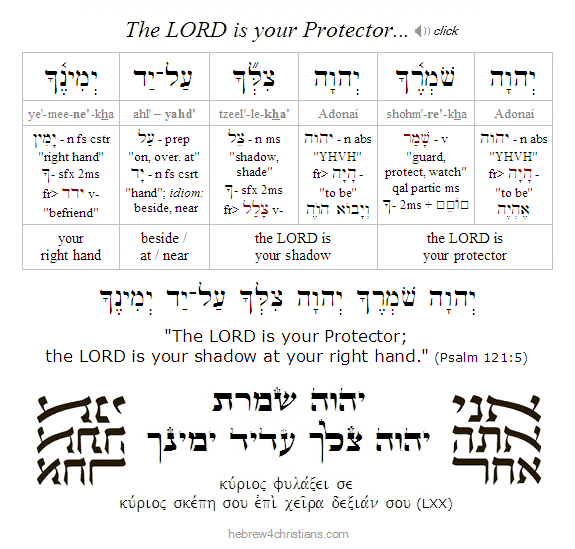
Where it is written, "Let us make man in our image and likeness (בְּצַלְמֵנוּ כִּדְמוּתֵנוּ), we note that the word "image" (i.e., tzelem: צֶלֶם) comes from the word tzel (צֵל), meaning "shadow," thus suggesting that man was originally created to cleave to God as closely as a shadow follows its Substance. And just as a shadow resembles its originating substance, so man was to resemble the reality of the Divine Presence in this world. The New Testament reveals that essential purpose of the redeemed life is to become conformed (σύμμορφος) to the image and likeness of Yeshua (Rom. 8:29, 1 Pet. 2:21). "Just as we have borne the image of the man of dust, we shall also bear the image of the man of heaven" (1 Cor. 15:49). The work of the Spirit is "Messiah in you - the hope of glory" (Col. 1:27). The question therefore isn't, "do you accept Yeshua as your Savior" as much as it is, "Does Yeshua live within your heart?"
Establishing the Law...

05.11.23 (Iyyar 20, 5783) This week's Torah (i.e., Bechukotai) promises blessings for those who obey God's law and curses to those who do not. In the opening verses of portion we read: "If you walk in my statutes, and keep my commandments, and do them" then great blessings will follow (Lev. 26:3-ff). The sages comment that the phrase "if you walk in my statutes" (אם־בחקתי תלכו) does not refer to the regular commandments (i.e., ha'mitzvot: המצוות), but instead to the study and love of the Torah (לימוד התורה), the wisdom of which is a "Tree of Life" (עֵץ־חַיִּים) to those who take hold of it (Prov. 3:22). To "walk in the statutes" of Torah is to meditate upon it day and night, so that you will be rooted as a tree beside streams of water, bringing forth fruit in abundance and blessing (Psalm 1:3).
The portion continues by warning that if, on the other hand, you neglect God or are careless about keeping the commandments, you will experience the curse: all kinds of trouble, sickness, sorrows, exile, and (worst of all) alienation from God. The sages emphasize that the cure to the various curses of the law (i.e., tochachah) is the study of the Torah, by which they mean not simply intellectual study but also the careful practice of its principles in your daily life. Torah study, in this sense, is likened to medicine that heals the soul...
Now while it is assuredly true that the practice of Torah - walking in the decrees of God - is the ideal for people, and the imperatives of Scripture, if obeyed, direct the soul to life and blessing, the problem of indwelling sin is so incurably radical that it no amount of resolution of the will nor reformation of character will suffice to transform the fallen estate of human nature and thereby reverse the curse of death given to the sons of Adam, and therefore a cure that comes from beyond the realm of human nature must be found, a heavenly cure that is otherwise called the "righteousness of God" (צדקת האלהים).
Again the problem of the curse (i.e., death) is not with the law of God, of course, which is "holy, and the commandment is holy and just and good," though indeed the verdict of the law exposes our sin and convicts us as transgressors. So the problem is not with the law of God but rather that we are lawbreakers, that we want to be "god" of our own inner world, and the effect of indwelling sin activates or "works" spiritual death within us. The rule (or power) of "indwelling sin" is called "the (principle of the) flesh" in Scripture, indicating that the source of human corruption is inherent and ever-abiding. This is otherwise called the "fallenness" of the human condition -- its irremediable state that refuses to submit to divine authority (Eccl. 9:3; Mark 7:21; Rom. 8:7; Jer. 17:9; etc.) -- and therefore the way of deliverance (ישׁוּעה) from the curse of our own inner corruption, from our own evil hearts, comes "apart from the law" that says, "do this and live." In the New Testament this is called "the righteousness of God apart from the law, though testified by the law and the prophets" (Gal. 3:10-12; Rom. 3:21).
This divine remedy, or "the righteousness of God" is given by means of the promised Deliverer and Savior, namely, Yeshua the Lord, who has redeemed us from slavery to the verdict of the law (i.e., death) and also from the control of indwelling sin. His redemption releases us from the legal claim of Satan that we are his bound subjects, and his regeneration enables us to inherit the divine blessing from the LORD. We are saved from divine wrath (i.e., the verdict of the law) through faith in the efficacy of the blood of Yeshua as our atoning sacrifice for the remission of our sins, and our trust "justifies," or puts us in right relationship with the LORD who is both the Lawgiver and our Savior (Rom. 3:26; Psalm 85:10). Salvation is "ontological," meaning it affects the deepest realm of our being and our heart. Because we have a new relationship with God according to the truth and power of his redemption, we are given a new identity and a new nature. We are "regenerated" by the life of God and no longer enslaved to "fallenness" of the lower nature. The forensic (legal) claim of Satan to keep those who sin as his captives is therefore nullified and we are empowered to live as God's adopted children.
In light of all this the question may arise, however, that if we are redeemed from the curse of the law, and if we are justified and empowered by faith to walk in the righteousness of God, then does this mean the law of God is nullified or abolished? After all, if the law is powerless to save us, as explained above, then is it not powerless in the realm of faith as well?
The Apostle Paul answers this question by saying "God forbid! We do not make void the law of God through faith, but on the contrary we establish the law!" (Rom. 3:31). In other words, our faith establishes the sanctity of the law of God by attesting to its validity and truth. After all, the law of God teaches that God is holy and just and that we are to be holy and just in all that we do (Lev. 19:2), and that the penalty for disobedience to God's law is spiritual death (Deut. 27:26; Ezek. 18:4; Psalm 7:11; 9:17; 110:5; Isa. 1:4,20; Dan. 12:2; Joel 1:15, James 2:10). Sin is forgiven, according to the law, only by means of sacrificial blood offered on behalf of the trusting and penitent sinner, and without the shedding of blood there is no remission for sin (Lev. 17:11; Heb. 9:22). Note that the Levitical system at the Mishkan ("Tabernacle") offered sacrificial blood on behalf of God for the atonement of the sinner, and that this blood represented the divine life of the Savior who was to come (Heb. 9:12-10:31). Yeshua, as the embodiment of the divine life and sacrificial blood, was offered for our sins to secure an eternal reconciliation and atonement for us (Rom. 5:11; 2 Cor. 5:19; Heb. 9:12). Far from nullifying the Torah, then, believers in Yeshua affirm the truth that the law of God is holy, just and good (even though the verdict of the law consigns us to judgment and death), and that the way of forgiveness comes by means of blood atonement of God's sanctified sacrifice.
The "law of the LORD is perfect, returning the soul" (Psalm 19:1), since by means of the law we understand our need for deliverance from the curse of being alienated from the life of God, and therefore our beloved Savior became a "curse for us" so that we could inherit the blessing of God forever. Amen, praise the LORD for the everlasting blessing his salvation - the gift of His righteousness given on our behalf! The New Covenant of God -- that is, the unconditional promise of God based on His love expressed in Yeshua -- imparts new life to us, and by the agency of the Holy Spirit, the spiritual meaning and truth of the law of God is written upon the table of our hearts, as it says, "Behold, the days are coming, declares the LORD, when I will make a new covenant with the house of Israel and the house of Judah, not like the covenant that I made with their fathers on the day when I took them by the hand to bring them out of the land of Egypt, which covenant they broke, though I was their husband, declares the Lord. For this is the covenant that I will make with the house of Israel after those days, declares the LORD: I will put my Torah within them, and I will write it on their hearts. And I will be their God, and they shall be my people" (Jer. 31:31-33). Amen, God gives to us a new heart and a new spirit so that we become new creations (Ezek. 36:26; 2 Cor. 5:17). So yes indeed by means of the New Covenant of God we establish the law as followers of Messiah!
Hebrew Lesson
Psalm 19:7 Hebrew reading (click):
As a Grain of Mustard Seed...
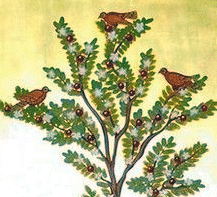
[ "If you have faith as a mustard seed..." (Matt. 17:20). ]
05.11.23 (Iyyar 20, 5783) During the Second Temple period it was common to liken a very small amount of something to be a "mustard seed," as for example when Yeshua said: "If you have faith as grain of a mustard seed, you can say to this mountain, "Move from here to there, and it shall move" (Matt. 17:20). Yeshua also likened the transformation of the tiny mustard seed into a large plant to illustrate the how the kingdom of God grows from a minuscule beginning into something prodigious and wonderful: "The kingdom of heaven is like to a grain of mustard seed, which a man took, and sowed in his field, which is the among the smallest of all seeds, but when it is grown it becomes a tree, so that the birds of the air come and lodge in its branches" (Matt. 13:31-32).
Yeshua points to the hidden workings of a tiny seed buried in the earth that would mysteriously bring forth a place of refuge and beauty. The mustard seed is inconspicuous, lowly, and does not produce a mighty tree like the exalted cedar or brawny oak, but it neverthess produces a lovely habitation for life where the birds of the air find refuge and perch among its branches.
Man looks on the outside, but the LORD looks upon the heart (1 Sam. 16:7). Yeshua's parable of the lowly mustard seed was intended to teach that we should consider matters from an eternal perspective. Recall that that the Tabernacle (or "Mishkan") was a relatively small tent-like structure when compared to the grandiose monuments of ancient Egypt, and yet that is where the LORD chose to symbolize his Presence among the people. The world is impressed with proud structures and symbols of temporal power, but God's kingdom is marked by the seemingly small, the overlooked, and the insignificant. Like the hidden light of the menorah in the Tabernacle, the deeds of the humble are beheld inwardly, where the Heavenly Father sees in secret (Matt. 6:4). To the heart of the lowly and trusting Yeshua says: כִּי מַלְכוּת הָאֱלהִים בְּקִרְבְּכֶם / "The Kingdom of God is within you" (Luke 17:21).
As I have mentioned before, there is a "transposition" of values, a "holy irony," in the realm of the Spirit. From God's perspective that which considered great in the eyes of men is considered of little account, and that which is considered insignificant in the eyes of men is considered of great importance (Luke 9:48). The wisdom of this world (i.e., pragmatic, self-promoting egotism, etc.) is regarded as folly before God (1 Cor. 1:20, 3:19). Therefore Yeshua "made himself nothing" and disguised himself in the form of a lowly servant (ἀλλὰ ἑαυτὸν ἐκένωσεν μορφὴν δούλου λαβών).
Like the seed that has to die and be buried in the earth to bear fruit, so we must mortify ourselves in humility (John 12:24). "Whoever wants to save his life will lose it, and whoever will lose his life will save it" (Luke 17:33). Yeshua Himself was crucified in weakness. He did not overcome evil in his own strength but yielded himself to God's providential will. By so doing, his weakness was transformed into the power of the redemption of God (2 Cor. 13:4). To the jaded eye of godless worldliness, Yeshua's death signaled defeat and failure, and yet God's way of doing things is often the very opposite of what we might expect. Again, the LORD chooses the lowly, the inconsequential, and the powerless to overthrow the vanity and variegated delusions spawned from human pride.
This is the basic pattern. God begins small, in hidden ways, and with the most unlikely of people, to do his will. From a carnal perspective Yeshua's disciples were a gaggle of misfits and nobodies, but from God's perspective they represented the miracle of a heart transformed by his power and splendor. God's kingdom is "not of this world," and that means that it will never enjoy the prominence of worldly glory.
The "mustard seed" of faith means that it is not our great faith in God that matters as much God's great power to transform our hearts. We must be careful not to turn faith into a disguised form of works righteousness: Our faith is what it is only by virtue of the greatness and goodness of the Living God who delivers and heals us from our fallen estate.
The life of the seed is a hidden miracle (i.e., nes nistar: נֵס נִסתָר), its death, burial, and regeneration reveal the principles of the kingdom embodied in Lord Yeshua our Savior. Just as the cross of Messiah appears foolish and confounds the eyes of the world, the eye of faith beholds it as the revelation of the power of God. As it is written: "God has chosen the foolish things of the world to confound the wise; and God has chosen the weak things of the world to confound the things which are mighty; and the base things of the world and the things which are despised God has chosen, and the things which are not, to bring to nothing the things that are, that no flesh should glory in His presence" (1 Cor. 1:27-29). Indeed, as the world regards the message of the gospel to be "foolishness," the Lord regards the "wisdom" of the world to be a trap for the proud of heart: For it is written, "He catches the wise in their own craftiness, and the counsel of the cunning comes quickly upon them" (Job 5:13).
The seed of faith represents the divine life of God within the heart (1 Pet. 1:23). And just as the seed works "automatically" to yield its fruit (Mark 4:26), so the Spirit of God produces the fruit of God's Spirit in the life of the believer. This is an unconscious process realized by the grace and mercy of God. "Who despises the day of small things?" the Lord asks (Zech. 4:10). Be still and know that I am the LORD who heals you (Exod. 15:26; Psalm 103:1-3).
God hides that we may seek him. "Behold, the LORD passed by, and a great and strong wind tore into the mountains and broke the rocks in pieces before the LORD, but the LORD was not in the wind; and after the wind an earthquake, but the LORD was not in the earthquake; And after the earthquake there was a fire, but the LORD was not in the fire. And after the fire there was the sound of a still small voice" (1 Kings 19:11-12). The Hebrew phrase for "still small voice" (i.e., kol demamah dakah: קוֹל דְּמָמָה דַקָּה) means "a calm, crushed voice," that is, the voice of the Savior of Israel who surrendered himself as the Promised Seed who would die, be buried, and be raised up to produce the fruit of the Spirit in those who put their trust in Him. Yeshua, indeed, is the "Mustard Seed" of our confession -- seemingly small but when sown within the heart of faith becomes the habitation of the very presence of God...
Hebrew Lesson
Psalm 97:11 Hebrew reading (click):
Dangers of Carelessness...

[ The following is related to our Torah reading for this week, parashat Bechukotai... ]
05.10.23 (Iyyar 19, 5783) This week's Torah portion (i.e., Bechukotai) includes the first great "rebuke" (i.e., tochechah: הוכחה) of the community of Israel given in the Scriptures (the second is found in Ki Tavo, i.e., Deut. 28:15-68). In this sober and ominous section, God promises the people great blessing if they would obey Him (Lev. 26:3-13), but He forewarns that exile, persecution and other progressively worse punishments would befall them if they would break faith with Him (Lev. 26:14-46). The sages note that divine censure would come if the people "forgot" about God or otherwise became careless in their observance of His laws. They point out that the refrain "if you walk contrary to me" (והלכתם עמי בקרי) - which occurs several times during the rebuke - really means "if you walk carelessly (i.e., keri: קרי) with me." Rashi notes that the verb קָרָה means "to befall" or "to happen" and therefore suggests a sense of randomness (the related word mikreh [מִקְרֶה] means "coincidence"). If the people regarded the events of life as "random," then God would reciprocate by bringing senseless trouble into their lives... For this reason the sages regard a careless attitude about God's will as the very first step to inevitable apostasy. In other words, regarding whatever happens in life as mere "coincidence" essentially denies God's Presence (hashgachah pratit), and this attitude will eventually call for God's corrective intervention. People may be "hot or cold" regarding their relationship with Him, but God will never give the option of affecting indifference toward Him... Indeed, God often brings hardship into our lives to regain our attention and cause us to return to Him. As C.S. Lewis once said, "God whispers to us in our pleasures, speaks to us in our conscience, but shouts in our pains: It is His megaphone to rouse a deaf world."
The portion begins, "If you walk in my statutes (i.e., bechukotai: בחקתי) and guard my commandments and you do them..." (Lev. 26:3), which led Rabbi Hanina to ask why the seemingly superfluous phrase, "and you do them" (וַעֲשִׂיתֶם אתָם) was included here. After all, if the people would walk in God's statutes and guard his commandments, wouldn't they necessarily be doing them? He then suggested that the vowels of the word otam ("them") should be vocalized as atem (אַתֶּם), "you," which would then change the sense of the phrase to become, "you shall make (עָשָׂה) yourselves" (i.e., into God's image). The logical corollary of this seems to imply that if you do not walk in God's statutes and guard his commandments, you will disfigure the image of God within you...
Interestingly, God specifically cites the failure to observe the Sabbatical Year (i.e., shemittah), mentioned earlier in parashat Behar, as part of the reason why His judgment would come (Lev. 26:34-35,43). The observance of the Sabbatical Year, of course, required complete faith that God was in control of all the "happenings" of nature. Like the Sabbath day, the Sabbatical year was designated to proclaim that God is the King of the universe. Those who disregarded this law therefore denied God's rule over nature, and thereby denied the existence of spiritual reality that ultimately governs the physical world...
The Scriptures warn us to "pay more careful attention to what we have heard so that we do not drift away" (Heb. 2:1). We must be anchored to the truth lest we become shipwrecked in our faith. Drifting occurs slowly and almost imperceptibly, though the end result is as deadly as openly turning away from God in outright apostasy. As C.S. Lewis once wrote, "The safest road to hell is the gradual one - the gentle slope, soft underfoot, without sudden turnings, without milestones, without signposts." The devil seeks to lull you to sleep...
Spiritual danger is just as real as physical danger, though most people pretend it isn't because it isn't as easily seen. The danger today is to give up hope, to "go with the flow," to become numb, to drift off asleep, and to die inside... It is far more dangerous to tranquilly ignore God's mercy, or to make a pretense of knowing God's grace, than it is to blatantly break his law. Therefore the urgent need is to remember, to hear, and to awaken the soul to face the truth about reality. We must focus the heart, concentrate the will, and consciously "set" the Lord always before us (Psalm 16:8). Each day we must awaken from our native emptiness to reaffirm the central truth: "Hear, O Israel, the LORD is our God; the LORD is one; and you shall love the LORD your God with all your heart and with all your soul and with all your might" (Deut. 6:4-5). As the Apostle Paul said, "Awake, you who sleep, Arise from the dead, And Messiah will give you light" (Eph. 5:14).
Therefore we must be vigilant to secure our high calling in Messiah: "Let us know; let us press on (i.e., נִרְדְּפָה, "pursue after") to know the LORD; His going out is sure as the dawn; He will come to us as the showers, as the spring rains that water the earth" (Hosea 6:3). The day is drawing near, and now - more than ever - we must remain steadfast. May God help you pursue him be'khol levavkha – "with all your heart" – because He has promised, "You will seek me and find me, when you seek me with all your heart" (Jer. 29:13). And may the love of the LORD be upon you, even as you put your hope in him (Psalm 33:22).
Hebrew Lesson
Jeremiah 29:13 Hebrew reading (click):
For more on this subject, see "The Tochechah: Further Thoughts on Bechukotai."
Come just as you are...

05.09.23 (Iyyar 18, 5783) Some people seem to think that we first must repent and then we will encounter the Lord, but it's actually the other way around: we first encounter the Savior and then we learn the meaning of repentance. Thus Paul's eyes were opened after he was first blinded by the light (Acts 9:3-6). Likewise, it is only after we have met the Lord that we begin to understand our own blindness of heart, but as learn to see more clearly, we encounter more and more of his love (Rom. 5:20). As Yeshua said, "My yoke is pleasant (χρηστὸς) and my burden is light (Matt. 11:30). Teshuvah, then, is a progressive and ongoing process of awakening, as we learn to love God and to accept ourselves, despite our struggle with sin. As St. Anselm once prayed: "O Lord, grant us grace to desire thee with all our hearts, that so desiring, we may seek and find thee, and so finding thee, may love thee, and loving thee may hate those things from which you have redeemed us." Amen.
We encounter the Lord "just as we are," by means of his gracious intervention in our lives, and so we continue to live by faith in God's grace (indeed, what we call "sanctification" is often just "catching up" with the miracle of his revelation to us). And we always come to God "just as we are," since we are never more than what we are in the truth: χάριτι δὲ θεοῦ εἰμι ὅ εἰμι- "by the grace of God I am what I am," as Paul said. "For all things come from You, and from your hand we give back to you" (1 Chron. 29:14). Therefore the Spirit says, "Come unto me just as you are, or you may never come at all...."
Hebrew Lesson
1 Chron. 29:14b Hebrew reading (click):
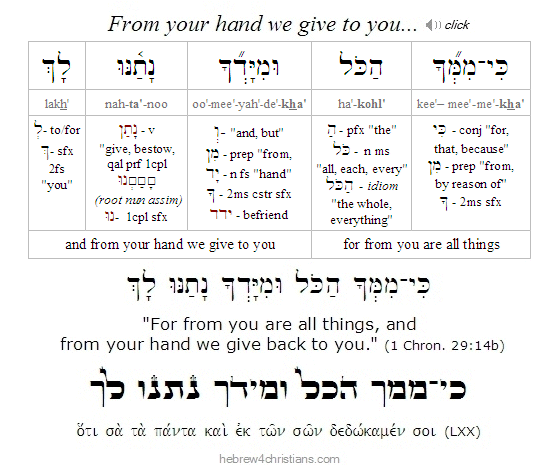 |
A prayer to the One calling you to come: "I come to you just as I am - needy, sick within, weary, and broken... I come seeking your love; I come because you invited me to come: I open my heart, such as it is, to you; please join me here, in this place of my need, in this place of pain, and wrap me your comfort. I can only love you as I know your love, Lord Yeshua, so please help me to know your love in the truth. Amen."
Knowing God's Heart...

[ "When you read God's Word ... continually to say to yourself: It is I to whom it is speaking - this is earnestness, precisely this is earnestness. This is most crucial, as unconditionally the condition if you are to come to see yourself in the mirror." - Kierkegaard ]
05.09.23 (Iyyar 18, 5783) "Our Lord Jesus oftentimes said, 'This I am. This I am. I am what you love. I am what you enjoy. I am what you serve. I am what you long for. I am what you desire. I am what you intend. I am all that is'" (Julian of Norwich). Amen to such beautiful words. And we should attend to stirring of our hearts, our deepest desires, since they ultimately find their end in God. As C.S. Lewis noted, our longing for a love which no experience in this world can fully satisfy is a sign that were made for God's eternal love.
You seek beauty, peace, love, and life, but the Lord says that he is the substance and heart of all these things... The lilies of the field do not toil but are arrayed in God's pleasure and design; the birds do not store up their food in barns but are sustained to take wing in the winds of God's hovering presence. Every hair on your head is numbered; there is not a word on your tongue unheard by your Heavenly Father.
Imagine Yeshua saying the following words directly to you: "I am the bread of life. I am the substance of what satisfies your hunger. I am essential for life. I am the manna that comes down from heaven to feed you and make you forever alive. I give you sustenance and strength; I will give you living water that will be like an oasis for your heart - the Spirit of Life that will comfort you. Blessed are those who hunger and thirst for righteousness, for they shall be satisfied. I alone can satisfy your deepest needs and longings. I am Life itself, the source and blessing of all that is good and worthy and true.
I am the light of the world. I give to you the light of life. My presence will guide your way. I will turn your darkness into light. In me is the fountain of life; in my light you shall receive light... I will give you a heart to know me. I am the Word of God: the Voice and revelation of the LORD, the Source of all truth. I am the LORD who brings you out of the darkness of your bondage; I am the one who redeems you, the one who atones for you, the one who suffers and dies for you to remove what separates you from God's Presence. I am the Father who receives you with open arms; I sacrifice the fattened calf to celebrate the blessing of your life... I am the LORD your healer; I sanctify you in my love.
I am the gateway to life, the door that opens to the Kingdom of Heaven. I am the way to know the Father's heart; I express the truth of God in who I am; I am the resurrection of God: No one can enter the kingdom apart from me. I am the LORD and there is no Savior apart from me. Do not be afraid: I will hold your right hand; it is I who say to you, "Fear not, I am the one who helps you." I am the Good Shepherd who guards each one of his flock.
I am your way to connect with God. I am the true Vine. Live in me and I will live in you. I will never leave nor forsake you. Draw near to me: lean upon my bosom. I will teach you what love means. Find comfort in my love for you. Then you will be able to love others and glorify the truth of my heart's passion for all people."
Yeshua is the way, the truth, and the love for which our heart cries out. In Him we "live and move and have our being." He is the Alef and Tav, the First and the Last, the Beginning and the End, and the Sacred Center of all that exists. His heart is our "all in all," the fullness of all that will ever mean anything at any time. "I am my beloved's and my beloved is mine; he grazes among the lilies." May you open your heart and draw near to him today. Amen.
Hebrew Lesson
Jeremiah 31:3 Hebrew reading (click):
He makes all things new...

05.08.23 (Iyyar 17, 5783) Only God can help us die to ourselves - to let go of the "self life" and to be set free from the tyranny of what we naturally are... The old nature is never "reformed" by religion but is put to death by a supernatural act of God, as it says: "I have been crucified (συνεσταύρωμαι) with Messiah; it is no longer "I" who live, but Messiah who lives in me. And the life "I" now live in the flesh "I" live by faith in the Son of God, who loved me and gave himself for me" (Gal. 2:20).
By faith we trust that we already have been crucified with him, just as by faith we trust that we already have newness of life, though all this is only "theoretical" unless and until the Spirit of God makes it real in our lives: "The wind blows where it wishes, and you hear its sound, but you do not know where it comes from or where it goes. So it is with everyone who is born of the Spirit" (John 3:8). Only the LORD can put a new heart within us; only God can make the new "I" walk in the flesh; only the Spirit can breathe upon dry bones raised from the dust to make them live (Ezek. 37:5).
עיני תמיד אל־יהוה
כי הוא־יוציא מרשׁת רגלי
ei·nai · tah·meed · el -Adonai
kee · hoo-yotz·ee · mei·re'·shet · rag·lai

"My eyes are always toward the LORD,
for he will free my feet from of the net."
(Psalm 25:15)

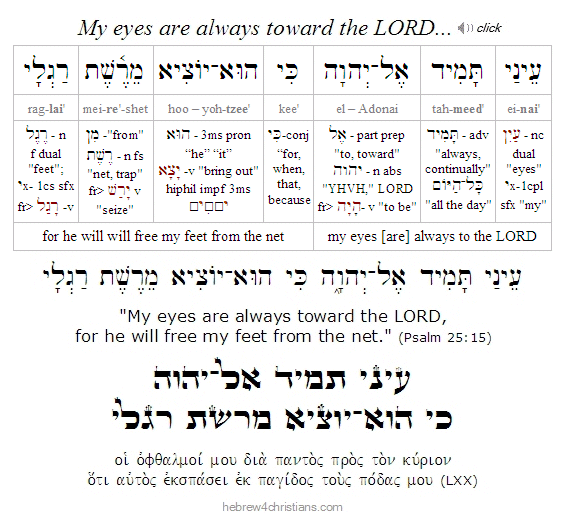
We believe not only that Yeshua died as our substitute for sin - saving us from its penalty - but also that our old nature has died with him - delivering us from its power: "We know that our old self was crucified with him in order that the body of sin might be brought to nothing, so that we would no longer be enslaved to sin" (Rom. 6:6). As it is written: "For by grace you are saved through faith, and this is not from yourselves, it is the gift of God; not a result of works, so that no one may boast. For we are his workmanship (αὐτοῦ γάρ ἐσμεν ποίημα), created in Yeshua the Messiah for good works, which God prepared beforehand that we should walk in them" (Eph. 2:8-10). Note the use of the word "works" and "workmanship" in this passage. Human works (ἔργοι) here refer to religious or ethical acts that are performed in order to secure divine favor, and this is contrasted with God's work of righteousness that justifies the one who trusts in Yeshua for salvation.
Salvation is a matter of God's "workmanship" (ποίημα) done through the agency of his Spirit, and not as a result of our of religious efforts or practices. We are saved by trusting in God's grace alone and healing, though our regeneration initiates a process wherein we are made to resemble the image of Messiah, doing works that bear witness of his life and spirit within us (Rom. 8:29; John 15:5). "For as many of you as were baptized into Messiah have put on the Messiah" (Gal. 3:27) [by "baptism" think identification, not some ritual act]. We work out what God has worked in our hearts. May the LORD our God make the truth of what He has done for us alive and breathing freely within us -- by the power of his salvation in Yeshua!
 |
Rest and Creativity...

[ The following is related to our Torah reading for this week, Parashat Behar.... ]
05.08.23 (Iyyar 17, 5783) In our Torah for this week (i.e., parashat Behar), the LORD gave the people instructions about how they were to manage the promised land once they finally entered it. Instead of commanding the people to work hard to sustain themselves, however, God gave them laws of rest – of releasing their hold on the land (see Lev. 25:1-7). During the "Sabbatical years" (shemittah) the land was to lie fallow, and the people could eat only what was produced naturally, without any farming or organized harvesting.
Letting go of the land required the people to trust that God was in control of nature's creative processes, and to acknowledge that the process of growth is mysterious and divine. As Yeshua said: "The Kingdom of God (מַלְכוּת הָאֱלהִים) is like someone who spreads seed on the ground. He goes to sleep and gets up, night and day, and the seed sprouts and grows, though he does not know how. By itself (αὐτομάτη, i.e., "automatically") the soil produces a crop, first the stalk, then the head, then the full grain in the head. And when the grain is ripe, he comes in with his sickle because the harvest has come" (Mark 4:26-29). In other words, the "ordinary" process of the growth of a seed is miraculous and is a gift from above. The Torah of the Sabbatical Year teaches us that creativity and fruitfulness requires that we let go and leave the outcome to God.
Hebrew Lesson
Psalm 116:7 reading (click):
Conversation of Heart...
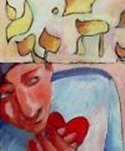
05.08.23 (Iyyar 17, 5783) The prelude to the central daily prayer of Judaism (i.e., the Amidah) begins with King David's great appeal: "O Lord, open my lips and my mouth will declare Your praise" (Psalm 51:15). David's declaration of thanks comes from trusting in God's love and forgiveness, just as we ask also trust God to pray within us, so to speak, and to utter groanings and words that come from his own heart to ours that return again unto his. We pray to the LORD as the LORD knows Himself to be - not as we imagine Him to be - since His love and passion is the beginning and end of all true prayer. This is the deeper "conversation of heart," the secret murmur spoken between lovers, the cooing and song of holy romance... The Ruach HaKodesh (רוּחַ הַקּדֶשׁ), the Holy Spirit, "helps us in our lack of strength. For we do not know what to pray for as we ought, but the Spirit himself intercedes for us with groanings too deep for words" (Rom. 8:26).
Hebrew Lesson
Psalm 51:15 reading (click):
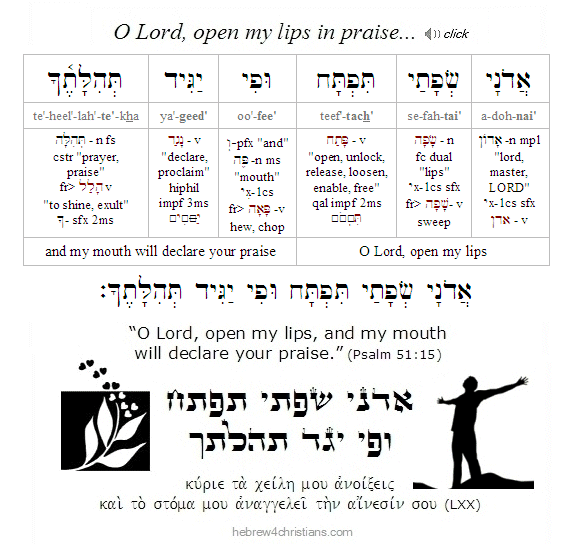 |
Parashat Bechukotai - בְּחֻקּתַי
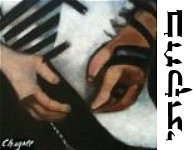
05.08.23 (Iyyar 17, 5783) Our second Torah reading this week, parashat Bechukotai, is the final portion of the central book of the Torah (i.e, Leviticus) which begins with the promise that if the Israelites would walk in the LORD's statutes (chukkot) and commandments (mitzvot) and perform them, then they would enjoy material blessings and dwell securely in the promised land. Moreover the LORD Himself would make His dwelling with them and would walk among them as their God. The people of Israel would then truly be am segulah (עַם סְגֻלָּה) - a treasured people among all the nations of the earth.
On the other hand, if the people disobeyed God and disregarded His commandments, then they would be considered covenant-breakers, and they would experience all manner of distress and tribulation in their lives. They would experience panic attacks, diseases, heartache, and all manner of tsuris (vexation, trouble); their enemies would eat their increase, and those who hate them would rule over them; they would flee at the rustle of a leaf, and their lives would be full of terror and misery – all because they refused to put the LORD God first in their lives. And if after all this trouble the people would still refuse to return to the LORD, the worst punishment of all would befall them: exile from the promised land and banishment from the Presence of the LORD Himself.
Nonetheless, despite their disobedience, God's love and mercy for Israel would never fully depart, for "if they confess their iniquity and the iniquity of their fathers in their treachery that they committed against me, and also in walking contrary to me, so that I walked contrary to them and brought them into the land of their enemies – if then their uncircumcised heart is humbled and they make amends for their iniquity, then I will remember my covenant with Jacob, and I will remember my covenant with Isaac and my covenant with Abraham, and I will remember the land" (Lev. 26:40-42). Moreover, even while they are in exile, in the land of their enemies, God vowed: "I will not cast them away; nor will I ever abhor them to destroy them and to break My covenant with them; for I am the LORD their God" (Lev. 26:44).
The portion (and the Book of Leviticus) ends with a discussion of various laws pertaining to vows and tithes that a person may make to contribute towards the upkeep of the Sanctuary. These include dedications of persons, animals, houses, and lands. The scroll of Leviticus ends with the emphatic statement: "These are the commandments that the LORD commanded Moses for the people of Israel on Mount Sinai" (Lev. 27:34).
Parashat Behar...
Shemitah and Jubilee Years...
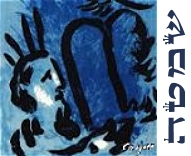
05.07.23 (Iyyar 16, 5783) This week we have another "double portion" of Torah. Our first Torah portion is called parashat Behar (פרשׁת בהר) begins with the commandment that an Israelite farmer must let his land remain fallow every seventh year. This is called the "Sabbatical year" (or shemittah: שְׁמִטָּה). For six years, a farmer would be permitted to plant and harvest fields and vineyards, but during the seventh year no planting or harvesting was permitted, and all the inhabitants of the land could freely glean whatever the farmland produced naturally. Like the "double portion" of manna that fell on the sixth day of the week, God promised to give farmers a "double portion" of the harvest on the sixth year.
In addition, the people were told to count seven cycles of seven years – a total of 49 years – to mark the arrival of the fiftieth year with blasts of the shofar on the Day of Atonement (i.e., Yom Kippur). This fiftieth year would be a time of "Jubilee" (i.e., yovel: יוֹבֵל) – a year of "praise" for the land and all its inhabitants. All slaves would be set free, all debts would be canceled, and the stewardship of the land would revert to its original titleholders.
God was deadly seriously about the matter of allowing the land to rest every seventh year. Indeed, the judgment upon Israel for ignoring the shemittah was so great that it lead to the destruction of the Temple in Jerusalem, the terrible suffering of Judah, and ultimately to the Babylonian exile that lasted exactly 70 years - one year of exile for every Sabbatical year that was not observed (see Lev. 26:32-35; Jer. 25:11; 2 Chron. 36:21).
Hebrew Lesson
Leviticus 25:4 reading (click for audio):
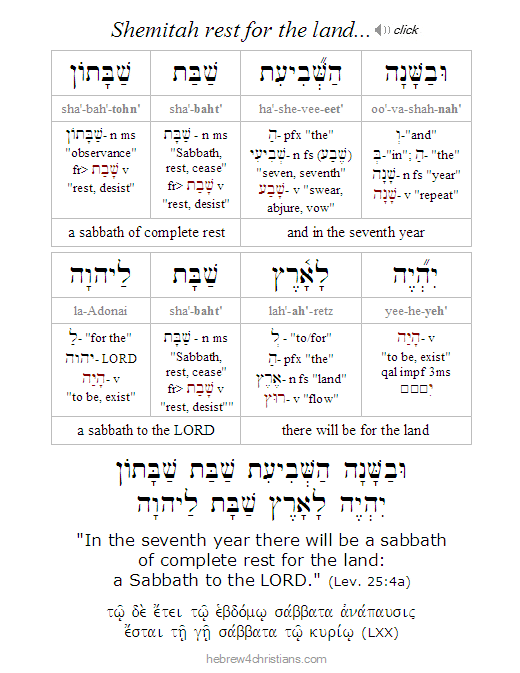 |
Though the shemittah year was declared by a religious court, we can determine whether a given year is a Sabbatical year by simply taking the current Jewish year and dividing by seven; if there is no remainder, it is a shemittah year; otherwise it is not. For example 5783 is not a Sabbatical year because divided by 7 leaves a remainder, whereas year 5789 is a Sabbatical year (note that the Jewish year begins on Rosh Hashanah, on Tishri 1, in the fall). The Jubilee year (i.e, yovel: יובל) of course follows the seventh of the seven year cycles (i.e., 7 x 7 + 1), though there are some questions about which iteration (1st, 2nd, ... 7th) is currently active. According to some authorities, the last Jubilee year was on Yom Kippur 5776, that is, Tues. Oct. 11th, 2016, so the next would be 50 years later (i.e., in the year 5826).
Repentance and Paradox...

05.05.23 (Iyyar 14, 5783) To be a human being is a paradox, caught between the realms of the infinite and nothingness; a union of endless possibility yet terminating limitation. Man desires to live forever but is conscious that one day he will die. He is an incongruity - a mix of flesh and spirit, saint and sinner, good and evil, angel and animal... In light of this, a spirituality that demands for us to be always happy, always "up," is dishonest, since the truth is grounded in what is real, and that includes both the miserable and the tragic as well as the joyful and sublime. It's not that there is no difference between good and evil within the heart, but both are part of who we really are. It is the bittersweet struggle, the process of walking as "saintly sinners," "holy fools," "dying immortals," and so on, that defines us. We must embrace our brokenness, in order to become whole; there is no healing without true confession of our need. Therefore we come to the paradoxical cross - the place of utter pain, separation, and death - to find healing, acceptance and life.
Please note this is not to deny that we are to walk by the Spirit and reckon ourselves dead to sin in the Messiah (Rom. 6:11); however, far from being a sign of a lack of spirituality, personal struggle is a sign of its presence.... Only those who are conscious of the tragic, who are haunted by the disparity between what "is" and what "ought" to be; only those who are divided within themselves, torn by inner tension and conflict - those aware that they are both in this world but not of it - sojourners, a long long way from home, homesick for the heavenly city, who inwardly ache and yearn to be fully redeemed - only these, it may be said, are consciously spiritual. After all, the worldling, the self-confident and self-possessed, rarely desire deliverance from themselves and are often content to rationalize the state of their soul; the spiritual person, on the other hand, senses a profound incompletion, a lack, a fracture that runs straight through the core of reality, a breach that needs to be healed...
I would utterly die of despair over myself were it not for the truth that it is not about who I am that is as important as about who He is...
There is great joy, of course, and we are indeed to "rejoice in the Lord always," but there is also real pain in our lives, and I'd rather be in the company of those mourning the mess they have made of their lives than with someone who thinks they've got it all together... "We are treated as impostors, and yet are true; as unknown, and yet well known; as dying, and behold, we live; as punished, and yet not killed; as sorrowful, yet always rejoicing; as poor, yet making many rich; as having nothing, yet possessing everything" (2 Cor. 6:8-10).
Hebrew Lesson
Psalm 41:4 Hebrew lesson (click):
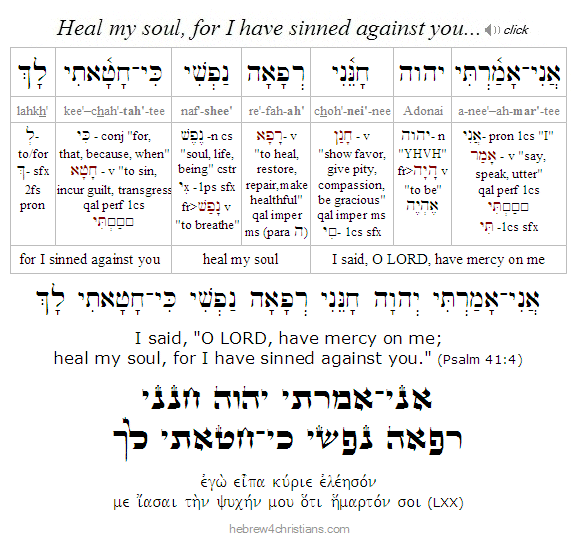 |
Personal Note: I want to express my heartfelt appreciation to each of you who stand with this ministry and encourage me to continue... You are in my prayers, and may it please the LORD our God to draw you ever closer to Him through the grace we share in Yeshua our glorious Savior. Amen, thank you again, and Shabbat Shalom...
Yearning for Heaven...

05.05.23 (Iyyar 14, 5783) It is an ongoing struggle to live in this world without being devoured by its fear, insanity, and violence. Yeshua prayed for his followers saying, "I am not asking you to take them from the world but to keep them from the evil one. They do not belong to the world any more than I belong to this world" (John 17:15-16).
To live in the world without belonging to the world marks the life of the tzaddikim who are seeking the house of love, the place where God abides. Even though we are given "traveling mercies" for our journey in this world, we must lift our heart toward heaven, desisting the world and its vanities, and regarding the place of God's heart to be our true home.
Abraham closed his eyes to this world and was given the inner light of truth that would reveal his way to God. "By faith Abraham obeyed when he was called to go out to a place that he was to receive as an inheritance. And he went out, not knowing where he was going. By faith he sojourned in the land of promise as in a strange land, living in tents with Isaac and Jacob, heirs with him of the same promise. For he was looking forward to the city that has foundations, whose designer and builder is God" (Heb. 11:8-10). For here we have no lasting city, but we seek the city that is to come (Heb. 13:14).
So let us lift up our souls unto the LORD and refuse to live in fear. Let us stand strong in faith, trusting God's promise even if we are sometimes in darkness. And let us take hope in God word: "Blessed is the one who makes the LORD his trust" (Psalm 40:4).
Hebrew Lesson:
Psalm 40:4a reading (click for audio):
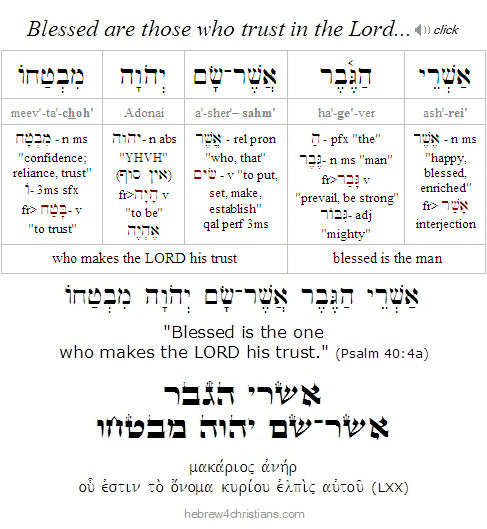 |
Tyranny and God's Judgment...
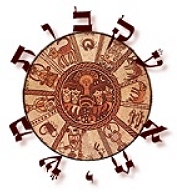
[ "If God does not judge America, he owes Sodom and Gommorah an apology..." ]
05.05.23 (Iyyar 14, 5783) "Hear, O heavens, and give ear, O earth: for the LORD hath spoken, I have nourished and brought up children, and they have rebelled against me. The ox knows its owner, and the donkey its master's crib, but Israel does not know, my people do not understand." Ah sinful nation, a people laden with iniquity, a seed of evildoers, children that are corrupters: they have forsaken the LORD, they have provoked the Holy One of Israel unto anger, they are gone away backward. Why should ye be stricken any more? you will revolt more and more: the whole head is sick, and the whole heart faint. From the sole of the foot even unto the head there is no soundness in it; but wounds, and bruises, and putrifying sores: they have not been closed, neither bound up, neither mollified with ointment. Your country is desolate, your cities are burned with fire: your land, strangers devour it in your presence, and it is desolate, as overthrown by strangers" (Isa. 1:2-7).
"Freedom is never more than one generation away from extinction" - and now we are here.... Godlessness, anarchy, and treachery rule the day; every one does what is "right" in their own eyes continually (Gen. 6:5). Consequently people no longer are capable of thinking clearly: God has given their minds over to madness and derangement (Rom. 1:28). Since engineered lawlessness and depravity are so widespread, America has fallen into tyranny. There is no political remedy, either from the left or the right... Justice has fallen and our culture is reaping the whirlwind. For the ungodly who despise moral authority and truth, devastating judgment awaits: the righteousness of the LORD will be vindicated. As for the remnant that still believes, only the LORD can protect us now... May God show his mercy. כָּל־רֹאשׁ לָחֳלִי וְכָל־לֵבָב דַּוָּי - "The whole head is sick, and the whole heart faint" (Isa. 1:5).
Regarding the princes of this world and their various machinations of evil, there is a Scriptural prayer to the LORD God of all power (יהוה אלהים צבאות) that may be offered in times of oppression and persecution by our enemies: "O our God, will you not execute judgment? For we are powerless against this great horde that is coming against us. We do not know what to do, but our eyes are upon you" (2 Chron. 20:12). Amen.
Hebrew Lesson
2 Chron. 20:12b reading (click):
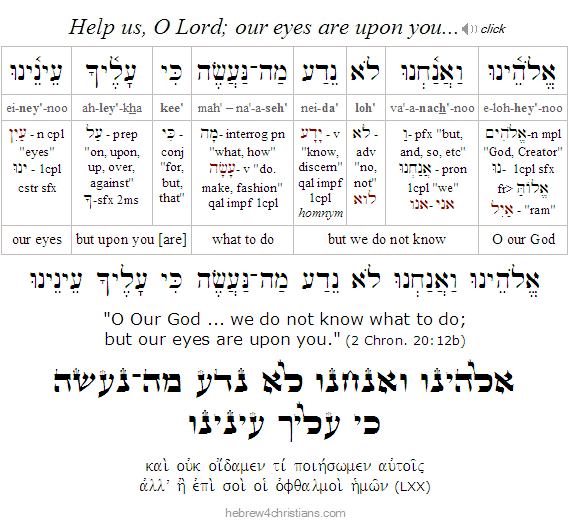 |
Some people question whether we are approaching the prophesied "End of Days," but it's evident that we're living in a time of ever-increasing evil, with deluded politicians who suppress the truth and cowardly schemers who seek to "reset" the world. Regardless, the eye of faith foresees the table being set for the climactic judgment to come... There is an appointed hour where the world system will meet God "panim el panim."
We can prepare for this day by getting our spiritual lives in order - turning to the LORD with greater fervor, and (above all) trusting in the Lord's guidance, protection, and care for whatever may happen. Choose this day whom you will serve...
True and False Worship...

[ There is something worse than death that should concern all people, and that is discovering that, upon your death, you had missed what is most important, that you sold your soul for vanities, and that you never learned the true reason for your existence... ]
05.05.23 (Iyyar 14, 5783) Asks the Savior: "Why do you call me 'Lord, Lord,' and not do what I tell you?" (Luke 6:46). Regarding this question Kierkegaard comments: "True worship quite simply consists in doing God's will. But that kind of worship was never to people's liking. What occupies people in every age is to arrange another kind of worship that consists of doing their own will, but in such a way that God's name, calling upon God, is connected with it, whereby people think themselves protected against being ungodly – alas, although precisely this is the most definite kind of ungodliness" (The Moment: 1854). It is easy to go wrong here. The will of God is forever to trust in his Son, and indeed, this is the "work of God" (John 6:28-29). Yet this means suffering for God, needing him, yearning for his daily blessing, being abandoned to his care for your life... When out of the depth of our need – without pretense and in despair over ourselves – we cry out to the LORD, he will surely help us. As it is written: "If we ask according to his will, he hears us" (1 John 5:14), and therefore it is the heart's need for Him that is the will of God...
"Not everyone who says to me, 'Lord, Lord,' will enter the kingdom of heaven, but the one who does the will of my Father who is in heaven. On that day many will say to me, 'Lord, Lord, did we not prophesy in your name, and cast out demons in your name, and do many mighty works in your name?' And then will I declare to them, 'I never knew you; depart from me, you workers of lawlessness'" (Matt. 7:21-23). Despite the profession and practice of their faith, these people were strangers to God... They had a false sense of assurance, believing that they were "serving God" while they really were not... Therefore the essential question here is whether Yeshua truly knows you and the need of your heart. You may know a lot about God, religion, spirituality, and yet you may remain unknown by him... Where do you find life? What are you loving? Where are you going?
"On that day many will say to me, 'Lord, Lord, did we not ... do many mighty works in your name?' And then will I declare to them, 'I never knew you" (Matt. 7:22-23). From this we understand that good works - even those done in the name of Messiah - are insufficient for life, and that something more is needed... That "something more" is the reality of relationship with him. However, even Yeshua's sacrifice on the cross can't bring you into relationship with him apart from personally receiving it for your healing... By faith you encounter Yeshua clothed in your flesh, your sin, and suffering death for you. "As long as Christ remains outside of us we are separated from him."
Hebrew Lesson
Psalm 16:2 reading (click for audio):
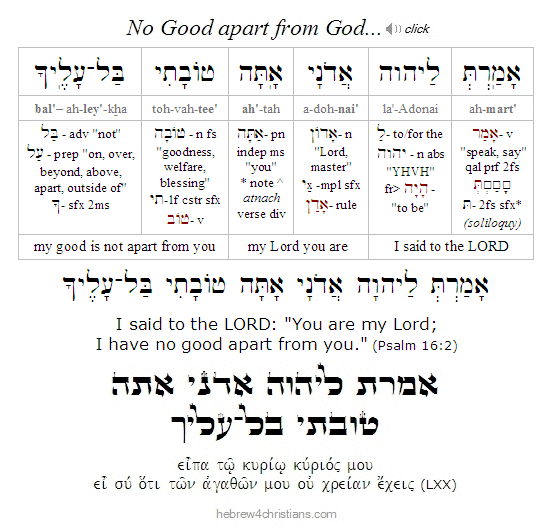 |
Quickening of His Love...
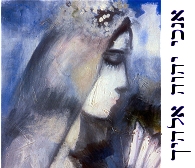
05.04.23 (Iyyar 13, 5783) As we move closer to the prophesied "End of Days" (i.e., acharit ha'yamim: אַחֲרִית הַיָּמִים), it is evident that the world has become more and more lawless, heartless, and a place of despair. Civil law is flouted and every person does "what is right in his own eyes." The storm clouds are gathering. Nonetheless the Spirit admonishes us: "There is no fear in love, but perfect love casts out fear" (1 John 4:18).
Fear and faith are antithetical, but if you're anything like me, you struggle with fear... The Greek New Testament says that "perfected love" (ἡ τελεία ἀγάπη) "casts out fear" since it is rooted in the idea of punishment (κόλασις). 1 John 4:18 goes on to say that the one who keeps fearing has not been brought to maturity with regard to love....
My fears often center on the future, for example, regarding the matters of providing for my family, being a good parent and husband, the health of my aged mother and father, etc. The prospect of the "End of Days" makes me more than a little concerned about the moral and spiritual condition of this country. I sometimes find myself anxiously thinking of my childrens' future. At other times I just find myself in a state of fear without any identifiable reason -- i.e., anxiety -- and then it's more difficult for me to discern the message of this state of soul.... Regardless, there is one thing we can (and must) do to secure ourselves in these perilous times, and that is to renew our faith and stand firm in our convictions. If you feel tempted to surrender to worldly despair, redouble your efforts to study the Scriptures and hold to the truth that sets you free. Study Torah and the Words of Yeshua our Savior!
Hebrew Lesson
Psalm 119:25 reading (click for audio)::
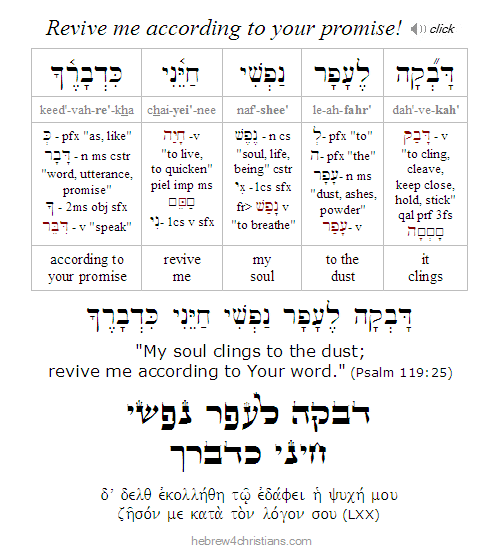 |
|



















































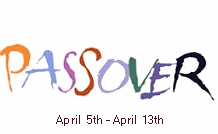

![Spring Holiday Timeline (H4C]](../../../../About_HFC/Site_News/Archive-2023/roshchodeshim-line.gif)

